60+ French Phrases for Travel You Need to Know [PLUS Printable]


Order your petit-déjeuner (breakfast) or buy your billets (tickets) to the Louvre all in French! Here are the most useful French phrases for travel you need to know.
Learning some French will offer you further insight into the French culture, mentality, and way of life. The ability to speak even un peu français (a little bit of French) and avoid making these French faux pas will enhance your travel experience and open the doors to unique connections with the locals.
France is the world’s top tourist destination, attracting more than 79,5 million visitors a year! That’s why French is the next language in my travel phrase guide series.
Not only that, but speaking French also comes in handy when travelling to Africa, Switzerland, Canada , Monaco, French Polynesia, the Seychelles amongst other places.
Why else should you learn French? Well, it makes learning other languages, especially Romance languages like Spanish , Italian , Portuguese and Romanian much easier.
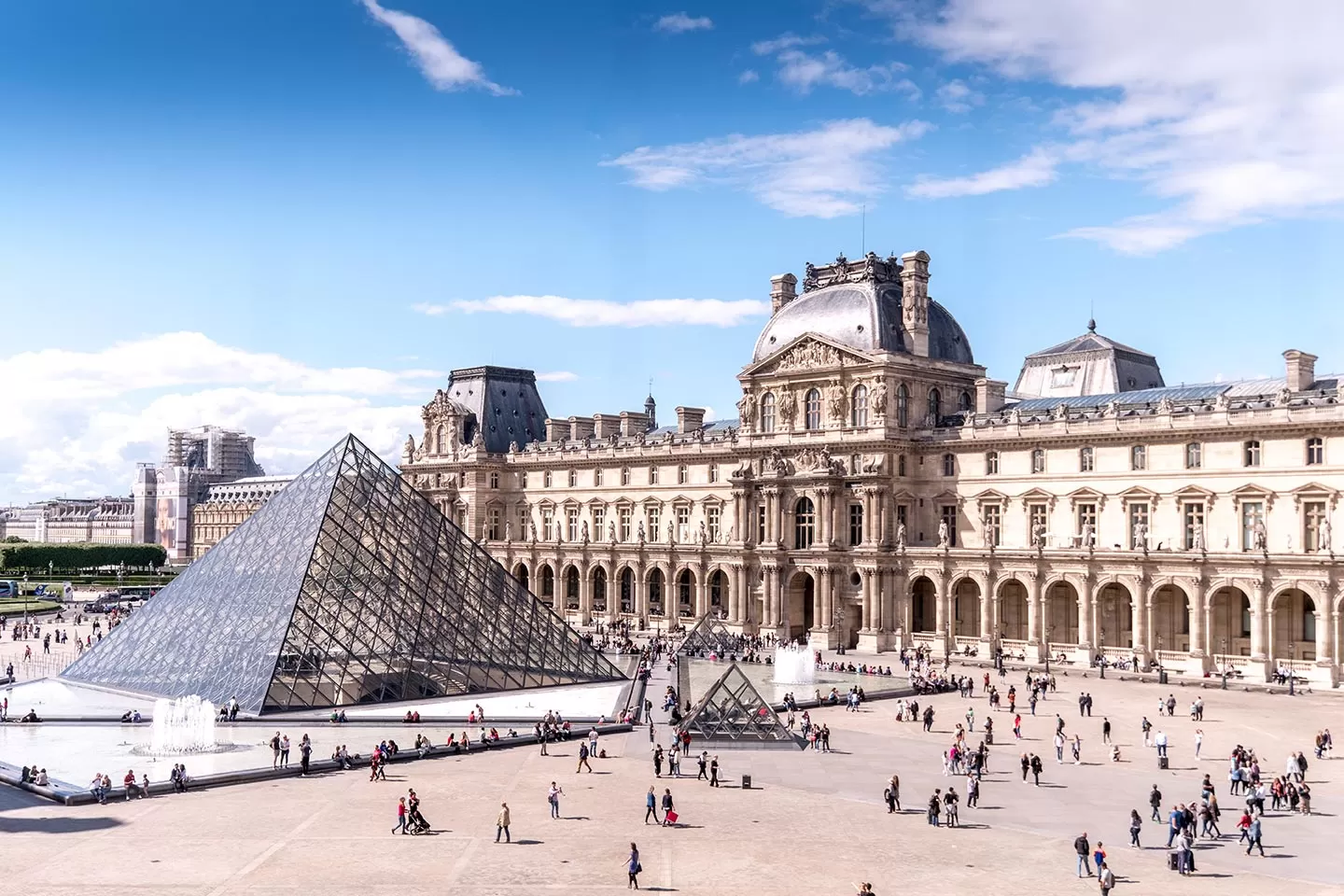
Want to have fun whilst learning French? Struggling to find decent French language resources? I recommend getting uTalk . Available as a desktop site and app, uTalk is awesome for learning key words and phrases in French especially if you want to use it for travel purposes. It’s great for beginners getting started in a language and invaluable for intermediates looking to fill in gaps in their vocabulary and pronunciation.
What I love most about uTalk is that you can jump around their extensive library of topics and choose what you want to learn, when you want, and at your own pace. Because I believe in uTalk so much, I reached out to them and we’ve teamed up to offer you an exclusive 30% OFF reader discount across all of uTalk’s 140 languages! This offer isn’t available anywhere else! Click here to claim your exclusive 30% discount.
Let’s take a quick look at the French language so you’re a bit more clued up on its origin, use, and vocabulary.
I hope you enjoy this post as much as I enjoyed bringing it together. If you have any requests for other languages, let me know in the comments section!
Where is French spoken?

That’s a lot of Bonjour -ing!
French is the third most spoken language in Europe, after German and English and has official-language status in 29 countries, including: Belgium , Benin, Burkina Faso, Burundi, Cameroon, Canada , Chad, the Ivory Coast, the Democratic Republic of the Congo, Djibouti, Equatorial Guinea, France , Haiti, Luxembourg, Madagascar, Mali, Monaco, Niger, Rwanda, Senegal, Seychelles, Switzerland , Togo and Vanuatu. French is even one of six official languages of the United Nations.
It seems like nearly everyone wants to learn French, it’s the only language, alongside English, that is taught in every country in the world!
And the best way to learn it? Well, France operates the biggest international network of cultural institutes, which run French-language courses close to a million learners. My two favourite ways to learn French is by attending language classes – so I’m not only held accountable but also for the social aspect – and going on language holiday too!
A Brief History of the French Language
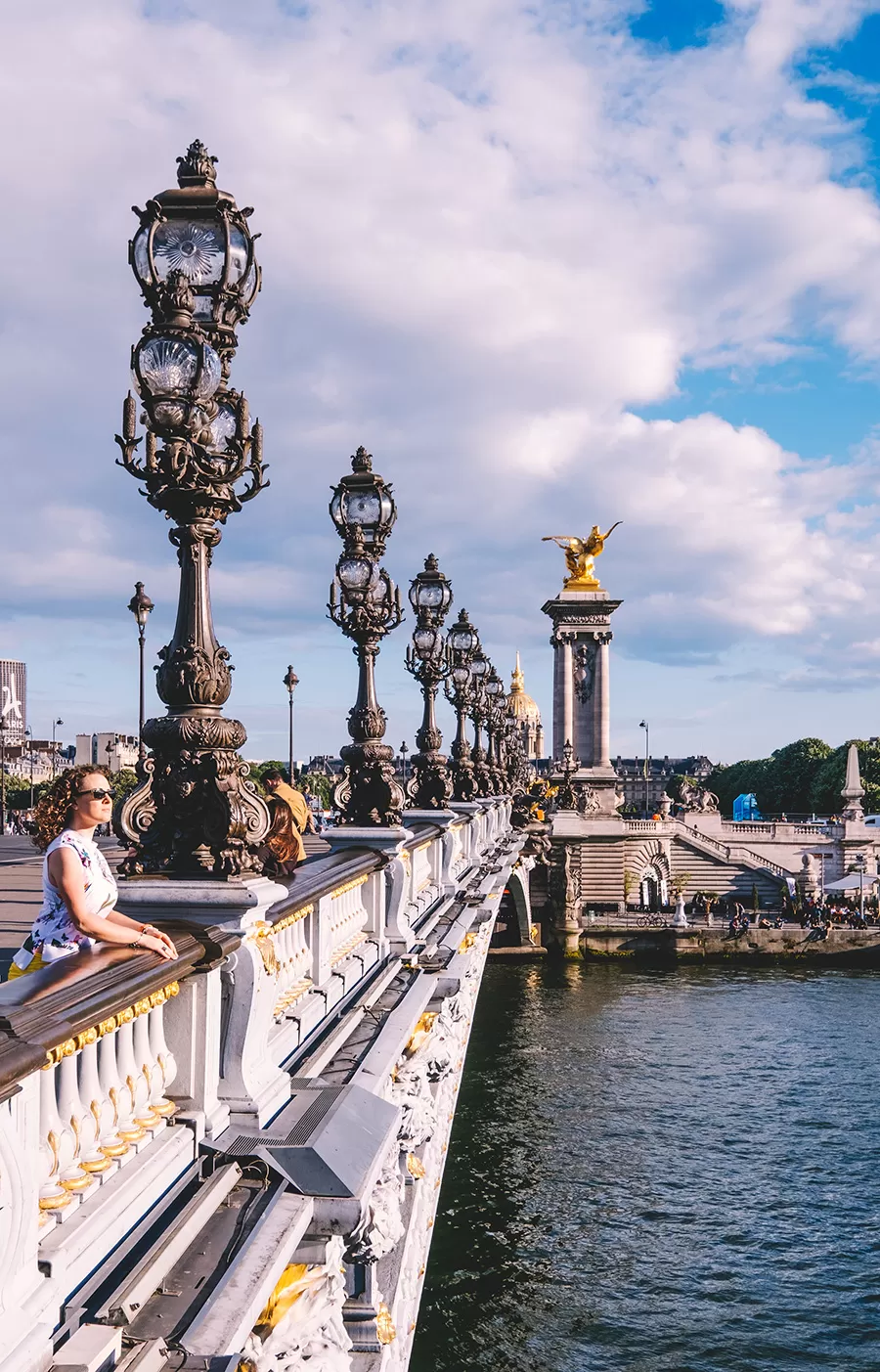
The French and English languages have a pretty mixed-up history. Following the Norman Conquest of 1066, Norman French was adopted as the language of power on the British Isles.
For the next 400 years, French was the language of the nobility and of most official documents. King Henry V put a stop to that when he went to war with France, but because the two languages existed in parallel for so long, the English language is peppered with words of French origin, many of which can be traced back to French roots. This means that you actually already know a lot of French, even if you don’t think you do.
Now for the tricky stuff!
French Pronunciation Tips

There is a total of 26 letters in the French alphabet. Standard French contains 13 oral vowels and up to 4 nasal vowels, but there are 5 additional accented letters that can be applied to change the sound of a letter.
Here are some helpful pronunciation tips:
Using Liaisons
One of the fundamental rules of pronouncing French (and many other Latin-based languages) is that everything has to flow. That’s one of the reasons why French sounds so beautiful.
If you’re speaking French correctly, everything should sound like a continuous melody.
That’s where liaisons come in.
Liaisons are a phonetic link between two words that may sound awkward if left unconnected.
Let’s take a look at some examples where they are used when speaking:
- After pronouns e.g. vous avez sounds like vooz-ah-vey not voo ah-vey
- Numbers and nouns e.g. deux amis sounds like derz-ah-mee not der ah-me
- One syllable prepositions e.g chez eux sounds like shez-uur not sheh uur
And liaisons that are forbidden when speaking:
- When using full names e.g.
- After et (and)
Liaisons may seem complicated at first, but they will become easier the more you listen to spoken French. After a while, you’ll automatically be able to notice where a liaison is needed (and where it isn’t) and how to make it sound natural when speaking.
What Not to Pronounce in French
Much like English, the French language isn’t written phonetically. The same sound can be represented by several different combinations of letters, and there are many cases of silent French letters. Two of the most well known are the silent “e” and the silent “h.”
The Silent “e”
The letter “e” is often silent in French, especially at the end of a word. Here are some examples:
Rue (road/street) is pronounced roo not roo-ee and inacceptable (unacceptable) is pronounced an-ah-sep-tah-bil not an-ah-sep-tah-ble
Of course, there are exceptions when it comes to masculine and feminine adjectives and nouns.
In the case of feminine adjectives and nouns, this typically means that the final consonant of the masculine form will now be pronounced. So, the masculine ouvert , meaning open in the masculine form and pronounced oo-ver , will become ouverte in the feminine form and pronounced oo-vert . The ‘ e ’ makes the final letter sounded.
The Final Consonant
As you’ve probably already noticed, there are a tonne of French letters that simply aren’t pronounced at the end of words. Don’t worry, you’ll get used to it!
In French, silent letters, or lettres muettes , have rules and exceptions just like many other linguistic concepts.
In general, the final consonants of a word are usually silent in French except in some cases of the letters c, f, l or r .
Just remember this simple rule, the consonants in the word ‘ careful ’ are always pronounced.
For example,
Avec (with) is pronounced ah-ve k
Cinq (five) is pronounced saan k
Hiver (winter) is pronounced ee-ve r
The general rule regarding French word endings is that when in doubt, you probably don’t pronounce it. But, French is full of exceptions!
The Infamous “r”
For many English speakers, the French “r” can be a source of frustration. To pronounce it, you’ll need to use your throat and imagine you’re trying to gargle. The French “r” is pronounced in the same place as the English “k”, but with your throat closed.
The Silent “h”
As you’ve probably noticed from every French speaker’s failed attempt to say the word “hamburger” in English, the “h” in French is a silent letter no matter where it’s located in a word.
The only exception to this is when the preceding letter is “c,” in which case the “ch” combination makes a “sh” sound or “k” sound.
Here are a few examples of the silent “h”:
Le haricot vert (French bean) is pronounced leh ah-ree-coh ver
Huit (eight) is pronounced weet
Hiver (winter) is pronounced ee-ver
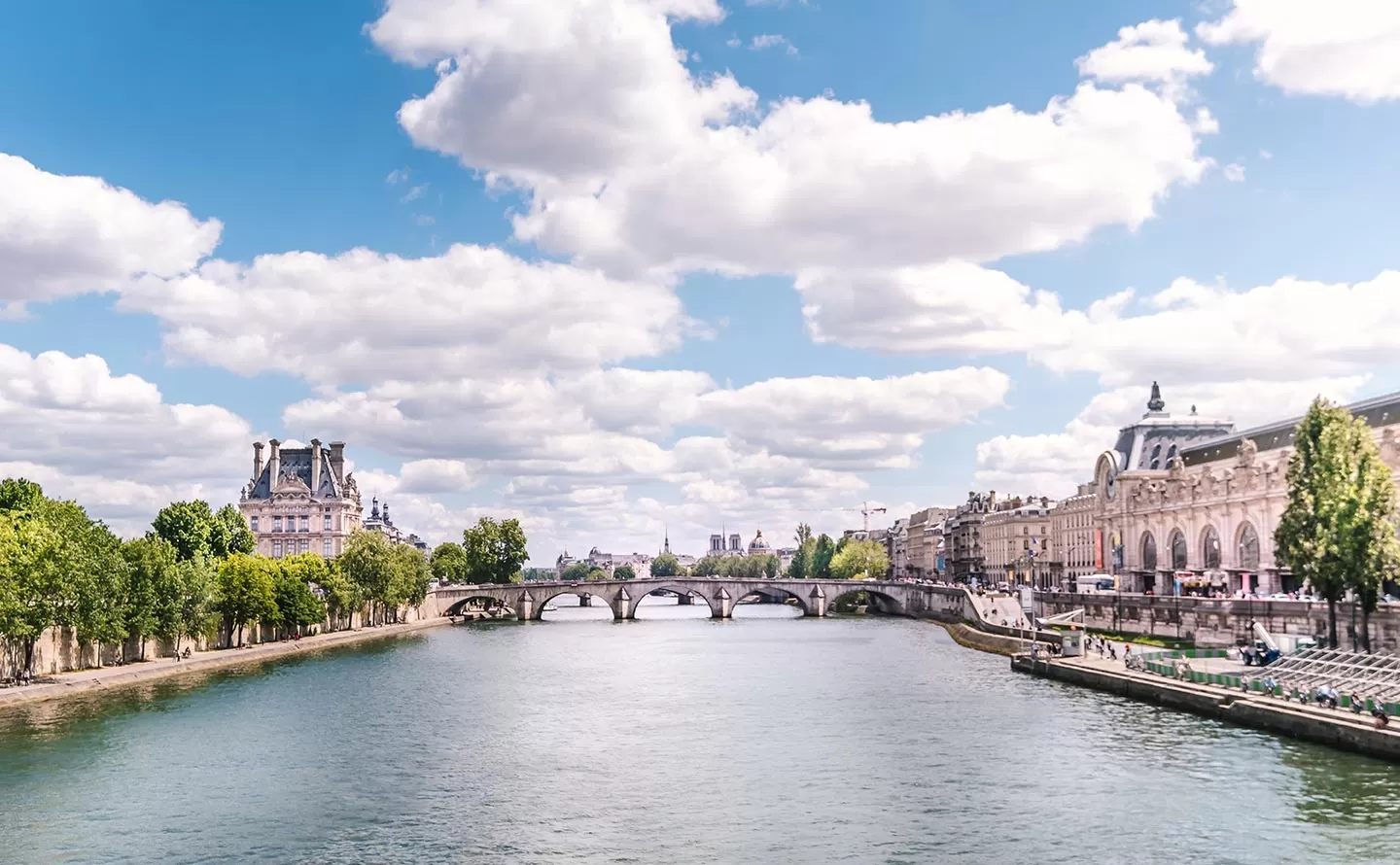
Admittedly there are a few finicky grammar rules to learn, but generally speaking, English grammar corresponds relatively closely to French grammar.
Consider words in English that end with – ible and -able , these are the same in French, only the pronunciation changes. So, the French word ‘possible’ sounds like poss-ee-bleh and ‘comfortable’ becomes kom-for-tah-bleh .
Then we have English words ending in -ent and -ant which also come from French and have the same spelling and the same meaning. So, the word, différent sounds like diff-er-ohnt and important sounds like ahm-poor-tahnt . The ‘t’ at the end is just slightly sounded.
Had enough? Ok, one more! Words in English ending in -ary l ike contrary become -aire in French. So, ‘contrary’ becomes contraire and sounds like kon-trair .
There are so many rules like this, so you can see just how easy learning French can be.
Here are top 10 French Italian Phrases for Travel You SHOULD Know [& How to Use Them]
Top french phrases for travellers.
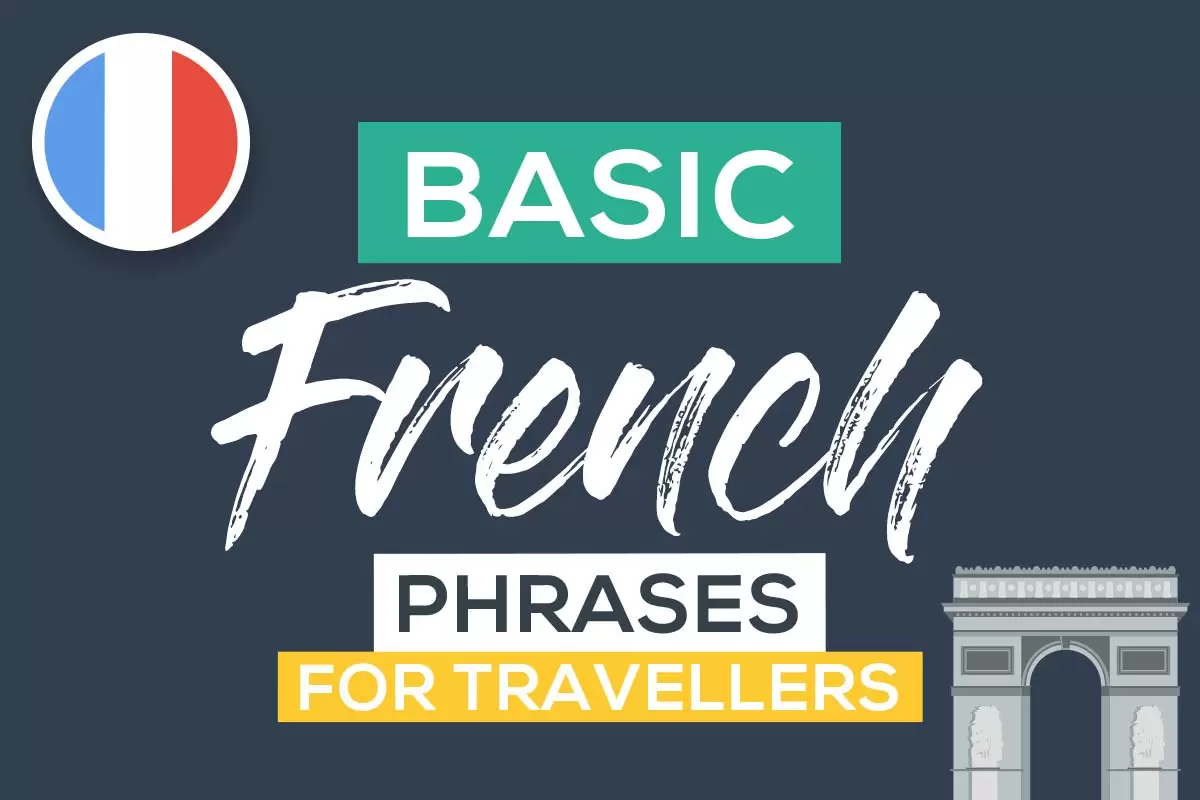
Want the infographic to take with you? Scroll to the bottom of the page.
Greetings Essentials Questions Eating Out Getting Around Numbers Days Emergencies
**There are a few places that use unique words for the numbers 70 ( septante ) and 90 ( nonante ), such as Belgium and Switzerland. With the numbers 80 to 89, combine the number 4, the number 20, and the ones.
For example, in French 80 is four 20s, 81 is four 20s plus 1, and so forth. (Unlike most French-speaking countries, Switzerland actually has a word for the number 80. It’s huitante .)
Want more? Learn French with me, with Intrepid French!
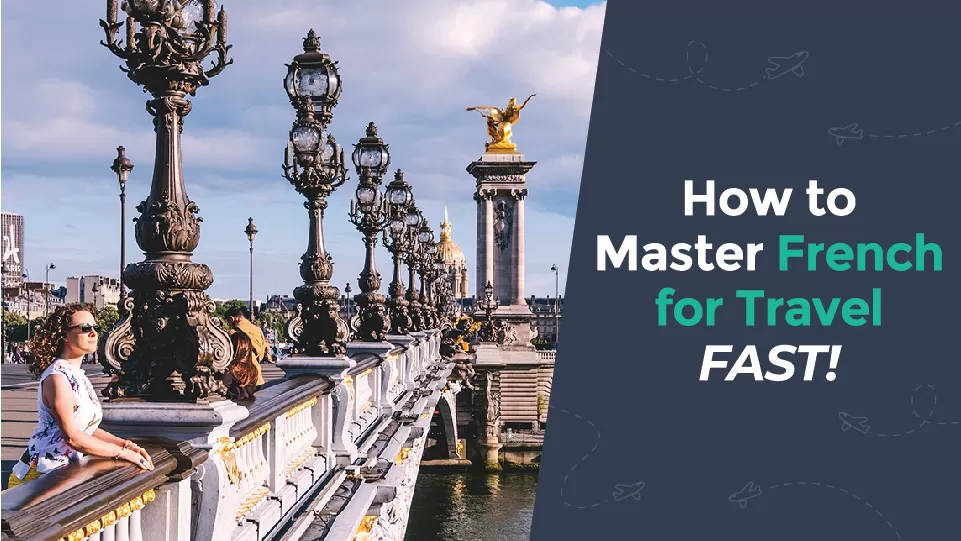
Travelling to France? Don’t be treated like a tourist! Live your best travel experiences and learn France for less than the cost of eating at a tourist trap restaurant or a taxi driver who has “taken you for a ride”. In addition to my free French travel phrase guide , I’ve made it even easier for you to master the French language so you can create lifelong memories as you mingle with locals , get local tips , avoid tourist traps , and make new friends . Join my popular French course here.
Here’s what my students are saying:

Loved it, loved it, loved it. I’ve been trying to learn languages using various language learning apps for years now and although I know random words I feel no more confident in actually speaking the language than I was when I started.” – Basil Pereira
Click here more details and get instant access!
Have a laugh with these funny French expressions
Like it? Pin or download this French travel phrase guide

Like it? Pin it for later!
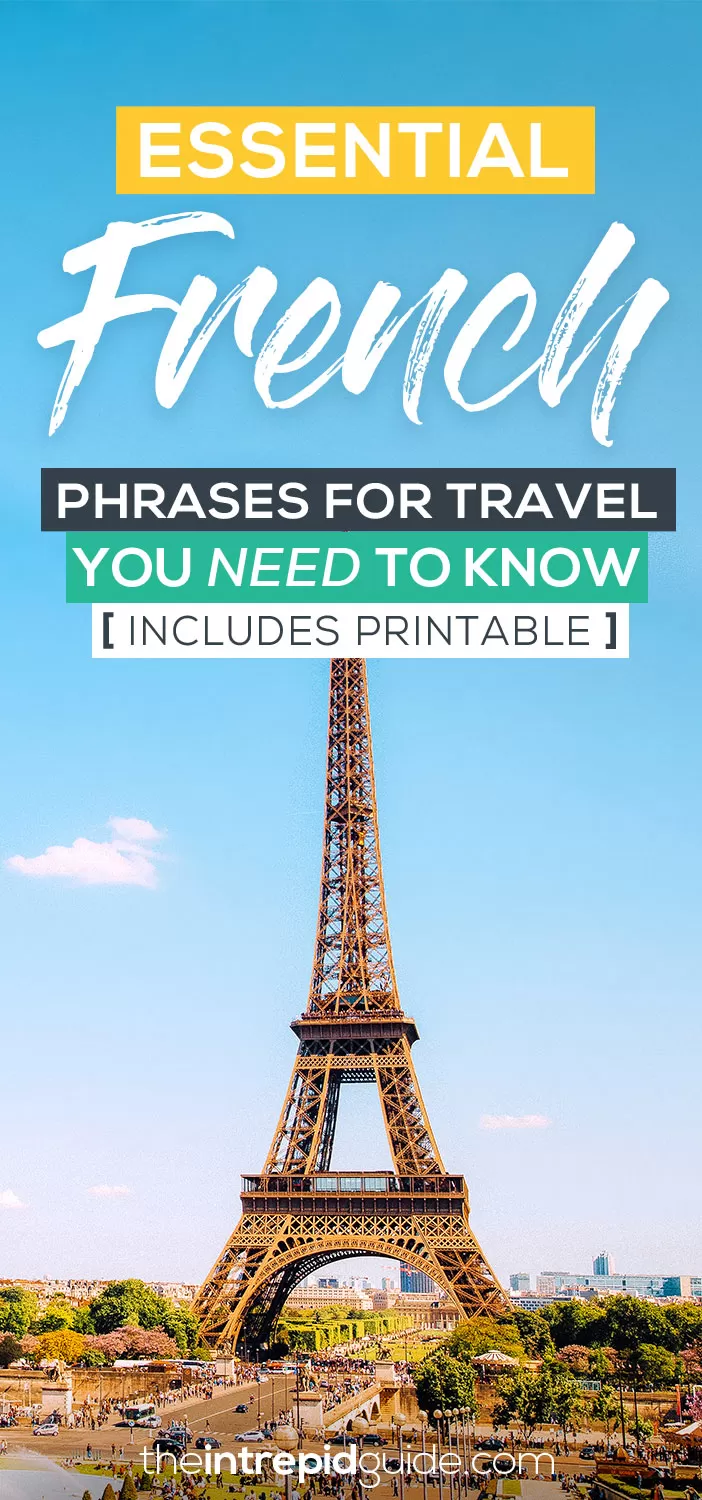
Learning French? Check out these French language guides
- Top 10 French Phrases You Should NEVER Say [& What to Use Instead]
- How to Sound More French: Top 10 French Phrases the French Love Saying
- How a ‘potato’ improved my French pronunciation
- 25 Funny French Idioms Translated Literally
- 22 Most Common French Grammar Mistakes [& How to Avoid Them]
Want to know more about learning languages? Start here!
- 6 Language Learning Tips: How to Learn a Language from Home
- What Type of Language Learner Are You? Your 4-Step Personalised Learning Plan
- 15 Top Language Learning Resources You Should Use
- 44 Best Movies on Disney Plus for Learning Languages
- 13 Ways to Seamlessly Integrate Language Learning into Your Daily Life
- 10 Pro Tips: How to Learn a Language with a Full-Time Job
- 7 Reasons Why You Should Go on a Language Holiday
- Essential Travel Phrases: How to be Travel Fluent in 10 Simple Steps
- 23 Cool Gift for Language Learners They Will Actually Use and Love
- How to Learn Your First Foreign Language in 8 Simple Steps: A Beginner’s Guide
- 11 Life-Changing Reasons Why You Should Learn a Language
- 42 beautiful Inspirational Quotes for Language Learners
- Language learning tips: 11 Polyglots Reveal The Secrets of Their Success
- Top 10 Best Ways to Learn a Language Better and Faster
- How Many Languages are there in the World?
Don’t miss my France Travel Guides
- How to Spend 4 Days in Paris: Ultimate First Timer’s Guide to Paris
- Where to Stay in Paris: A Fairytale Stay at Hotel Trianon Rive Gauche [Hotel Review]
- Where to Stay in Paris: A Decadent Stay at Hôtel Thérèse [Hotel Review]
Over to you!
Which of these French phrases are the most useful? What other languages would you like a travel phrase guide for? Have you been to a French-speaking country? Let me know using the comments section below or join me on social media to start a conversation.
Thanks for reading and I hope you enjoyed this post.
Like what you see? Subscribe using the form below to have all of my posts delivered directly to your email.
Success! Now check your email to confirm your subscription.
There was an error submitting your subscription. Please try again.
Get my best language and travel tips FREE by email...
Subscribe to my newsletter to receive detailed travel guides, exclusive travel and language learning tips, priority access to giveaways and more!
I will never give away, trade or sell your email address. You can unsubscribe at any time.
Michele creates language learning guides and courses for travel. What separates her from other instructors is her ability to explain complex grammar in a no-nonsense, straightforward manner using her unique 80/20 method. Get her free guide 9 reasons you’re not fluent…YET & how to fix it! Planning a trip? Learn the local language with her 80/20 method for less than the cost of eating at a tourist trap restaurant Start learning today!
Blond or Blonde: Why Does Grammatical Gender in English Still Exist?
How to sound more french: top 10 french phrases you should use.
This is great. I took years of French when in school, 40-years ago and now want to re-learn and be able to get by when traveling. Merci
Hi! (Sorry for the Failures, I don’t speak english very well because I am french) My Name is Salomé and I am from France. I felt random on your Website and I watched you tables and the picture called ” French travel Cheat sheet “. What you’re doing is awesome because you help people open us to the World. I am proud of what you do. I want to help because I am a native speaker of French not of all the French (Canada, Belgium..) but from France. Salomé
Hey Michele, love the article, love the guide. I think there are some mistakes on the French spelling and pronuciation for the word Right.
Right =droite drrrwa (with the funny r for the French). Apart from that, what a precious website!! Well done!
Hi Monique, thank you for correcting this typo, I’ve just fixed it now 🙂
Hey Michele
This is so cool. Thanks for sharing it. I was I Paris about a month ago and these would have come in very handy. Keep up the good work.
Merci Au revour
Thanks Basil, I’m so glad you enjoyed this post. I hope you’ll find it useful for future travels in Francophone countries 🙂
Leave a Comment Cancel Reply
Save my name, email, and website in this browser for the next time I comment.
This site uses Akismet to reduce spam. Learn how your comment data is processed .
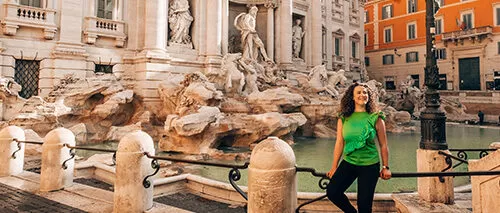
If you don't know where you are , how do you know where you're going? Find out how well you know Italian grammar today!
You are using an outdated browser. Please upgrade your browser or activate Google Chrome Frame to improve your experience.
108 French Travel Phrases for a Smooth Trip to France
Having essential French travel phrases on hand can totally transform your trip.
If you meet people, get lost or just need to ask a local some questions , these expressions and sayings will help you out in most tourist scenarios and make your time in France truly memorable!
In this post, I’ll introduce you to 108 basic French phrases for travelers, as well as tips and cultural context so they’re easier to memorize ahead of time.
Oui ! Non ! Common French Words and Phrases
Basic french phrases to introduce yourself, questions you’ll ask while traveling in france, french for travelers to get around town, what was that clarifying french phrases, basic french phrases for shopping, phrases for dining out in french, going hard(ish) in the club, how to prepare for traveling to france, and one more thing....
Download: This blog post is available as a convenient and portable PDF that you can take anywhere. Click here to get a copy. (Download)

Let’s start with the absolute basics.
Bonjour (Hello) Add a monsieur (sir) or madame (ma’am) to be polite.
Salut ! (Hi/Hey!) This is a more casual version of “hello.” You’ll hear the young folks throwing this one around.
Au revoir (Goodbye)
À plus / À plus tard ! (See you/See you later!)
À la prochaine ! (See you next time!)
Bisous / Bises ! (Kisses!) This is a casual way to say goodbye.
Bonsoir (Good evening)
Bonne journée ! ([Have a] good day!)
Bonne soirée ! ([Have a] good evening!)
Vous me manquez déjà ! (I miss you already!)
Pardon (Excuse me)
Merci (Thank you)
S’il vous plaît (Please)
Excusez-moi monsieur / madame (Excuse me sir/ma’am)
Parlez-vous anglais ? (Do you speak English?)
Comment dit-on … en français ? (How do you say … in French?)

These phrases will help you out when meeting locals and trying to make French-speaking friends.
Je m’appelle… (My name is…)
Moi, c’est… (Me, I’m…) This is a more casual way of introducing yourself.
Comment vous appelez-vous ? (What is your name?)
Tu t’appelles comment ? (What’s your name?) Use this one for when you want to keep things casual, with the tu form .
Comment allez-vous ? (How are you?)
Ça va ? En forme ? (How are you? You good?)
Nous sommes arrivés / arrivées… (We arrived…) Use this phrase to let someone know when you got into town.
Nous restons… (We’re staying…) Use this phrase to explain to your new friends where you’re staying, as well as how long you’re staying.
Je vous présente… (lit. “I present you…”) This is another way of saying “This is [my]…” when you want to introduce two people to each other.
Enchanté/Enchantée. (Pleased to meet you.)
Je suis ravi / ravie de faire votre connaissance. (I am glad/delighted to meet you.) You’ll raise some impressed eyebrows if you bust out this fancy French “nice to meet ya.”
Je parle un peu français. (I speak a little French.)
If you’re learning French, chances are you’ll want to practice your language skills when you go out there. However, it can be intimidating approaching a native—letting them know that you’re not fluent will really put your mind to rest!
Saying je parle un peu français will enable you to continue practicing your speaking skills, while at the same time alleviating any pressure you might feel to talk fluently . Use this phrase when you’re first starting a conversation, or want to continue talking to someone in French.
J’apprends le français depuis… (I’ve been learning French for…)
People are sure to notice your French accent and they’ll probably want to know how long you’ve been learning the language of love.
Je suis là pour les vacances / le travail. (I’m here for vacation/work.)
After you’ve made your initial introductions, it’s likely that a person with whom you’re speaking will ask about the time you’re spending in France. While many people travel to the country for vacation, this isn’t always the case, so informing the other person of your reasons for traveling can help fuel the conversation you have.
It’s likely that the other person will want to expand on the topic, so having a few words ready about your future itinerary or your job wouldn’t go amiss.
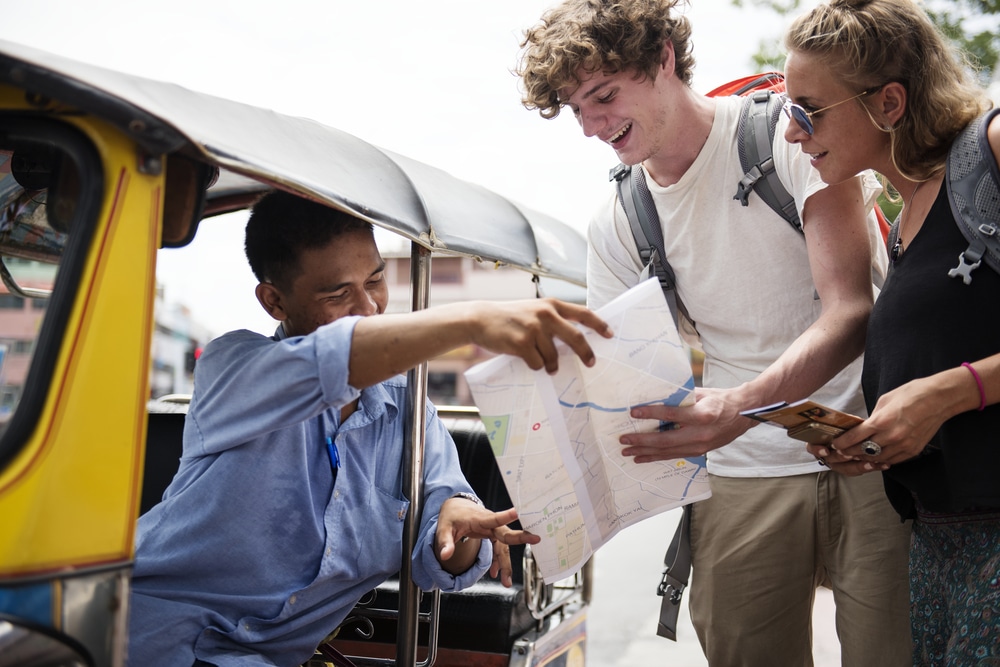
Où est… ? (Where is…?)
This is a phrase that you’ll need to use a lot in France, and it pays to memorize the names of a few places so you can get by if you’re stuck.
Here are some French phrases for travelers to build off of “où est.”
Où est…
l’hôtel ? (the hotel?)
la banque ? (the bank?)
l’aéroport ? (the airport?)
le guichet ? (the ticket window?)
la plage ? (the beach?)
Quel temps va-t-il faire aujourd’hui ? (What will the weather be like today?)
Don’t forget that much of the time, the weather in France is described using the verb faire .
Learning some French vocabulary for weather is a great idea before you venture out—being able to understand what sun and rain are in French will help you to listen out for all the right words.
Il fait beau aujourd’hui (It’s beautiful weather today)
Il pleut (It’s raining)
Il fait chaud (It’s hot)
Il fait froid (It’s cold)
Il fait soleil / Il y a du soleil (It’s sunny)
Il fait venteux / Il y a du vent (It’s windy)
Est-ce que vous pourriez prendre ma photo, s’il vous plaît ? (Could you take my photo, please?)
Everyone loves a souvenir, and it’s likely that you’ll take your camera along with you to capture precious memories. In touristy zones, natives are used to being asked to take photos, but if you’re going to do it, it’s especially nice to be able to inquire in French.
If there are a group of you, replace ma photo (my photo) with notre photo (our photo). And to be polite, start your request with excusez-moi monsieur/madame .
Addressing someone by the equivalent of “sir” or “madam” in French is generally expected, so if in doubt, err on the side of being over-polite—the person taking your photo is much more likely to accept your request!
Pouvez-vous m’appeler un taxi, s’il vous plaît ? (Can you call me a taxi, please ?)
Getting home in France when public transport has stopped running can be a real worry, and unless you’re right next to a taxi stand, it can be very difficult to find a cab. If you’re at a venue late, ask this question to one of the staff.
Staff are likely to have all the information about local transport and taxis and normally will be able to supply you with one in no time at all! As usual, address the person in the most polite way you can and thank them for their help.
Learning about other forms of transport will also help you to no end, especially when you’re searching for a way to get home.
Le bus (The bus)
Le train (The train)
Le bateau (The boat)
Le car (The coach)
La voiture (The car)
Pouvez-vous m’aider ? (Can you help me?)
In the unlikely scenario that you get into trouble when in France, it’s really important to have armed yourself with the right words to get out of a bind. Even just knowing this phrase is incredibly handy.
Of course, just because you need help doesn’t mean you’re in trouble—you might just need directions . The above phrase can be used in those scenarios, too, and is a great way to identify people who are able to speak French and who know their way around town.
Où est l’ambassade américaine ? (Where is the American Embassy?)
Again, travel French isn’t just about getting around, eating well and having fun. There are also French phrases to know in case of emergency.
If you run into trouble in France, one good address to have on hand is that of the American embassy . A stolen U.S. passport or ID card can be replaced at the embassy, and you might need their help if there is ever a political problem in France and you need to exit the country quickly.
That’s a rarity to be sure, but it’s better to be prepared while traveling!
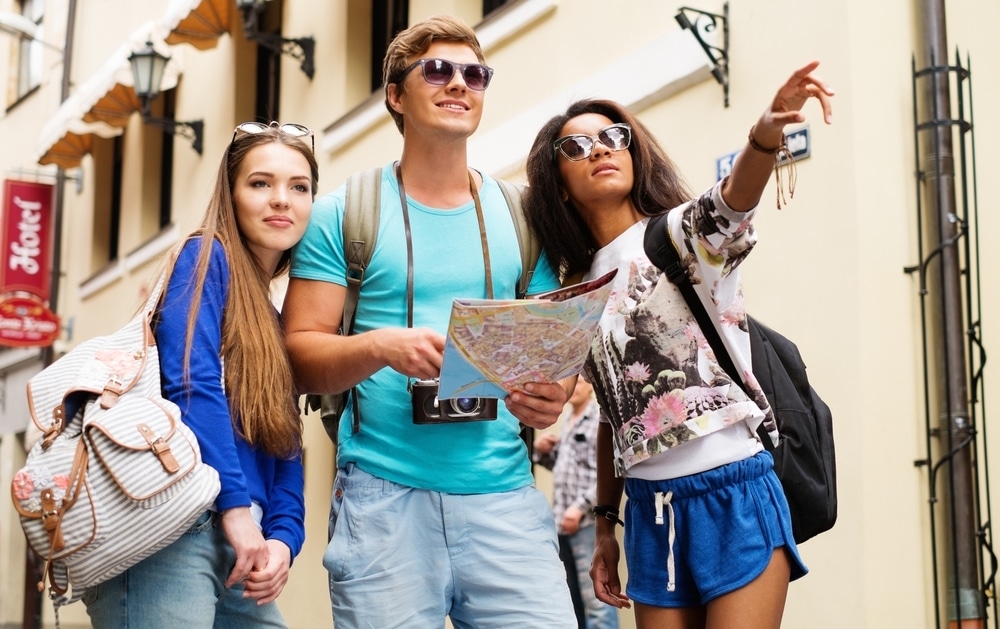
You’ll likely benefit from some further directional guidance while traveling around France. These phrases will come in handy.
Où est le métro ? (Where is the metro?)
Où sont les taxis ? (Where are the taxis?)
Où est la sortie ? (Where is the exit?)
C’est près d’ici ? (Is it close by?)
C’est loin ? (Is it far?)
Est-ce que ce bus passe par… (Does this bus pass by…)
Emmenez-moi à cette adresse, s’il vous plaît. (Take me to this address, please.)
Use this polite phrase with your taxi driver before you hand over that crumpled sticky note with François’ address on it.
Je vous dois combien ? (How much do I owe you?)
After your chauffeur de taxi (taxi driver) has so graciously driven you to François’ place, you’ll have to pay up.
Puis-je avoir un plan de la ville, s’il vous plaît ? (Can I have a map of the city, please?)
Use this phrase when you roll up to the office de tourisme (tourist office). You can also ask for a public transit map specifically:
Puis-je avoir un plan du métro, s’il vous plaît ? (Can I have a metro map, please?)
Je cherche… (I am looking for…)
Je cherche is another handy French travel phrase, especially if you’re traveling for the first time in a French city.
Unlike in English, where we say “I am looking for …” the French don’t use a preposition (“for”) after the verb, and simply follow this phrase with what they’re searching for.
Je cherche…
le bus (the bus)
un taxi (a taxi)
les toilettes (the toilets)
l’hôpital (the hospital)
Je ne comprends pas. (I don’t understand.)
A necessity if you’re trying to make conversation with a native, je ne comprends pas will serve you well if you ever get stuck.
Often, French people are so pleased to find a foreigner who’s able to speak their language that they’ll get a little carried away and enthusiastically try to start a complex conversation. While situations like these are incredible if you’re a learner, they can also be very intimidating.
Don’t worry if you don’t understand. Simply excuse yourself, say that you don’t understand and if you would like to continue the conversation, try the following French phrase:
Pouvez-vous répéter, s’il vous plaît ? (Could you repeat that, please?)
Parlez plus lentement, s’il vous plaît. (Speak a little slower, please.)
For French learners, the coveted native speed of speaking can seem unattainable, and while you can learn to understand it over time, it does take a little adjusting to. If you’re speaking to a local and would like them to speak a little more slowly, it’s better to just ask them, rather than suffering in silence.
Saying parlez plus lentement, s’il vous plaît will let your speaking partner realize they might be going a little too fast for you, but that you would still like to continue.
If you’d like them to go back over something they’ve been talking about, you can again ask them to repeat themselves to have them re-cover a topic that might have gone over your head.
Don’t worry about seeming rude—French people are often willing to help learners with their language skills, and will likely have no problem adjusting their speed.

If you’re traveling in France, you’ll probably be doing some shopping while you’re there!
Je suis à la recherche d’un… (I’m looking for a…) A great line for engaging the chipper shop girl, practicing your French and finding gifts for the folks back home.
Non, je regarde pour l’instant. (No, I’m [just] looking for the moment.)
C’est pour… (It’s for…)
Combien ça coûte ? (How much does this cost?)
Puis-je commander cela sur l’Internet ? (Can I order this on the internet?)
Je voudrais payer en liquide / espèces. (I would like to pay in cash.)
Est-ce que vous acceptez les cartes étrangères ? (Do you accept foreign cards?)
Be aware that paying for items when abroad may not work the same way as at home.
If you’re in a smaller town in France especially, it’s always worth checking with hotels or shop owners if they accept foreign modes of transaction. Asking est-ce que vous acceptez les cartes étrangères ? will ensure that you don’t find yourself in any sticky payment situations down the line.
If you’re from North America, asking acceptez-vous les cartes sans puce ? (do you accept non-chip cards?) might be more to the point. Many North American cards don’t have chip-and-pin security, and some stores in France don’t have magnetic strip readers.
Generally, most tourist destinations will be equipped to deal with foreign credit cards, but if you’re ever not sure, it always pays to double check!
À quelle heure est-ce que cela ferme ? (What time does it close?)
Across France, especially in the summer months, it’s worth checking out closing times. To ask when a shop or attraction is closing, use this question.
On the other hand, to inquire when a place will be opening, ask à quelle heure est-ce que cela ouvre ? (what time does it open?). Both of these phrases are really essential when traveling, so make sure you learn them ahead of time!
And remember, French time works a little differently and is often given on a 24-hour cycle, so if someone responds with dix-sept heures (literally, “17 hours”), they mean 5 p.m.
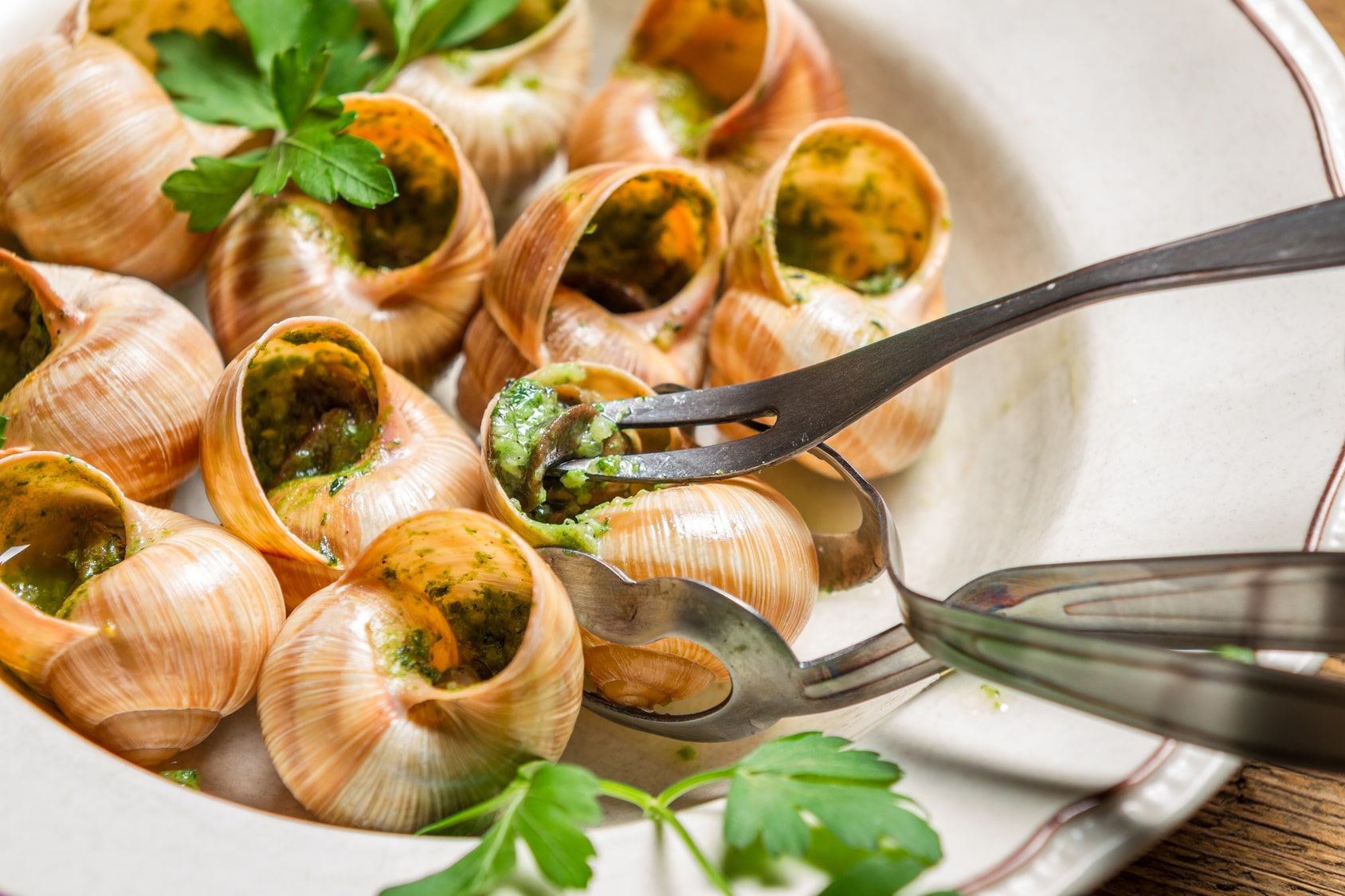
French cuisine is famous around the world, so what better place to try it than in its country of origin? These French phrases will help you make the most of dining in France.
Une table pour 4, s’il vous plaît. (A table for 4, please.
Le menu, s’il vous plaît. (The menu, please.)
La carte des vins, s’il vous plaît. (The wine menu, please.)
Est-ce que le service est compris ? (Is the tip included?)
C’est trop bon ! (This is so good!)
J’ai bien mangé. (I ate well/I’m full.)
Je suis répu / repue. (I’m satisfied/I’m full.) This one will really impress people. This is some real français soutenu (formal French) , and you’ll rarely hear a young French person say this.
On prend l’apéro ensemble ? (Let’s have an apéritif together?)
An apéritif is a beverage one drinks before eating—typically something alcoholic like whiskey, vodka or pastis , for example.
Je voudrais… (I would like…)
Je voudrais is likely to be a phrase that you’ll need to use very frequently—when ordering food , attending new places or just trying to buy something in a shop.
While most phrasebooks will contain the names of most foods and items that you would need to order, it’s worth remembering a few so that you don’t get stuck in a sticky situation! Here are a few you may want to commit to memory.
Je voudrais…
un café (a coffee)
une bière (a beer)
une baguette (a baguette)
de l’eau (some water)
l’addition (the bill)
À votre santé ! (To your health!)
Say this right before you clink glasses with your new French pals. Be sure to make eye contact while doing so .
You can also just say santé ! (health!). À la vôtre ! (to yours!) is also a good option when you’re with more than one person or having a tête-à-tête (one-on-one discussion) with a distinguished gentleperson.
À la tienne ! (to yours!) works for casual one-on-one scenarios. Tchin tchin ! (clink clink!) has the benefit of being pretty cute and onomatopoeic.
You’re sure to exude a certain je ne sais quoi (“I don’t know what”) as well as an ease with pronouns .

You’ve done the museums, the galleries, the restaurants, the cafés… time to party!
Ça te dit d’aller boire un verre ce soir ? (Want to go get a drink tonight?)
J’ai envie de faire la fête ! (I want to party!)
On s’installe là-bas ? (Let’s sit over there?)
Je voudrais une pinte de blonde / un verre de vin. (I would like a pint of light ale/glass of wine.)
On va prendre la bouteille. (We’ll take the bottle.)
On prend des shooters ! (We’re taking shots!)
Est-ce qu’il y a un after ? (Is there an after party?)
Je suis crevé / crevée, j’y vais. (I’m spent, I’m leaving.)
Rentrez-bien ! (Get home safely!) A good phrase to keep in your pocket when you’re leaving your party animal friends in the club.
Je me suis vraiment bien amusé / amusée. (I really enjoyed myself.) Did your new French pals take you on an exhilarating tour of the coins et recoins (nooks and crannies) of a charming neighborhood? Then let them know that you had fun!
Find a French phrasebook for travelers

Before you travel, you’re going to want to arm yourself with a few essentials, and at the top of your list should be a really great French phrasebook . Although I’ve just given you lots of helpful, common French travel phrases, it’s always good to be ready for any eventuality, and a phrasebook will act as a great backup.
One great phrasebooks for French learners are the “Collins French Phrasebook,” which contains a French dictionary for your convenience.

For more options, you’ll want to explore Lonely Planet to see what’s available. There are French phrasebooks for every corner of the French-speaking world, and some have additional features like accompanying audio files, travel guides or apps.
Research local customs
Wherever you go in France, you’ll find a whole host of things that make the area unique. Whether it’s local French cooking , events or linguistic differences, it pays to research the place you’re going and, if necessary, learn a few basic French phrases relating to whatever may be going on around you.

In Paris, for example, some museums and galleries are free to all on the first Sunday of the month—a deal worth taking full advantage of! If you want to check out the region to which you’re traveling, France.fr is a great place to do so.
And of course, your French phrasebooks or regional travel guides can offer you insight into customs, culture, etiquette and holidays.
Make a list of activities
Just getting to France may seem like a dream come true, but unless you have some idea of how you want to spend your time, it can pass you by in a haze.
Before you leave for your trip, try making a list of things you’d like to do. This way, you can adjust the phrases you learn accordingly and be ready to ask about certain exhibitions in the area or how to find a place to eat that serves a certain local dish you’d like to try.
Spontaneity is wonderful, but a little planning doesn’t hurt, either!
Use an immersion program
You can get used to hearing the French language before you leave your house with immersion programs. Using an immersion program at home is a good way to get used to the sounds and natural speed of the language. It’s also a way to hear turns of phrases , filler words and slang —basically, parts of the language that are rarely taught in textbooks. Learn these, and your French will sound much more natural.
Learn polite French terms of address
The French take manners very seriously, and if you’re meeting someone for the first time, or talking to a stranger, it’s important that you address them in the right way.
If you’re trying to attract the attention of someone who might be able to help you, say either “hello sir/madam” or “excuse me sir/madam” in French, as given above. Similarly, when you enter a shop, it’s always nice to greet the shopkeeper by saying hello or good morning, also as you learned above.

You can get a head start on polite conversation for practical, everyday matters with ed2go’s Beginning Conversational French course. This is a short online course that prepares you for communication in places like restaurants, hotels and other typical scenarios you may encounter on your travels.
There are also different terms of address in French, and depending on how well you know someone, you’ll have to address them in a certain way. For people you know, you can say tu (you) when talking to them. This can also be used for children and animals.
For strangers, figures of authority or your elders, you must use vous (you). This is a much more polite term of address, and expected when you haven’t gotten to know someone well yet.
If you’re struggling to know which one to use, always veer on the side of caution and use vous. The other person will tell you if they want you to say tu to them instead!
FluentU takes authentic videos—like music videos, movie trailers, news and inspiring talks—and turns them into personalized language learning lessons.
You can try FluentU for free for 2 weeks. Check out the website or download the iOS app or Android app.
P.S. Click here to take advantage of our current sale! (Expires at the end of this month.)

Try FluentU for FREE!
Traveling to France is a thrilling and eye-opening experience.
In order to get the most out of the trip, it’s a great idea for tourists and travelers to learn some basic French phrases and words ahead of time.
These French travel phrases will have your back throughout your trip!
FluentU has a wide variety of great content, like interviews, documentary excerpts and web series, as you can see here:

FluentU brings native French videos with reach. With interactive captions, you can tap on any word to see an image, definition and useful examples.

For example, if you tap on the word "crois," you'll see this:

Practice and reinforce all the vocabulary you've learned in a given video with learn mode. Swipe left or right to see more examples for the word you’re learning, and play the mini-games found in our dynamic flashcards, like "fill in the blank."

All throughout, FluentU tracks the vocabulary that you’re learning and uses this information to give you a totally personalized experience. It gives you extra practice with difficult words—and reminds you when it’s time to review what you’ve learned.
Start using the FluentU website on your computer or tablet or, better yet, download the FluentU app from the iTunes or Google Play store. Click here to take advantage of our current sale! (Expires at the end of this month.)
Enter your e-mail address to get your free PDF!
We hate SPAM and promise to keep your email address safe

- Search Please fill out this field.
- Manage Your Subscription
- Give a Gift Subscription
- Sweepstakes
- Travel Tips
Basic French Words, Phrases, and Sayings Every Traveler Should Know
These are the basic French words, phrases, and slang to know for your next trip to France.
Anyone who has spent even the shortest amount of time in France — particularly in Paris — knows the importance of being able to speak a little français, so we've rounded up some common French phrases, words, and even French slang you should learn before your next trip — whether it's in six months or six years.
Locals will quickly warm to travelers who at least make an effort to speak their language. Whether it's saying "bonjour" when you enter a shop or ordering politely in a café, the French will take note of your courtesy. Any useful French words, sayings, or phrases you can commit to memory will help you navigate the country, interact with residents, and make the most of your trip.
And, as a rule, remember that it's always safer to use the "vous," or formal version, of French, unless you're speaking to a child. Here are the basic French words and phrases to learn before you visit France.
Basic French Words
Hello: Bonjour
Goodbye: Au revoir
Goodnight: Bonne soirée, or bonne nuit
Please: S'il vous plaît (formal), s'il te plaît (informal)
Thank you: Merci
You're welcome: De rien
Beautiful: Beau (masculine), belle (feminine)
Common French Phrases
How are you?: Comment allez-vous? (formal), Comment vas-tu? (informal)
I am well, and you?: Je vais bien, et vous?
What is your name?: Comment vous appelez-vous? (formal), Comment tu t'appelles? (informal)
My name is...: Je m'appelle...
I love you: Je vous aime (formal), Je t'aime (informal)
I miss you: Vous me manquez (formal), Tu me manques (informal)
Excuse me: Pardon
I don't know: Je ne sais pas
I don't understand: Je ne comprends pas
Basic French Phrases for Travelers
Do you speak English: Parlez-vous anglais?
I'm lost: Je suis perdu(e), adding an e if you identify as female.
I'm sorry: Je suis désolé(e)
Where is...: Où est... (For example, "Where is the Louvre?" translates to "Où est le musée du Louvre ?")
Where is the bathroom?: Où sont les toilettes?
How much is...: Combien coûte... (For example, "Combien coûte cette robe?" means "How much is this dress?")
I would like...: Je voudrais...
A beer: Une bière
A glass of wine: Un verre de vin
A coffee: Un café
Common French Sayings and French Slang
Hello: Salut (informal)
I love Paris: J'adore Paris
Have a nice trip: Bon voyage
Forget it or drop it: Laisse tomber
Come on or let's go: Allez
That's life: C'est la vie
Long live the Republic and long live France!: Vive la république et vive la France!
French food is the best in the world: La cuisine française est la meilleure du monde
Unconventional language hacking tips from Benny the Irish polyglot; travelling the world to learn languages to fluency and beyond!
Looking for something? Use the search field below.
Home » Articles » 60+ Essential French Phrases for Beginners to Start Speaking Now
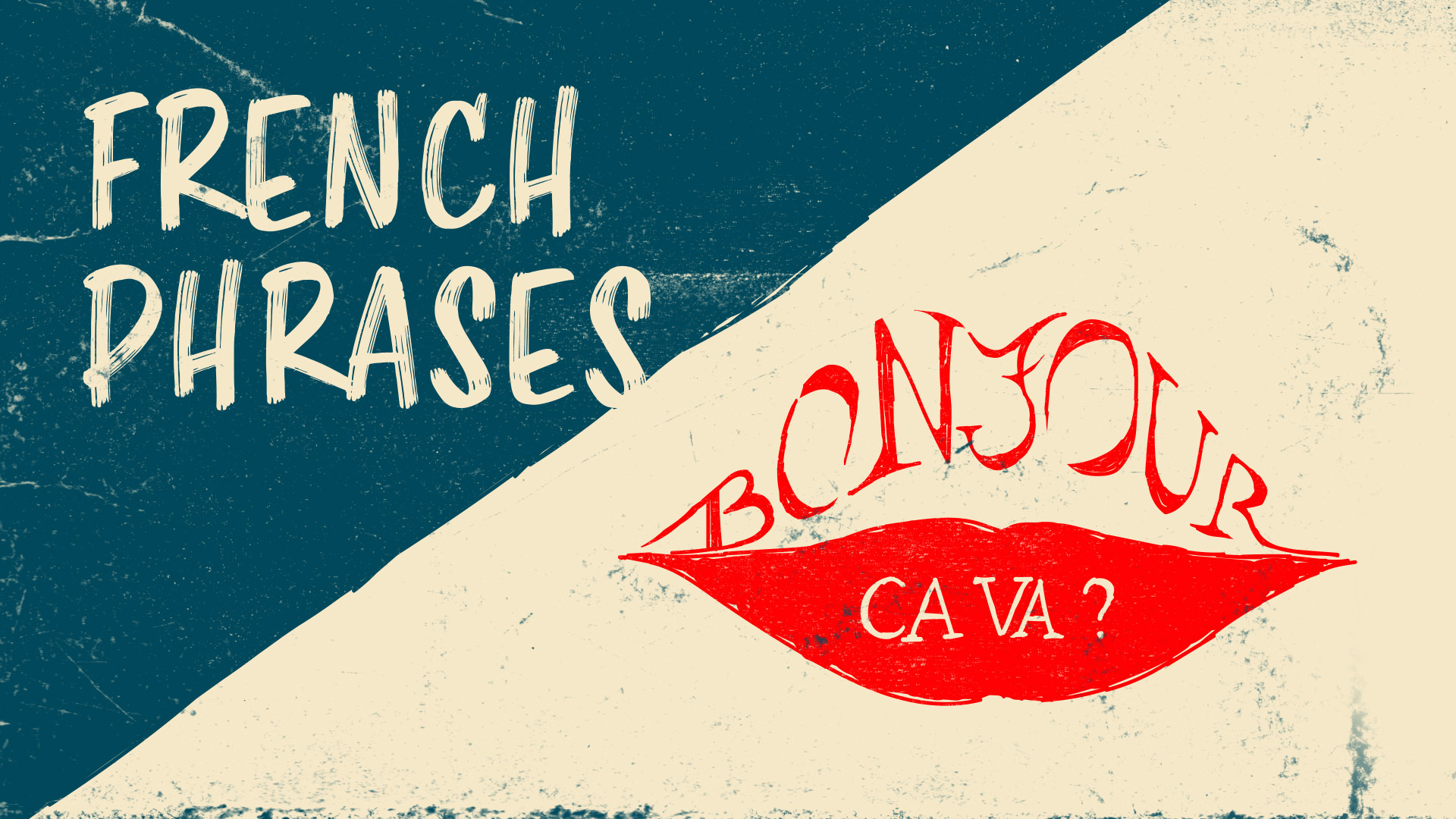
Full disclosure: This post contains affiliate links. ?
written by Benny Lewis
Language: French
Reading time: 17 minutes
Published: Jan 11, 2021
Updated: Sep 17, 2021
60+ Essential French Phrases for Beginners to Start Speaking Now
What are some French sayings? What are the most common phrases in French? And can learning a few powerful French phrases really help you start speaking right away?
Absolutely!
Even if you'll only be spending a short time in the country, learning a few basic French phrases can be very rewarding and make a big difference to your trip.
Let’s start by mastering some of the most common French phrases you need to know as a beginner:
I've long advocated that set phrases are the best thing for beginners to learn when starting out.
After all, isn't the goal of language learning to communicate?
How do you expect to communicate with anybody if the only thing you've learned so far is a verb table?
So whether you're planning to travel to Paris for a week or move to Saint-Louis-du-Ha! Ha! for the rest of your life, here are the most important and useful French phrases that you should learn A.S.A.P.
Listen to the French Phrases:
Here's a quick “French phrases” video I made that will help you with pronunciation for most of the phrases in this article:
Before we get started, if you’re looking for an online French course, here’s the course I recommend: French Uncovered – Learn French Through the Power of Story, a course with a fascinating new method by my friend Olly.
French Greetings and Polite Phrases
Bonjour – “hello”.
There are many ways in French to say “hello” , but bonjour is undoubtedly the most well-known. It's universally polite and friendly, whether the situation is formal or informal.
Bonjour is a combination of the words bon (“good”) and jour (“day”).
In the evening, you could also say bonsoir (“good evening”). A more casual way to greet people is salut , which can mean either “hi!” or “bye!”.
S'il vous plaît / s'il te plaît – “Please”
As a tourist, the last thing you want to be is rude. So when in France, remember what your mother taught you, and say s'il vous plaît (“please”) when making a request.
You can also say s'il te plaît. What's the difference? It's all about “you”:
In French there are two ways of saying “you”.
Tu is what you'd use when addressing a friend. Vous is a more polite and formal version, best used when talking to a stranger or older person.
( Vous is also what you should use when addressing a group of people in any situation, similar to saying “you guys” or “you all” in English).
So s'il vous plaît and s'il te plaît both mean “please” (literally, “if it pleases you”), but s'il vous plait is the more polite version. If in doubt, use s'il vous plaît .
(Why is it s'il te plait and not s'il tu plait ? It's a grammatical thing that you don't need to worry about as a beginner. Just learn the phrase as a whole for now, and things will become clear later.)
In fact, when asking for something in French – e.g. asking a stranger for directions or asking to see a menu in a restaurant, you should start with “ Bonjour. S'il vous plaît… ” It literally means “Hello, please…”, which would sound a bit strange in English, but it's the normal way to start a polite request in French.
Comment vous appelez-vous? / Comment t'appelles-tu? – “What’s your name?”
When meeting anyone, one of the first things you'll want to know is their name.
In French, you can find it out by asking “ Comment vous appelez-vous? ” (formal) or “ Comment t'appelles-tu? ” (informal).
Literally, these questions mean “what do you call yourself?”. You could also ask “ c'est quoi ton nom? ” – which is a more literal translation of “what's your name?”
If you're on the receiving end of this question, answer with “ Je m'appelle… ” (“my name is”, literally “I call myself”) or a simple “ Je suis… ” (“I am…”).
Oui/Non/Si – “Yes/No”
Two essential words to learn in any language are “yes” and “no”. In French, “yes” is oui and “no” is non .
Informally, it's also common to say ouais or ouaip instead of oui – like saying “yeah” or “yep” in English.
Then you have si . This is a handy little word that has no direct equivalent in English. Use it to say “yes” when someone asks you a negatively phrased question.
To illustrate what I mean, imagine that someone asks you, in English, “haven't you been to Paris?”
If you reply “yes”, it's not exactly clear what you're saying. Do you mean “yes, I have been to Paris – contrary to your assertion” or “yes, you're correct: I haven't been to Paris”?
French avoids this confusion with the word si . It means “yes”, but more specifically it contradicts the assertion in the question. In the above example, if you say si , it clearly conveys that you have, in fact, been to Paris.
Si is one of many linguistic features that I sorely miss when I speak English.
Comment allez-vous? – “How are you?”
This is the polite way of saying “how are you?” in French. Note the use of the polite vous rather than the informal tu .
Another, more informal way to say “how are you?” is ça va ? This phrase is extremely common – when in France you'll likely hear it several times per day.
If someone asks you “ ça va? ”, you can respond with a simple “ ça va bien ” – “it's going well”.
Excusez-moi – “Excuse me”
To get someone's attention, whether they're a waiter in a restaurant or a stranger on the street, say “ excusez-moi ”, “excuse me”.
This is also the polite way to ask someone to get out of your way. For example, if you're trying to exit a crowded train, a soft “ excusez-moi ” should (hopefully) be enough to make people step aside.
Pardon – “Sorry”
Picture getting off a crowded train, being careful you don't bump into anyone as you walk through the crowded metro station. But if a collision does occur, it's fine. Just say pardon , “sorry”, and all will be forgiven.
“ Pardon? ” is also how you'd ask someone to repeat themselves if you didn't hear or understand what they said. In this case, you should say it with a rising tone to indicate that it's a question.
Another way to say this is “ pourriez-vous répéter, s’il vous plaît ?” – “Could you repeat, please?”
Merci beaucoup – “Thanks a lot”
And of course, don't forget to say thank you!
The French word for “thank you” is merci . Or you can make it stronger by saying merci beaucoup – “thanks very much”.
Use merci in all the same situations you'd say “thank you” in English.
Other Must-Know French Greetings and Polite Phrases:
- Nice to meet you – Enchanté
- How’s it going? – Comment ça va?
- And you? – Et toi?
- Are you well? – Vous allez bien?
- What’s new? / What’s up? – Quoi de neuf?
- Good, thanks! – Bien, merci!
- So-so / It’s okay – Comme ci, comme ça (Literally: “like this, like that”)
- Same as always – Comme d’hab
- It could be worse – Ça pourrait être pire
- You’re welcome – Je t'en prie
- Don’t mention it / You’re welcome – De rien
- Goodbye – Au revoir
- See you soon – À bientôt!
French Phrases for Maintaining a Conversation
Je voudrais parler français – “i would like to speak french”.
The French are famously protective of their language. Sometimes they can be a bit impatient with us anglophones, and reply in English to your imperfect French questions.
It's frustrating when this happens, but if you ever want to make progress in a foreign language, you absolutely must stop speaking English !
Be polite but firm when someone tries to speak English with you – tell them “ Je voudrais parler français ” – “I'd like to speak French.”
Note that, unlike in English, names of languages are not written with a capital letter in French.
Je ne comprends pas – “I don’t understand”
Sometimes pardon doesn't quite cut it. If you really can't figure out what the other person is saying, try telling them “ je ne comprends pas ” – “I don't understand.”
There's no shame in being a beginner! Just remember not to fall back to English when the going gets tough. If you don't understand something, persevere in French anyway – it's the only way you'll learn.
Que veut dire ça? – “What does that mean?”
Maybe the reason you didn't understand is because there was a specific word you didn't recognise. If that's the case, say “ que veut dire X? ” – “What does X mean?”
You can also phrase this as “ ça veut dire quoi? ” – “What does that mean?”
Plus lentement – “More slowly”
Sometimes, vocabulary isn’t the problem. You’d know the words if you could make them out, but you can't because the other person is talking too fast!
In this case, try saying plus lentement – “more slowly”.
Better yet, say a full sentence: “ Pourriez-vous parler plus lentement, s’il vous plaît? ” – “Can you speak more slowly, please?”
Comment dit-on __ en français? – “How do you say __ in French?”
What if you need to say something in French, but the exact word escapes you?
Just fill in the blank in the above sentence: “ Comment dit-on X en français? ” means “How do you say X in French”?
A side note: the pronoun on , seen above, is an interesting one. It’s a colloquial alternative to nous (“we”). However, on is also used to refer to an unspecified person or people in general, like the word “one” is sometimes used in formal English. (If you speak German, note that on in this sense is like the German word man .)
One doesn't use the word “one” very much in modern English – one finds it rather old-timey and stuffy. These days you normally use “you” when you're talking about people in general.
Comment ça s'écrit? – “How do you spell that?”
If you learn a new French word using the phrase above, you might want to write it down before you forget it.
Unfortunately, French spelling isn't the easiest.
The relationship between spelling and French pronunciation can be complicated. Generally, it's easier to figure out a word's pronunciation from its spelling than it is to know its spelling from its pronunciation. I wrote a guide to help you with French pronunciation here .
So if you're not sure, ask someone “ comment ça s'ecrit? ” – “How do you spell that?” Literally: “How does that write itself?”
Or if you don't trust your own transcription abilities, try asking them to write it for you: say “ Est-ce que vous pouvez l'écrire? ” – “Can you write it (down)?”
Other Helpful Phrases for Maintaining a French Conversation:
- Can you speak more slowly please? – Pouvez-vous parler plus lentement s'il vous plaît?
- Can you say it one more time? – Pouvez-vous le dire une fois de plus?
- Do you speak French? – Parlez-vous français?
- Do you understand? – Comprenez vous?
- What do you do for a living? – Qu’est-ce que tu fais dans la vie?
- How old are you? – Quel âge as-tu?
- I’m _ years old – J’ai _ ans
- Where are you from? – D'où êtes-vous?
- I’m from… – Je viens…
- Are you married? – Es-tu marié?
- Are you single? – Es-tu célibataire?
- When can we meet? – Quand pouvons-nous nous rencontrer?
- What’s your phone number? – Quel est ton numéro de téléphone?
French Phrases for Getting Around
Où est… – “where is…”.
Struggling to find your way around? Not to worry. Just get a stranger's attention (remember what phrase would you use to do this?) and ask “ où est X ” – “Where is X?”
“X” could be many things: la Tour Eiffel, le Louvre, Notre Dame … or perhaps something less exotic, like le metro or un restaurant .
Où se trouve la station de métro la plus proche? – “Where is the closest metro station?”
Another way of saying “where is it?” is où se trouve , literally “where is (it) found”.
Here's an example of où se trouve combined with another handy phrase to know: la station de métro la plus proche means “the closest metro station”.
One more piece of useful vocabulary: once you're in the metro station, you might want to ask someone “ où est le guichet? ” – “Where is the ticket window?”
Je voudrais acheter un billet – “I would like to buy a ticket”
Now that you've found the guichet , you probably want to buy a billet – a ticket. But what type of ticket do you want?
- un billet aller simple – a one-way ticket
- un billet aller retour – a round-trip ticket
Make your decision, and tell the assistant “ je voudrais un billet aller simple/retour pour X ” – “I would like to buy a one-way/round-trip ticket to X”, where X is your destination.
C'est combien? – “How much is it?”
France isn't the cheapest of countries – so whether you're at the guichet or elsewhere, it doesn't hurt to be price-conscious.
To ask how much something costs, say “ c'est combien? ” – “how much is it?” You can also say “ Combien ça coûte? ” – literally, “how much does it cost?”
Où sont les toilettes? – “Where are the toilets?”
It's worth learning this phrase, because you might need it in a hurry! Où sont les toilettes means “where are the toilets?”
Although if you want to use a public toilet, you could be searching for a long time.
They aren't very common in France – and if you do find one, you'll probably have to pay to use it. You're probably better off buying something in a café and using their toilets instead.
(Why is it “ où sont “, when previously we used “ où est “? Easy: sont means “are” while est means “is”. Since toilettes is plural, you must use sont , not est – “where are the toilets?”, rather than “where is the toilets”, which wouldn’t make sense.)
À quelle heure est-ce qu’il faut régler la note? – “What time is check out?”
If you're checking into a hotel in a French-speaking country, one useful thing to know the checkout time.
One way to find this out is to ask “ à quelle heure est-ce qu’il faut régler la note? ” – “What time must we check out?”
Another similar expression is: “ quelle est l'heure limite d'occupation? ” (Lit: “What is the occupancy cut-off time?”
La carte/le menu, s’il vous plaît. – “The menu, please.”
France is famous for its food, so while you're there, you'll probably want to dine in a restaurant or two!
When dining out in any language, there are usually a few subtleties around how to order. Here I'll explain one of the more important things to know in French: the words for “menu”.
I say “words” because there are two main ways to say “menu” in French.
The general word is carte , which you may recognise from the expression à la carte .
A carte is what you typically think of when you hear the word “menu”. It's a list of individually-priced options; you pick and choose what you want, then add up the prices to get your total bill.
But you can also ask for a menu , which is usually called a “fixed-price menu” in English. When ordering from a menu , you pick an option for each course (starter, main course, etc.) and pay the same, fixed price no matter what you selected.
Whichever option you choose, inform the serveur/serveuse (“waiter/waitress”) by saying “ la carte/le menu, s’il vous plaît ” – “the menu/fixed-price menu, please.”
Je ne peux pas manger… – “I can’t eat…”
This doesn't apply to everybody, but for those to whom it does apply, it's very important: informing the waiter about your dietary restrictions.
The simplest way to do this is to say “ je ne peux pas manger de X ” – “I can't eat X”. Here are some of the more common ways to fill in the blank:
- cacahuètes – peanuts
- noix – nuts
- gluten – gluten
- fruits de mer – shell fish
- œufs – eggs
- poisson – fish
- produits laitiers – dairy products
- viande – meat
If you're vegetarian, say so with “ je suis végétarien ” (for men) or “ végétarienne ” (for women.)
A vegan is a “ végétalien(ne) “, although végan/végane is sometimes used too.
You could also explain “ je ne consomme pas de produits animaux .” – “I don't consume animal products”
Nous voudrions commander maintenant. – “We would like to place an order now.”
To “order” in French is commander , when you're talking about ordering something in a restaurant.
Don't confuse this with ordonner , which is used in the sense of “to order a person to do something”, such as in the military.
After receiving the carte or the menu , and perhaps informing the waiter of your dietary restrictions, you may be given some time to make a decision. When you're ready, say “ nous voudrions commander maintenant ” – “we'd like to order now.”
It’s also acceptable in nearly any restaurant to use on instead of nous for we, as I mentioned earlier: On voudrait commander maintenant.
Or if you're by yourself, say je voudrais (I'd like) instead of nous voudrions (we'd like). Bon appétit!
L’addition, s’il vous plaît. – “The bill, please”
One final bit of restaurant-related vocabulary – the bill (or “check” if you're American) is l'addition .
So when you're ready to leave, say l’addition, s’il vous plaît – “the bill, please”.
You’ll often hear la facture used in Quebec instead of l’addition – however both are perfectly understandable to waitstaff.
Other French Phrases for Out and About in France:
- Can you help me please? – Pouvez-vous m'aider s'il vous plaît?
- I would like… – Je voudrais…
- I’d like one of those please – J'en voudrais un s'il vous plait
- Three: Trois
- Four: Quatre
- Five: *Cinq
Learn more: French Numbers: Counting in French from 1 – 100+
Romantic French Phrases
Je t'aime – “i love you”.
Finally, let’s talk about love.
They say that French is a romantic language, so maybe in your travels you'll find love on the road? Or maybe after you get home, you'll want to use your newfound French skills to woo that special someone.
So how do you say “I love you” in French?
The French word for “to love” is adorer – but you generally only use this word when talking about things rather than people, for example to say that you love a place, book, or song.
When talking to a person, say je t'aime . Aimer usually means “like”, but in this context it means “love” in the most romantic of senses. Use it wisely!
Here are some other romantic French phrases:
- My heart – Mon cœur
- My love – Mon amour
- You’re beautiful – Tu es belle (to a woman); Tu es beau (to a man)
- You’re too cute – Tu es trop mignon
- I like you (Lit: “You please me”) – Tu me plais
Bonus: French Slang
Wondering what a famous French saying is that you could use in everyday life? Or how do you say “cool” in French slang?
Here are some bonus French sayings and slang to level up your French:
- Cool – Cool (yes, really! Just say it with a French accent 😉)
- Awesome – Génial
- That sucks – C’est nul
- That’s great – C’est top
- Don’t worry – T'inquiète
- Losing my mind – Perdre la tête
Over to You
Can you think of any other useful French phrases for tourists? What are the most important words and phrases for beginners to know? Let us know in the comments.
And if you’re ready to learn more French, check out the 111 core French words that are commonly used. Or learn some more fun French slang !
Benny Lewis
Founder, Fluent in 3 Months
Fun-loving Irish guy, full-time globe trotter and international bestselling author. Benny believes the best approach to language learning is to speak from day one .
Speaks: Spanish, French, German, Italian, Portuguese, Esperanto, Mandarin Chinese, American Sign Language, Dutch, Irish
Have a 15-minute conversation in your new language after 90 days
Survival French: 120 Must-know Phrases for visitors to France
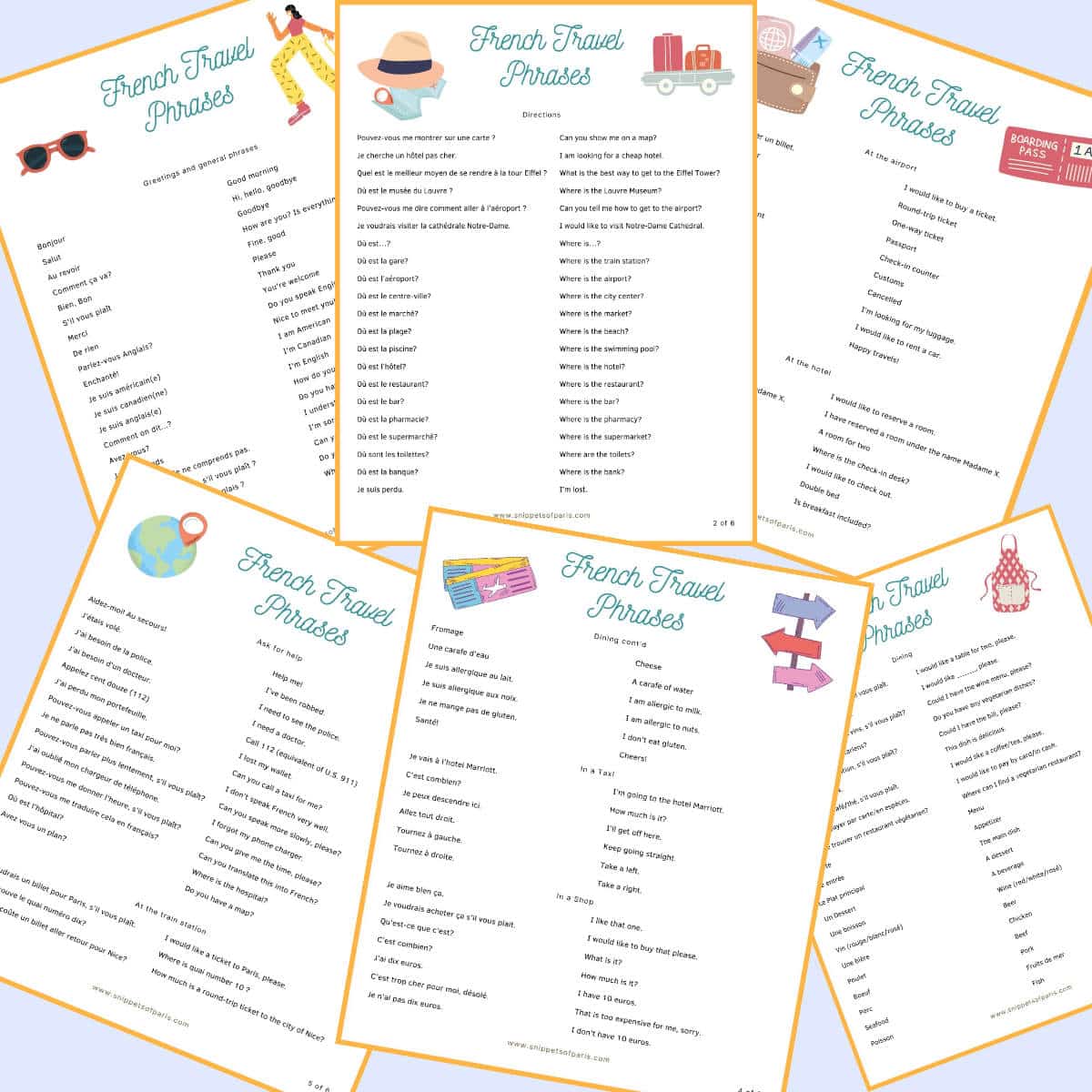
- Post category: French Language / Travel to France
- Post author: Nassie Angadi
If you are planning a trip in France, you may want to learn a few french travel phrases to make the most of your visit. Travel can be stressful, so there’s no better way to calm your nerves than by understanding the local language .
The French are notoriously shy about speaking English, so a few phrases in French is bound to put everyone at ease. In this article, I will cover some useful phrases in various instances, from asking directions, ordering at a restaurant, going somewhere in a taxi, etc.
So, without further ado, let’s take a look at the top useful French travel phrases for your big trip to France. Allons-y!
Greetings and general phrases
There is quite a lot of different French greetings but the most basic is the Bonjour . If there is only one word to remember on your trip, this is the one.

Asking for help
You can find more information on calling emergency numbers in France here.
At the airport
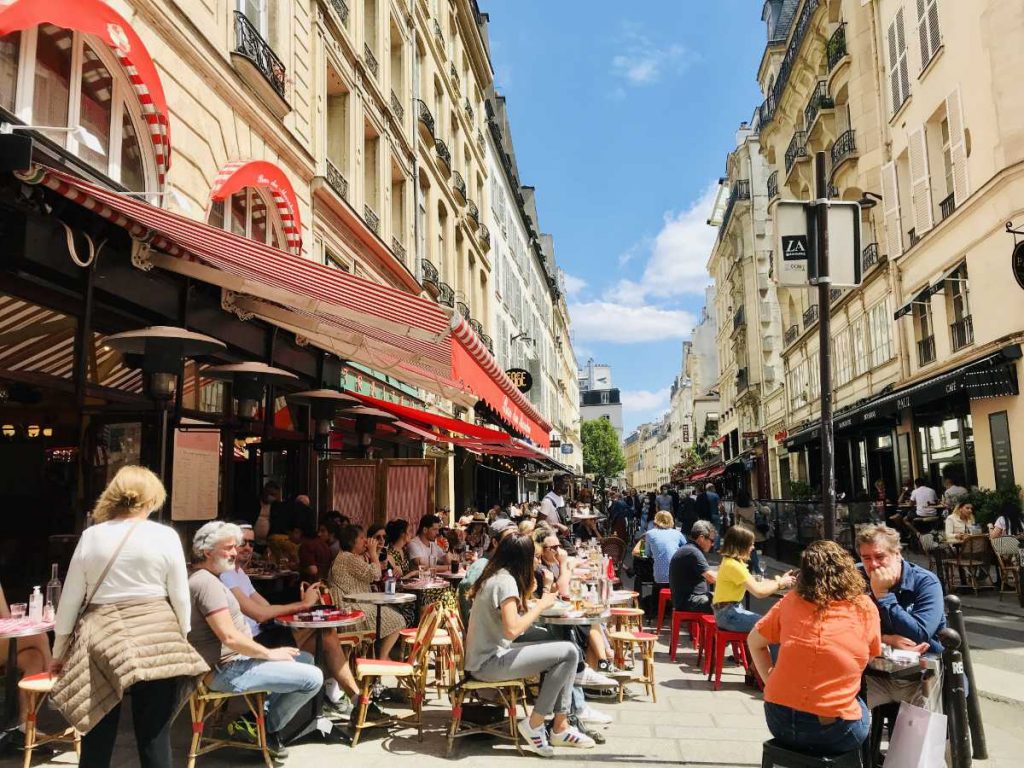
Food, restaurants and dining out
You can find more French food culinary terms here and top foods to eat in France here.
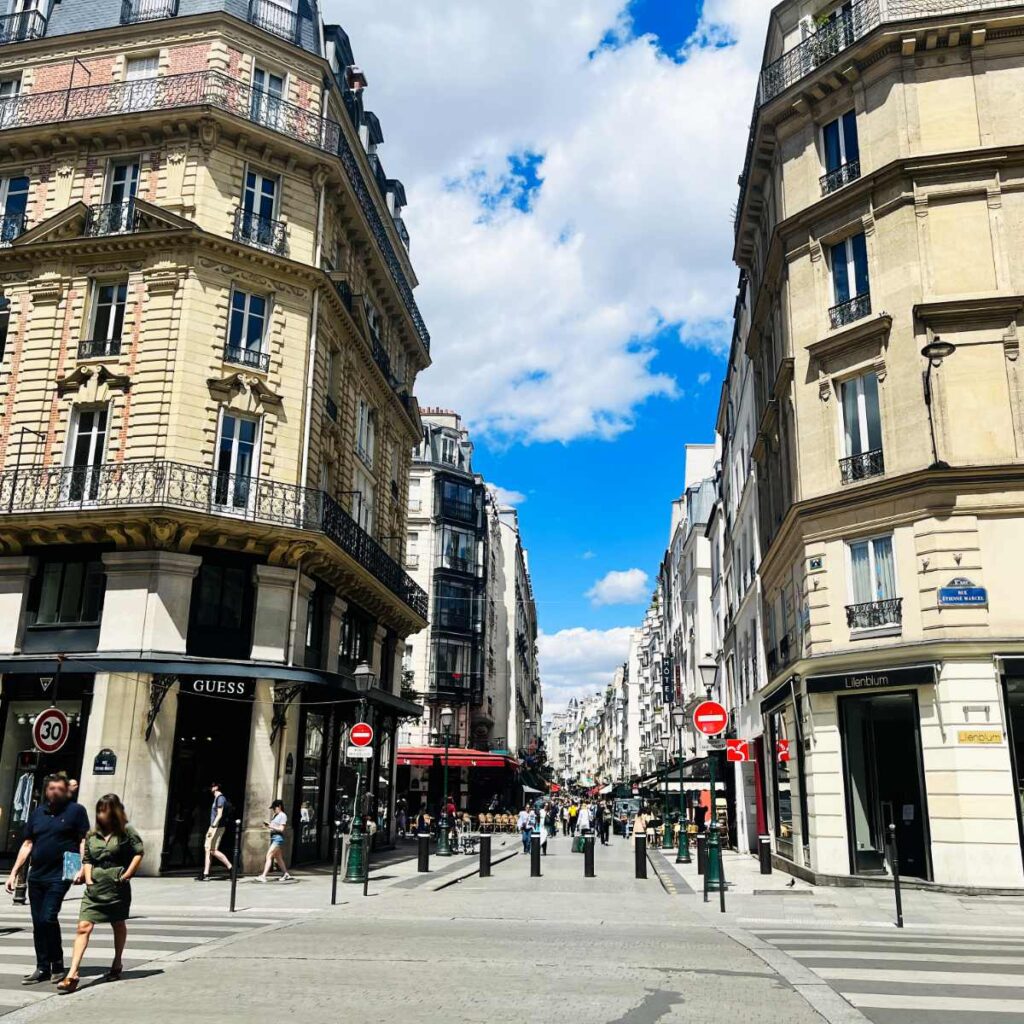
At a train station
For more numbers in French , you can find my printable here.
In a museum
You can find the top museums in Paris here.
If you enjoyed that article, you may like to download the list in printable format below. You can also read more about traveling to Paris here. A bientôt!

You Might Also Like

French Tattoos: 62 Sayings, Words, and Ideas

French Food Expressions: 32 Funny and weird phrases

15 Famous French poets you have to read
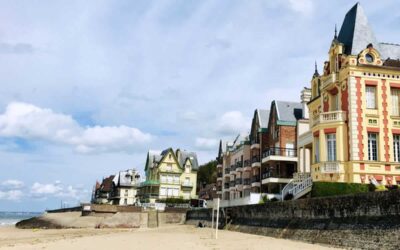
18 Best beach towns and coastal cities in France
Leave a reply cancel reply.
- Paris & Île-de-France
- Alsace & Lorraine
- Bourgogne-Franche-Comté
- Bretagne & Normandy
- Auvergne Rhône Alpes
- Loire Valley
- Northern France
- Nouvelle Aquitaine
- Provence & French Riviera
- Festivities
- Facts and history
- Get the Look
- Moving to France
- Appetizers & Starters
- Main dishes
- Side dishes
- Common Questions?
- Newsletters

French Travel Phrases
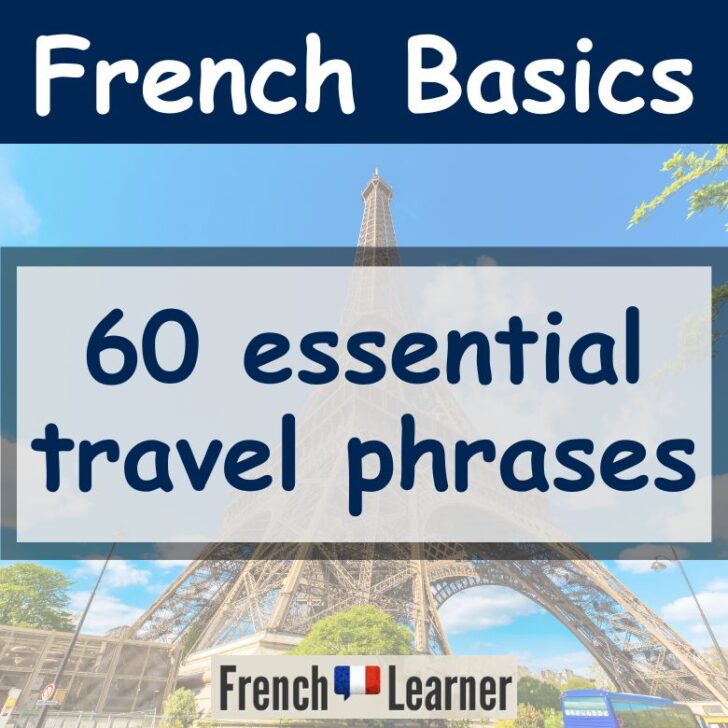
The most essential French travel phrases are Bonjour (hello), au revoir (goodbye), Où est? (Where is), C’est combien? (How much is it?) and l’addition s’il vous plaît (the check, please). This page covers over 60+ useful words and phrases which you can use on a trip to France.
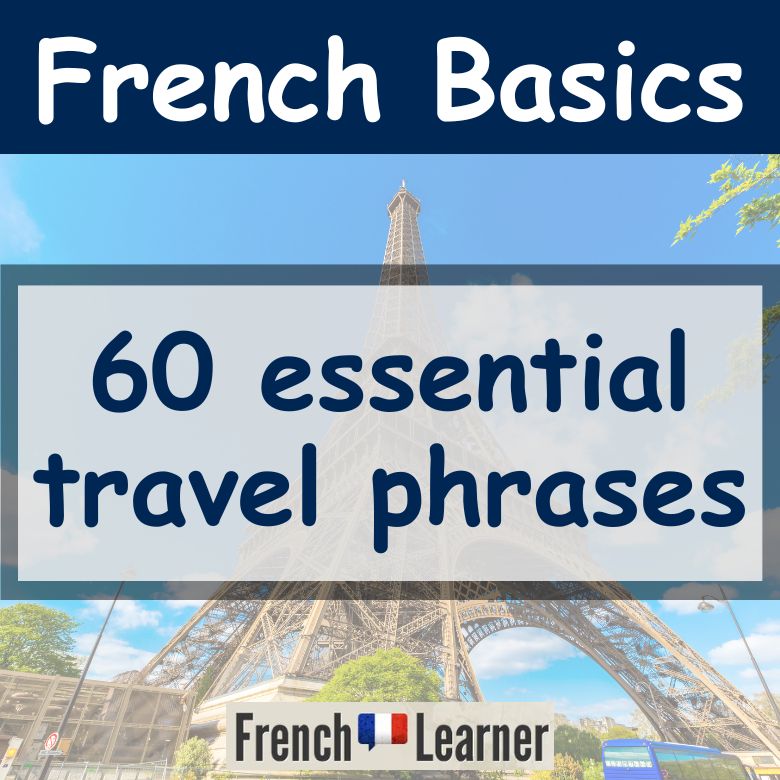
French Greetings
If you are going to France it is very important to learn the basic greetings. While you might not speak French fluently just yet, the French people will really appreciate your trying to make an effort.
- Bonjour Hello, good morning, good day
- Au revoir Goodbye
- Salut Hi/bye (informal)
- Merci! Thank you!
- Merci beaucoup! Thank you very much!
- Ça va? How are you? How’s it going? (informal)
- Bien, merci! Fine, thank you!
- S’il vous plaît Please
- De rien You’re welcome
- Enchanté! Nice to meet you!
This page on our site covers French greetings in detail.
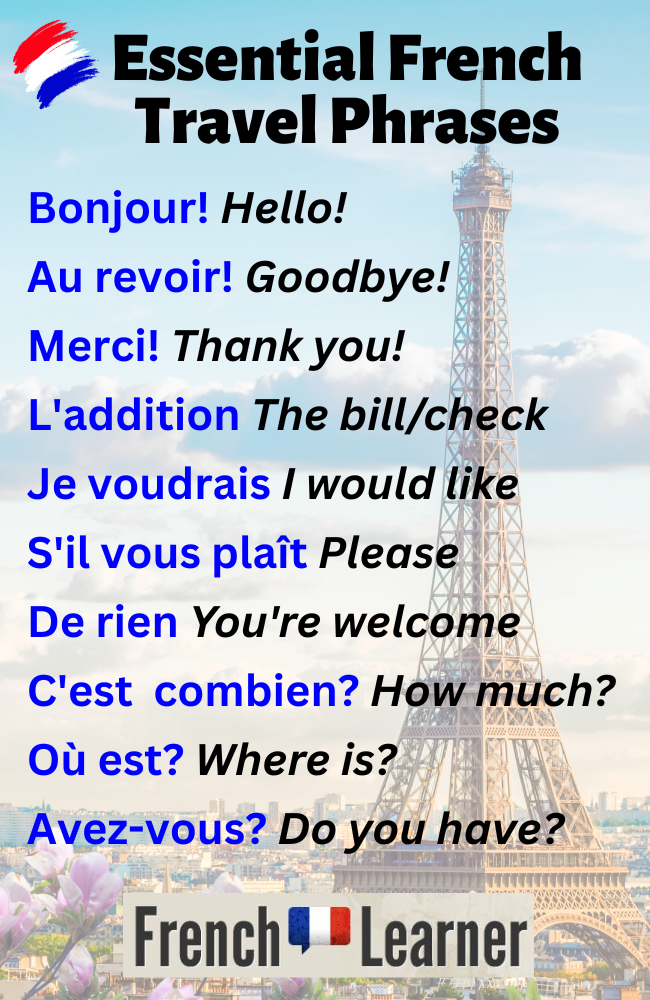
Asking directions
When asking directions in France, it’s very important that you know a few basic words. This page on our site covers asking directions in detail.
- Où est…? Where is…?
- Où est la gare? Where’s the train station?
- Où est la gare routière? Where’s the bus station?
- Où sont les toilettes? Where’s the restroom?
- Où est la banque? Where’ the bank?
- Où est un bureau de change? Where’s a exchange counter?
- Je suis perdu I’m lost
- Le plan city map
Asking for things
On your trip you’ll inevitably need to ask for things. This short list of words is a very good start. Learning the verb vouloir is a good idea as it means “to want”.
- Je veux (slightly informal)
- Je voudrais I would like
- Donnez-moi Give me
- Avez-vous? Do you have?
- Auriez-vous Would you happen to have?
- Qu’est-ce que c’est? What is it?
- Nous avons We have
- Nous n’avons pas We don’t have
- C’est disponible It’s available
Restaurant phrases
One of the best places to try practicing speaking French is a restaurant. Here’s a short list of words in phrases you may use. This page on our site offers a very comprehensive list of restaurant vocabulary . In addition, this page on our site covers food vocabulary and this page covers beverage vocabulary.
- Une table pour deux, s’il vous plaît A table for two, please
- Je prends I’ll have (from the verb prendre , to take)
- La carte menu
- La soupe soup
- La salade salad
- L’entrée appetizer
- Le dessert dessert
- La boisson beverage
- Le vin rouge red wine
- Le vin blanc white wine
- La a bière beer
- Le café coffee
Taxi/Uber phrases
If you find yourself in a taxi or Uber, some of the the following phrases should come in very handy.
- Je vais à I’m going to
- Je descends ici I’ll get off here
- Voici l’adresse Here’s the address
- Allez tout droit Keep going straight
- Tournez à gauche Take a left
- Tournez à droite Take a right
Hotel phrases
The following is a short list of words and phrases that you can use in your hotel. While most hotel staff speak basic English, it’s still nice to know these words in French.
- L’hôtel hotel
- Une chambre à deux double room
- Un grand lit Double bed
- La réception Check-in desk
- Quitter la chambre To check out
- La piscine swimming pool
- Le petit déjeuner compris Breakfast included
- Réserver une chambre To reserve a room
Miscellaneous words and phrases
The following is a list of miscellaneous French words and phrases which we feel are essential for a trip to France and belong on this list.
- Je voudrais louer une voiture. I’d like rent a car.
- Je voudrais acheter un billet. I’d like to buy a ticket.
- Un billet aller-retour Round-trip ticket
- L’aller simple One-way ticket
- Le passeport passport
- Les vacances vacation
- Je voudrais annuler. I’d like to cancel.
- Un voyage A trip
- Bon voyage! Enjoy your trip!
- Bon séjour! Enjoy your stay!
Further your learning We feel that it’s a great idea to carry a French phrase book while traveling in France. Most phrase books on the market won’t show you how to actually say the phrases. For an audio option, check out French Today’s Modern French Audio Phrasebook !
Discover more:
- Ways to say “thank you” in French
- How to say “hello” in French
- Ways to say “you’re welcome” in French
- Guide to French verbs
- Guide to French vocabulary

Sharing is caring!
Affiliate disclosure: Below you will find affiliate links. If you purchase something after clicking the link, we will receive a small commission. To learn more please visit our full disclosure page . Merci!

Read our full review of À Moi Paris and find out why we love it so much!

Read our full review of French Verb Drills and find out why we recommend this course!
David Issokson
David Issokson is a lifelong language enthusiast. His head is swimming with words and sounds as he speaks over six languages. Of all the languages he speaks, he's the most passionate about French! David has helped hundreds of students to improve their French in his private online lessons. When procrastinating working on his site, FrenchLearner.com, David enjoys his time skiing and hiking in Teton Valley, Idaho.
See all posts by David Issokson
Cyber Monday Sale 70% Off - Start Your Free Trial - LIMITED TIME

Mastering French for Your Next Travel: A Beginner's Guide

Bienvenue , or "welcome", to this quick comprehensive guide to French phrases for everyday life and travel!
We will go over some basic French phrases and the essential French phrases for travel. If you want to learn to speak French, this is an excellent starting point for your foreign language learning journey.
Before we dive into this useful French vocabulary, we will also discuss various ways to learn French at home.
So, if you are planning a trip to France or another French-speaking country, kick-start your learning journey now with our top tips, concise vocab list and notes on French pronunciation.

Learning to Speak French
The process of learning French is made easier when you have the right learning tools in your tool kit. The more learning resources you use, the faster you will progress.
Remember to focus on all four language skills: reading, writing, listening and speaking. If you want to master the French language, all of these skills are essential.
You can sign up for free French courses online and use well-reputed language-learning apps like Lingopie or Duolingo, which you will find as iPhone and Android apps.
Different online courses and apps will focus on different foreign language skills, so try to use more than one in conjunction. On top of that, look for grammar and vocabulary-specific resources, such as YouTube videos, TikToks , Instagram reels and so on.
With the plethora of awesome free or low-cost learning resources at your disposal, learning French has never been easier or more fun!
Another great approach to learning French is to watch French movies and TV shows on Lingopie. This will develop your French language skills and understanding of French culture all while you are entertained.
French immersion in content created by and for native French speakers is invaluable. Download some French TV or music and learn French anytime, anywhere while you go about your everyday life.
You will be speaking French in no time if you use these learning tools for at least ten minutes every day. Remember - the more time you put into your learning, the faster you will progress!
Basic French Phrases
Now that you have read some top tips for learning to speak French quickly, let's break down some essential French phrases for everyday life and travel.
By learning just a few useful French phrases, you can build your confidence, introduce yourself and express your wants and needs in a new language.
So, here are the most useful French words and phrases to learn for beginners!
Bonjour means "hello" in French. Its literal translation is "good day" and you can use bonjour for "good morning" and "good afternoon" as well. Then, when the sun sets, you should switch to bonsoir , which means "good evening".
At night, you can say bonne nuit , which is "good night". If you want to politely greet someone and you are not sure which phrase to use, you can always opt for the simple but effective bonne journée , or "good day".
Comment vous appelez-vous?
If you are meeting someone for the first time in France, you can ask formally "what is your name?" by saying comment vous appelez-vous? or informally, using comment tu t'appelles?
Consider the person's social position in relation to your own and judge which version of the question is more appropriate. If they are your senior in a social or business situation, it is best to use formal language.
Je m’appelle…
Then, when asked your name, you can reply "my name is..." by saying either je m'appelle or simply je suis…
While the former means "I am called", the latter means "I am..." Both are acceptable ways to introduce yourself, so it comes down to personal preference.
At this point, you might add et je viens de… "and I'm from..." to your introduction.
Comment allez vous
Once you have introduced yourself in French, you might want to ask "how are you?" There is a formal way to do so; comment allez vous? as well as an informal option; comment ça va?
As you know, the choice of which phrase to use depends upon the formality of the situation and your relationship to the other person. You would ask your boyfriend comment ça va? but you would ask his mother comment allez vous?, for instance.
Ça va bien/ mal
The most common reply to the question "how are you?" in French is ça va bien , "I'm good"/ "it's going well". But you can also say ça va mal, "it's not going well", if that is a more accurate response.
Comme ci, comme ça
Everyone learning French in a classroom is familiar with this classic French phrase. If you are neither feeling good nor bad, you can say comme ci, comme ça, which means "so-so".
Of course, oui means "yes", while non means "no". Once you start to ask and understand questions, these words will be vital for everyday use.
When it comes time to say goodbye, you can opt for the classic au revoir , meaning "goodbye".
Or, you can say a more casual à bientôt! , which means "see you soon!"
S’il vous plaît
When asking for something in French, remember to add a s'il vous plaît or a s’il te plaît, meaning "please". Once again, the options here are formal and informal, so judge the situation and if in doubt, opt for the formal phrase.
Merci means "thank you". Please and thank you are two essential French phrases for everyday life and travel in the French-speaking world. When you visit any country in which French is the official language, you will do well to use your manners and show willing to be polite in French.
De rien means "it's nothing" or "you're welcome". French people respond to merci with this handy little phrase.
The French word rien means "nothing" or "anything" depending on the context. Think of the famous Édith Piaf song Non, Je ne Regrette Rien (" no, I don't regret anything").
Excusez moi
This useful French phrase means "excuse me". You can use excusez moi when you need to excuse yourself or get a person's attention to ask a question.
Qu’est-ce que…?
Finally, qu’est-ce que…? means "what?...", "what is it?" or "what is that?" depending on the context.
You can use this phrase to ask a longer question, such as qu’est-ce que tu fais ce soir?, meaning "what are you doing this evening?", for example.
Speaking French on Holiday as a Beginner
Parlez vous anglais.
If you want to ask a question you cannot yet express in French, you can always ask "do you speak English?"
Je parle un peu français
Then, you can explain "I speak a little French". This will encourage native French people to speak to you more clearly, using simple language.
Pourriez-vous parler plus lentement?
If you are still struggling to understand, you can ask "could you speak more slowly?"
Je ne comprends pas
And in the event that you cannot translate the other speaker's remarks, you can say "I don't understand".
French Travel Phrases
The question où est...? means "where is...?" and it can be followed by le , la , or les, depending on whether you intend to use a masculine noun, a feminine noun or a plural noun.
For instance, où est le guichet? means "where is the ticket window?", où est la banque? means "where is the bank?" and où sont les toilettes? means "where are the toilets?"
Je cherche means "I'm looking for". A common phrase uttered by tourists in Paris is je cherche la tour Eiffel, "I'm looking for the Eiffel Tower".
Je voudrais
Je voudrais means "I would like". This is an invaluable phrase when speaking French. Add a verb from your French dictionary and start to form a request. For instance, je voudrais acheter ... "I would like to buy..."
Combien ça coûte?
The next logical question is, of course, "how much does it cost?"
La carte (des vins)
In a restaurant, you will want to know how to as for the "(wine) menu".
And at the end of your meal, you can request "the check".
When you are clinking glasses with your French friends in the restaurant, you can say santé , which literally means "health". This is like when people who speak English say "good health" when they touch glasses.
When your friends say santé, it is common to reply à la vôtre! "[and] to yours!" if you are with more than one person (or someone with whom you are speaking formally).
French Pronunciation
Finally, a note on the French accent. This is an area that many people find challenging when developing their speaking skills.
You will have to work on your pronunciation and French accent in order to improve your speaking skills, so try to shadow the speech of native speakers on French TV and listen to French songs.
As a beginner learning French, you might find the pronunciation illogical, but as you learn the basics, it will fall into place - we promise!
An example is the "est ce que” in qu'est-ce queue, which is pronounced like “ess que”. This is not instinctive to English language speakers, but it is consistent in French.
Now, let's look at some frequently asked questions about the French language!

FAQs related to learning basic French phrases
How can i learn french by myself.
You can learn French by yourself by using great online resources to inform your language learning. Language apps, online courses and streaming platforms are excellent tools to help you learn French grammar, vocabulary and language skills.
How long does it realistically take to learn French?
The timeline for learning French is different for everyone. Realistically, you can learn to speak French at a basic level in just a couple of weeks. Then, after 6 months to a year, you should be speaking French comfortably at an intermediate to advanced level.
Which words and phrases will help you a lot when traveling in France?
When traveling in France, there are certain words and phrases that will help you to sound authentic and communicate with native speakers. The French slang word picoler means "to drink alcohol [in excess]" and this is a great one for sounding like a local. You can also use c'est nul , meaning "that sucks", sans déconner , meaning "no joke" or vas-y mollo, "take it easy".
These colloquial French words and phrases will help you to fit in with native French speakers while you travel.
What are some sayings in French about travel?
Here are some useful French phrases about travel:
- Bonnes vacances! - have a good holiday!
- Bon voyage! - have a good trip!
- Les grandes vacances - school summer break
- Partir en vacances - to go on vacation
Summing Up: Mastering French for Your Next Travel
This guide to French travel phrases and French pronunciation is a great starting point for your French learning journey.
While you are learning French, try to use all of the available learning resources, such as TV and movies, music and apps.
The more you engage with native French content, the more your spoken French will develop a certain je ne sais quoi!
Sound like a native French speaker in no time with the help of Lingopie and other language-learning apps and websites.


Milena Andrade

9 Short Stories to Learn Italian (for Beginners)

Spanish for Travelers: How to Speak Like a Local
You might also like.
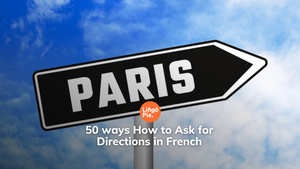
50 ways How to Ask for Directions in French

18 French Pick Up Lines Every Learner Should Know
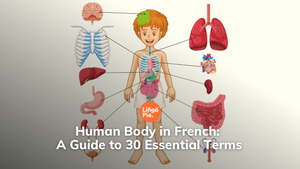
Human Body in French: A Guide to 30 Essential Terms

French Animal Sounds: A Fun Way to Learn French
Get the secret guide to language learning with tv and music for free, browse posts by popular tags.
Get my newsletter plus a FREE guide of DOs & DON'Ts for tourists!
Oui In France
50+ Basic French words and phrases for travel to France (with pronunciation)
French language · travel
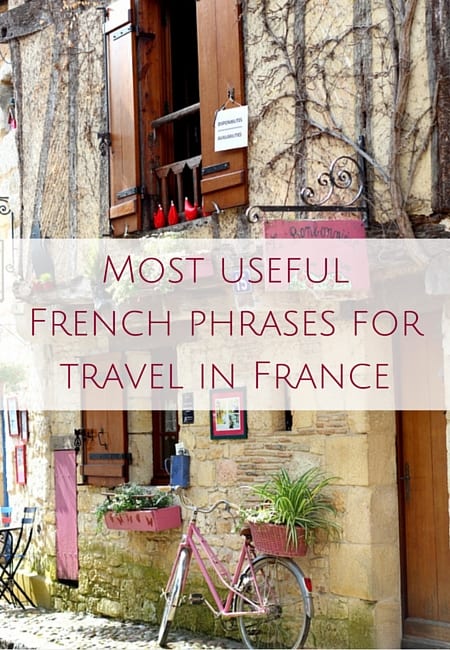
When traveling to a country where your native tongue isn’t spoken, the language barrier can be a major hurdle. Two of the most frustrating things are expressing yourself as well as not understanding what is being said to you. A relaxing, stress-free trip can get very stressful when you’re not able to communicate.
To help you out, I’ve put together some of the most common French words and phrases for travel to France — with audio, of course (thanks Tom!) because pronunciation is everything.
GO read my basic French words and phrases for travel
Basic French words and phrases with pronunciation for your France trip

Even the most talkative and friendly traveler can be silenced when one’s lexicon in the local language is nonexistent. Don’t let that be you and learn my basic French words and phrases before you go!
First, a quick primer on French etiquette. Before approaching a stranger and asking them a question, always start with a “Bonjour” at a bare minimum. Bonjour really is a magic word in France and I explain why here. It’s probably best to throw in “Excusez-moi” too.
If you’re interrupting someone who is busy working, eating or otherwise unavailable, it’s best to be extra polite and say “Bonjour, desolé de vous déranger mais…” (Hi, sorry to bother you but…) and then ask your question.
After the person has attempted to help, be sure to thank them with a “Merci, beaucoup, bonne journée!” Trust me, politeness goes a long way and these basic French words and phrases will come in handy.
Below I’ve used all formal/polite (vous) forms of phrases and questions.
Regarding my list of basic French words and phrases, this is by no means a comprehensive list and is just a starting off point. Write ’em down, learn ’em and keep ’em in your back pocket for when the perfect situation arises. Then show off your French skills like a boss. Or at least be happy someone understood you!
Click the triangle icon under all of my French phrases for travel for the audio (me saying the word in English and Tom saying the French equivalent) — because what good are travel phrases in a foreign language if you have no idea how they’re supposed to sound?
Tourists in France: Why a little bit of effort with French goes a long way >>
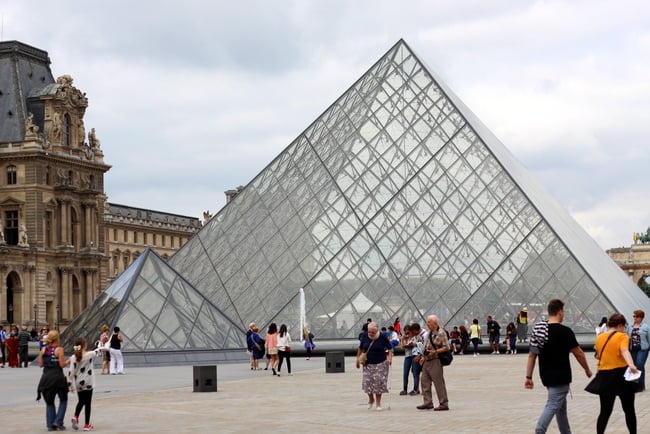
Basic French words and phrases for travel with pronunciation
Hello / Bonjour
Goodbye / Au revoir
Thank you / Merci
Sorry / Désolé(e)
You’re welcome / Je vous en prie (or De rien)
Excuse me /Excusez-moi
Do you speak English? / Parlez-vous anglais ?
I don’t speak French / Je ne parle pas français
Could you please speak more slowly? / Pourriez-vous parler plus lentement s’il vous plaît ?
Where is the restroom? / Où sont les toilettes ?
What time is it? / Quelle heure est-il ?
I’d like… / Je voudrais…
45 Things an American in France thinks when visiting for the first time >>
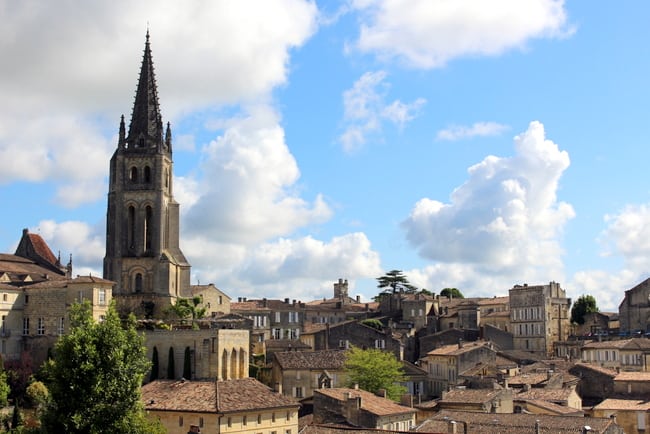
When traveling in France
Where is (gate 42)…? / Où est la porte d’embarquement 42 ?
I am on the train / Je suis dans le train
I need to change my reservation / Je dois changer ma réservation (mon billet)
We are going to be late (early) / Nous allons être en retard (en avance)
We arrive at 10 o’clock / Nous arrivons à 10 heures
What time are we arriving? / A quelle heure arrivons-nous ?
I need a taxi / J’ai besoin d’un taxi (Je dois prendre un taxi)
Where is the train station? / Où est la gare ?
Where is the airport? / Où est l’aéroport ?
To the train station (airport) please! / A la gare (l’aéroport) s’il vous plaît !
Go right / left / straight / Allez (prenez) à droite/à gauche/tout droit
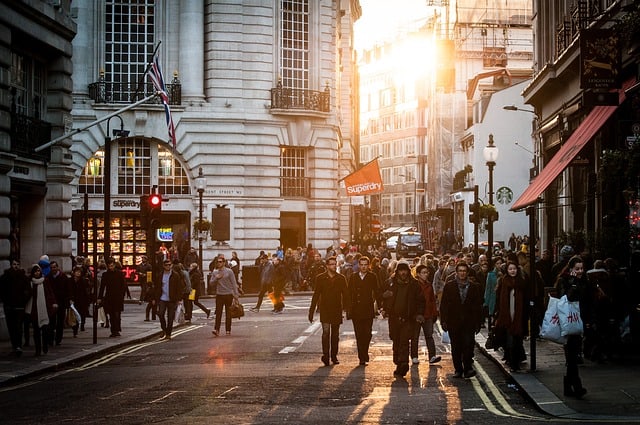
When shopping in France
How much is… ? / Combien coûte… ?
It’s too big / C’est trop gros
It’s too small / C’est trop petit
I like it / J’aime ça
I don’t like it / Je n’aime pas ça
Do you have these in size 39? / Est-ce que vous les avez en 39 ?
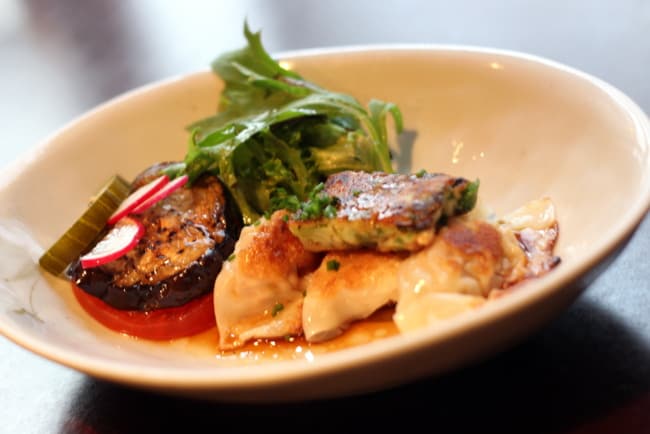
When at a restaurant in France
To go / A emporter
We’d like a table for 2 please / Une table pour deux s’il vous plait (Nous voudrions une table pour deux s’il vous plait)
Do you have a menu in English? / Avez-vous un menu en Anglais ?
I’d like another glass of wine please! / Je voudrais un autre verre de vin s’il vous plaît !
I’m allergic to dairy. Is there any in this dish? / Je suis allergique aux produits laitiers. Est-ce qu’il y en a dans ce plat ?
It was excellent! / C’était excellent (délicieux)
Check, please! / L’addition, s’il vous plait !

When socializing in France
Hey! (also “see ya”, when leaving) / Salut !
How are you? / Comment allez-vous ? (Comment vas-tu ? / Comment ça va ?)
What’s up? / Quoi de neuf ?
Where are you from? / D’où venez-vous ? (d’ou viens-tu ?)
I’m from the United States / Je viens des Etats-Unis
I’m American / Je suis américain(e)
Are you hungry? / Est-ce que vous avez faim ? (est-ce que tu as faim ?)
Want to grab a drink? / Vous voulez prendre un verre ? (tu veux prendre un verre ?)

When you’re sick in France
I am sick / Je suis malade
My head hurts / J’ai mal à la tête
I’m nauseous / J’ai la nausée (j’ai mal au coeur)
I vomited / J’ai vomi
I need to see a doctor / J’ai besoin de voir un médecin (Je dois voir un médecin)
I need to go to the hospital / Je dois aller à l’hôpital
Call an ambulance! / Appelez une ambulance ! (Appelle une ambulance !)
Where is the pharmacy? / Où est la pharmacie ?
Help me please /Aidez-moi, s’il vous plait !/ Au secours!
With a little practice, your ability to bust out these basic French words and phrases will skyrocket the next time you’re speaking to a French person. So get to it! Anything you’d like to add? Talk to me in the comments about the most common French words for travel!
If you found my list of basic French words and phrases for travel helpful, would you mind sharing please?
PIN my basic French words for travel POST:
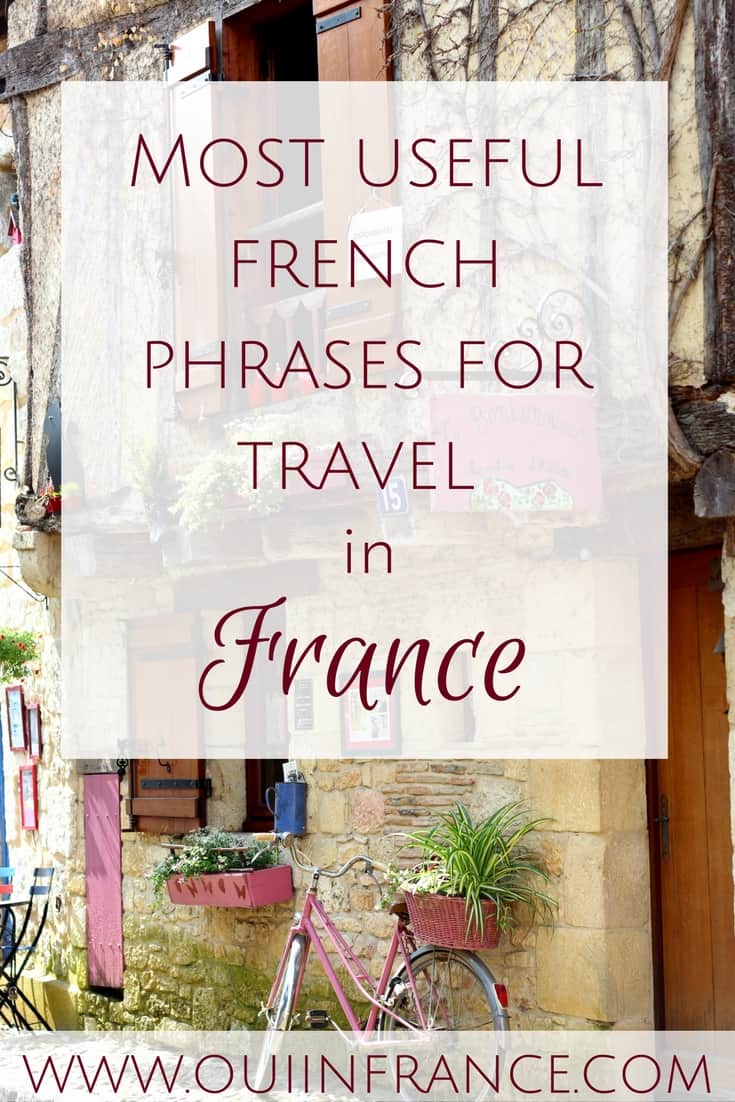
You might like

Sign up for the Oui In France Newsletter!
Stay up to date with everything Oui In France! Plus get my FREE GUIDE with 24 DOs & DON'Ts to keep in mind when visiting France!
January 4, 2016 at 5:11 pm
Great post Diane and good advice about interrupting someone. Last year in SuperU I asked an assistant (who was stacking shelves) where the batteries were. I started with ‘Excusez-moi Monsieur’ (at home I would just say ‘excuse me’ ) He very pointedly replied with ‘Bonjour Madame’, I felt very rude and now try to remember to always use Bonjour before an enquiry.
January 4, 2016 at 7:39 pm
Thank you! Yes, so true about the bonjour before saying anything else. I think sometimes people can be very goal focused — get the answer to your question and move on. But in France it seems like kids are taught that politeness is obligatory so I’m sure Americans launching right into a question can seem off-putting. Sometimes I forget the bonjour and right away I realize my error, so I kind of fake cough and say it again haha.
January 4, 2016 at 7:55 pm
Love your blog. Today was great! Your husband did a great job of taking words apart to hear.
January 5, 2016 at 6:31 am
Thank you, so glad you enjoyed it, and I’ll let Tom know! He was nervous recording everything!
January 5, 2016 at 2:49 am
Thank you I found this to be interesting
January 5, 2016 at 6:32 am
Great to hear, thanks so much!
January 6, 2016 at 4:21 pm
This was one of your best so far! Like having a mini translator guide with audio. Well done!
January 12, 2016 at 8:12 pm
Thank you, glad you found it useful!
January 11, 2016 at 12:14 pm
Starting with “bonjour” is just about the most important tip for any interaction with a stranger in French. A really useful post Diane, thanks for linking to #AllAboutFrance
January 12, 2016 at 8:13 pm
Yup, I always tell people even if you don’t know any other words or are too embarrassed to try, ALWAYS start any interaction with bonjour. Makes a good first impression! Thanks for hosting the linkup!
January 11, 2016 at 12:54 pm
Very helpful. Merci Beaucoup!!
You’re very welcome!
January 12, 2016 at 7:35 pm
What a handy tool! This is so easy to use — a great brush up before a trip to France!
Thank you for checking out the post. So glad you found it useful!
January 17, 2016 at 5:29 am
This is great and so useful! Bises from #allaboutfrance
December 12, 2016 at 4:28 pm
French are known for their lack of patience and quick exasperation, but if you know the right words to approach them you’re off with a positive and happy response. As you have mentioned above, Politeness is the #1 rule. Great post, should come in handy for many foreign travelers in France!
December 12, 2016 at 4:32 pm
Thanks so much, Frederic! I hope you’ll consider sharing this post on your FB page. I’m sure your community would find it helpful. 😉
May 7, 2018 at 11:05 am
Hey guys I was on Reunion Island where I took french courses at DP Langues and I really recommand it my experience there was amazing ! Cheers
June 20, 2018 at 2:32 am
Merci beaucoup! So helpful!
January 21, 2022 at 2:50 am
Stumbled across this post on Pinterest—a great summary! I’m requiring my kids to learn a little French before their first trip to Paris this summer, and I’ll use this to help. Thanks!
January 21, 2022 at 6:43 am
You’re very welcome! So glad it was helpful!
June 26, 2023 at 7:27 pm
Excellent basic French questions and phrases. I like it when the French guy says the French at a slow pace.
Leave a Reply Cancel reply
Your email address will not be published. Required fields are marked *
Notify me of new posts by email.

As an Amazon Associate I earn from qualifying purchases.
Travel and Language Adventures

Ultimate and Printable Guide: Basic French for Travelers

Once it is safe to travel again, are you planning on visiting France? France is the most-visited country in the world , with nearly 90 million people visiting annually (in a normal year that is!). French is estimated to be spoken fluently by approximately 235 million people . That means that the French you learn for your trip will likely be useful again in the future as well!
It is a great idea to have some knowledge of basic French words and phrases in your repertoire before departing on your trip. In major cities like Paris, it may be true that many people know some English, but most still use French. The more you go out of the city there will be fewer people willing to use English, or even that know English at all. French speakers are very proud of their language, so knowing at least some of it is respectful and part of the experience of traveling to a new place.
French is a Romance language, which while it does sound romantic, actually means it is one of the languages that derive from Vulgar Latin . You may not have a community of native French speakers at your disposal to help with pronouncing new words in this romantic language. So, while talking with native speakers really is the best way to learn, online tools like Google Translate or Duolingo can help in the meantime.
Without further ‘adieu’, here are some great Basic French Words and Phrases you should know before traveling to France:
General Greetings
- Hello — Bonjour
- Thank You — Merci
- Good Morning — Bon Matin
- What time is it? — Quelle heure est-il?
- Excuse Me — Excusez-moi
- Good Evening — Bonsoir
- Goodbye — Au revoir
- Please — S’il vous plaît
- Sorry — Pardon
- My name is *name* — Je m’appelle *name*
- How are you doing? — Comment allez vous?
- Do you speak English? — Parlez vous anglais?
- Airport — Aéroport
- Train Station — Gare
- Restaurant — Restaurant
- Washroom — Toilettes
- Hotel — Hôtel
- Museum — Musée
- Metro — Métro
- Car — Voiture
- Taxi — Taxi
- Bus — Autobus
- Ticket — Billet
- Street — Rue
- Passport — Passeport
- Luggage — Bagage
Food and Drink
- Water — L’eau
- Beer — Bière
- Coffee — Café
- Bread — Pain
- Cheese — Fromage
- Breakfast — Petit déjeuner
- Lunch — Déjeuner
- Dinner — Dîner
- Food — Nourriture
- Drinks — Boissons
- Menu — Menu

The French language has ‘formal’ and ‘informal’ words that English does not have to address someone. For instance, in English, you would just ask ‘How are you doing?’, whereas in French you can ask either ‘Comment allez vous?’ (formal) or ‘Comment vas-tu?’ (informal). If you have never met someone before, make sure you use the formal ‘you’.
Also, something to remember whenever you are traveling abroad: the emergency number in a foreign country may not be the same as your own. For instance, in France, it is 112. Something important to note before traveling to a new place, just in case you need it!
With some Basic French words and phrases in your repertoire, you’re ready to enjoy your visit to Sweden!

You May Also Like

Ultimate and Printable Guide: Basic German for Travelers

Ultimate and Printable Guide: Basic Swedish for Travelers
One comment.
- , November 17, 2022
50+ Basic French Travel Phrases To Use While Abroad

Bienvenue en France! While traveling through this beautiful country, knowing basic French travel phrases is essential to help you get around. Many French people do not speak English, so it’s actually quite necessary to know a bit of French to help make your travels as smooth as possible.
It can be frustrating to travel to a place that does not speak your native language. Still, one part of exploring new places is navigating these difficulties. If you prepare yourself beforehand by learning a few French phrases, you can turn these frustrations into meaningful interactions with local people.
Whether you need to order food from a restaurant, tell your cab driver where you’re headed, or ask French locals general questions, these 30+ travel phrases will help you navigate easily and cement memories to last a lifetime.
Essential French Phrases For Travelers
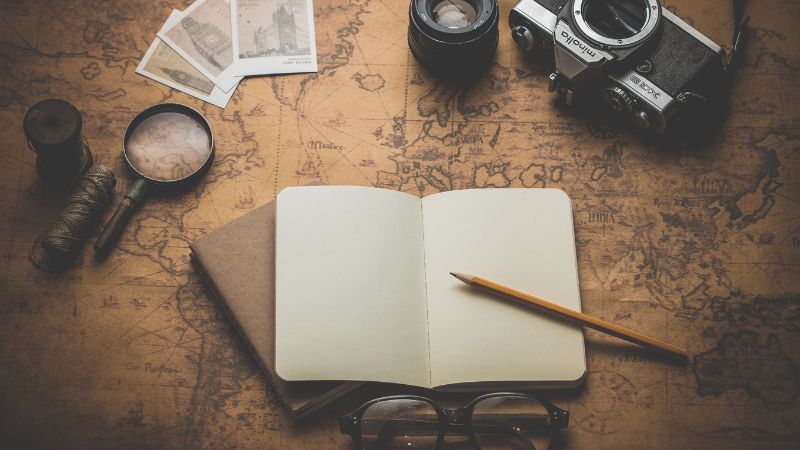
Basic French Phrases For Conversations
These basic words and phrases are the first level of interactions while traveling and probably the words you will use the most in everyday conversations. So pay special attention to them!
These basic words and phrases are the first level of interactions while traveling, and probably the words you will use the most in everyday conversations. So pay special attention to them!
Basic French Phrases For Directions
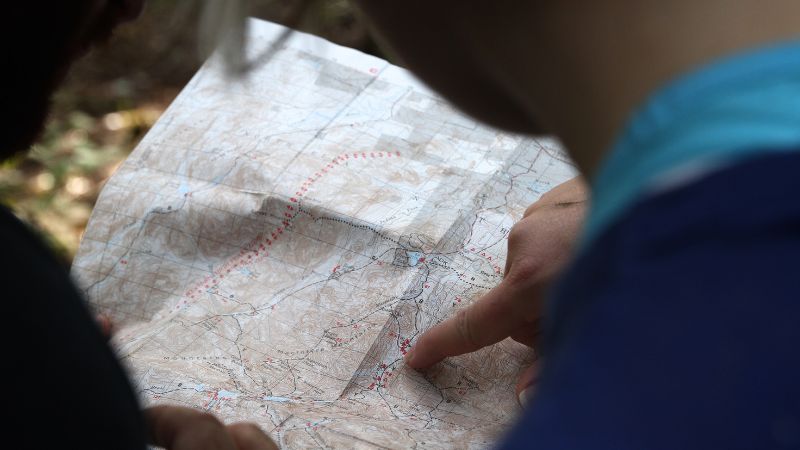
Are you lost in a big city with no phone service? Whip out these basic phrases for directions to get someone to point you in the right direction and save yourself a headache.
Basic French Phrases For Money & Shopping

France is known for its opulent, high-end clothes and style. You’ll definitely be tempted to shop in all the beautiful boutiques, so learn basic phrases for money and shopping. Want to learn more about this topic? Check out Shopping Vocabulary In French: 20+ Useful Phrases & Expressions .
Basic French Phrases For Transportation

France has an excellent public transport system, so you’ll most likely be taking trains and buses while traveling through. These are some phrases to help you get by.
Basic French Phrases For Instruction

These French phrases will help you find the bathroom, the nearest grocery store, or wherever else you need to go. These are easy to pop out while walking or sightseeing, so keep them in mind!
Basic French Phrases For Dining
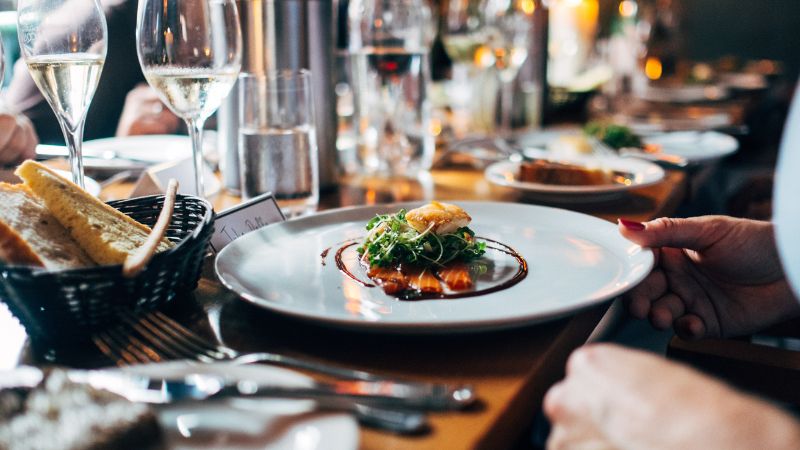
Food is a huge part of French culture, so when you’re fine dining, you’ll definitely want to know some basic phrases to fit in and avoid any awkward situations.
Final Thoughts

Whew! I know that is a lot of information, but take it one category at a time to learn these basic French words and phrases for travelers. Trust me, when you’re in France you’ll want to speak French! Not only is it a beautiful language, but French speakers find it extra respectful when you speak French to them.
Interested in learning more French but need specific, targeted resources? Download the Ling App ! It is a user-friendly language-learning app with games, quizzes, and interactive features proven to help you learn a new language.
You can download it for free on the App Store and Play Store . What are you waiting for? If you start today, you’re one step closer to being prepared for your traverse through France.
Want even more resources? Check out #1 Best Guide: French Vocabulary To Use At The Airport & French .
Leave a Reply Cancel reply
Your email address will not be published. Required fields are marked *
Save my name, email, and website in this browser for the next time I comment.

People also read

Happy New Year In Bosnian: 20+ Best Phrases

10+ Heartwarming Ways To Say You’re Welcome In Bosnian!

5 Easy Bosnian Email Phrases For Beginners

#1 Best Guide About Bosnian Prepositions

#1 Easy Guide: How Are You In Bosnian

5+ Easy Conjunctions In Bosnian For Beginners
What makes learning with ling special, interactive exercises.
Improve your pronunciation by starting a conversation with our app’s interactive chatbot
Engaging activities
Practice your skills with mini-games and track your progress with fun quizzes
Mix of languages
Choose from over 60 languages, both big and small, and listen to audio from native speakers
Proven results
Backed by linguistic research, our learning methods can help you achieve fluency in record time
Southeast Asia
East europe.
© 2024 Simya Solutions Ltd.
Vocabulary Lesson: French for Travelers
Learn Common French Words You'll Use While Traveling
- Pronunciation & Conversation
- Resources For Teachers
Travelers to France and other countries where French is spoken will want to learn a few basic words in the local language. It will help you on your trip ( le voyage ) as you make your way around and speak to people.
In this French vocabulary lesson, you will learn how to ask for directions, navigate your transportation options and rent a car, avoid danger, and enjoy local shopping and dining during your stay. It is an introductory lesson and you will find links to other lessons so you can further your studies.
As a traveler ( voyageur ) , you may also want to brush up on French phrases required for politeness as well as a few that are essential and let people know that you are new to the language.
Have a good trip! ( Bon voyage ! )
Note: Many of the words below are linked to .wav files. Simply click on the link to listen to the pronunciation.
Getting Around and Asking for Directions
Whether you are roaming the streets of Paris or decide to take a drive in the French countryside, these simple phrases are useful for those times when you need to ask for help.
Travel Essentials
Every traveler needs know these basic words for their journey.
- Tourist information - information touristique
- Customs - la douane
- Passport - le passeport
- Map - la carte
Important Signs You Need to Know
Travelers can find themselves in precarious situations if they don't know how to read signs. Some signs will warn you of danger while others simply draw your attention to a simple fact (like the museum is closed or the restroom is out of service).
Before you travel, memorize these simple words and phrases that are found to ensure your trip goes a little smoother.
- Watch out! - Attention !
- Open - ouvert
- Closed - fermé
- Forbidden - interdit
- Do not enter - défense d'entrer
- Out of service - hors service or en panne
In case you should have a medical emergency, get sick, or have a specific medical condition, you will want to review and learn French vocabulary related to ailments and illnesses .
Shops, Restaurants, and Hotels
In your journey, you will probably do quite a bit of shopping and dining. You will also need to stay at a hotel and all of these require you . The following vocabulary lessons will help you navigate all of these situations.
- At the Hotel
- Banking and Money
- Dining at Restaurants
As a primer to those lessons, you will find that you will need to use these two phrases when making purchases.
Transportation Essentials
You will also need to rely on various types of transportation ( le transport ) during your trip and reviewing these French words will be very useful.
The airport comes with an entirely new set of vocabulary that you will want to know for your arrival and departure flights. See if you're ready with this quiz .
- Airplane - l' avion
- Airport - l' aéroport
Quite often, you will find that a subway is a great way to get from one place to another. Familiarizing yourself with these words will help you find the subway station.
- Subway - le métro
- Subway station - la gare / station de métro
The bus is another great form of local transportation ( le transport local ) and you will want to know just a few words in French.
- Bus - l' autobus
- Bus stop - l' arrêt d'autobus
- Bus station - la gare d'autobus
Traveling by train is an affordable and comfortable way to get around France and trains also come with a unique set of vocabulary that you will want to study.
- Train - le train
- Platform - le quai
- Train station - la gare
At the Ticket Booth
No matter which mode of public transportation you choose, a ticket is often required and you will need to visit the ticket booth ( billetterie ) .
- Round-trip ticket - un billet aller-retour
- One-way ticket - un billet simple
- Price - le prix
Renting a Car in French
If you want to break out on your own, renting a car is a great way to do it. This portion of the lesson focuses on what you will need to know about car rentals, including what to ask for and important details in the rental agreement.
When you do get in the car ( la voiture ) , you will also want to know basic French vocabulary for driving .
- Rental - la location
Requesting a Particular Car
You can make special requests for the car you would like to rent with a simple sentence. Begin the request with " Je voudrais..." a nd specify the style of car you're seeking.
Requesting Specific Features in a Car
If you have special requirements, such as a seat for your child, begin the sentence with " Je voudrais..." (I would like...) and ask for one of these.
- Air conditioning - la clime
- Baby seat - une nacelle bébé
- Booster seat - un réhausseur intégral
- Child seat - un siège enfant
Details of the Rental Agreement
It is vital that you understand your rental agreement and these questions will ensure that there is no confusion lost in translation.
- Extra driver - un conducteur supplémentaire
- Damages - les dommages
- Free French Worksheets
- French Vocabulary: At the Hotel
- French Vocabulary: Driving and Cars
- French Trains Vocabulary - Prendre le Train En France
- Best Apps to Learn French
- French Vocabulary: At the Dentist
- Vocabulaire Du Métro - French Subway Vocabulary
- French Vocabulary Lesson: Banking and Money
- French Vocabulary: Illnesses and Ailments
- French Vocabulary: On the Phone
- French Vocabulary: Jewelry and Accessories
- French Reading Comprehension Test
- Tips for Learning French As an Adult
- Telling Time in French
- Tips to Improve Your French Vocabulary
- French Vocabulary: Physical Descriptions of People
Which Language Do You Want to Learn?
- Inside Babbel
- Babbel Bytes
ARTICLES ABOUT
How to start speaking french before your vacation.

Illustration by Aura Lewis , courtesy of the Bright Agency.
You’ve bought your plane tickets, done your hours of research, and planned your itinerary. You’re just about ready to go, but there’s one thing missing: You don’t speak French. Whether you’re heading off to Paris for some art and culture, Brittany for a breath of fresh Atlantic air, or Bordeaux for the wine tour you’ve always dreamed of, you’ll enjoy it even more if you have a bit of the language under your belt. But where should you begin? Luckily for you, here at Babbel, we have tons of courses to teach you everything you’ll need for your trip.
Learning some French for your vacation will make it easier for you to get around, to order exactly what you want to eat or drink in a restaurant or café, and to really experience the culture by making connections with the local people. Here’s a little timeline we put together to get you speaking confidently in just two weeks!
Days 1-3: Get Started With The Basics!
There are some pretty standard things everyone should know how to say in the local language when they travel to a foreign country. Here are just a few:
- How are you?
- Good morning / afternoon / evening
- I don’t understand
- How much is _______?
To master these things in French, we suggest you start with our French beginner’s courses. They teach topics that range from introducing yourself and asking simple questions, all the way to booking a hotel and finding your way around a busy Parisian train station! You’ll also find a number of lessons focused on pronunciation, so you won’t have to worry about being misunderstood when you speak.
Depending on what you plan to do during your stay, some courses might be more valuable to you than others. Really think about what you plan to do on your trip, and try to come up with a list of situations you can imagine yourself in. We recommend taking a look at the courses on our web version so that you can see exactly what each lesson contains. This way you can pick and choose which lessons will be the best for you.
Here’s an additional lesson we think is a must-do:
Finish that one, and you’ll have the vocabulary and phrases you need to be the most polite tourist ever!
Days 4-6: Practice Ordering A Meal!
Ratatouille, bœuf bourguignon, crêpes, quiche … the list goes on! France is a veritable wonderland of food and flavor, and you’ll most likely be spending a fair amount of time in restaurants and cafés. That being said, you should plan to brush up on some useful words and phrases for ordering a meal. As menus are often only in French, it’s a good idea to learn as much food vocabulary as you can! After all, you want to make sure you know exactly what you’re ordering.
For example, let’s say you’re craving a nice Surf and Turf with scallops and a juicy steak, so you order the escalope and filet mignon. You will be understandably disappointed when you end up with a veal cutlet and a pork tenderloin. But don’t worry, we can help you avoid embarrassing situations like this. Under the “Countries and Traditions” category, you’ll find our “French Cuisine” section, which gives you a rundown of the culinary specialties from the different regions of France. After doing these courses, you won’t be surprised at what you find on your plate when you order les cuisses de grenouille!
We also have a couple of other courses about food, drink, and ordering. Here are two you should try before you jet off:
These two lessons will introduce the phrases you’ll need in order to understand the menu, order food, and ask for the bill. The satisfaction of getting through an entire meal in a restaurant en français will make the time you spend practicing absolutely worth it!
Bon appétit!
Days 7-10: Learn To Ask For Directions And Use Public Transportation
Getting lost in a place where you speak the language is bad enough. Now imagine being lost somewhere where you can’t communicate with anyone! Knowing how to ask for help will definitely lower your stress levels if you get turned around.
Now, you should have made it through some of the beginner’s courses, but just in case you missed some of them, here’s a little tip. In Beginner’s Course 2, you’ll find a unit called “Pardon, où est … ?” . These lessons will teach you all you need to know to bravely go where no tourist has gone before! You’ll not only be able to ask for and understand directions but also learn some vocabulary for common locations in a city. Make a list of the places you’d like to visit so you can learn the words for these things as well.
If you still feel like you want a little more practice, then check out these lessons too:
These will help you perfect the skills you learned from the beginner’s course, and also give you more specific information about using public transportation, which can be a confusing affair. It’s also a good idea to learn a bit about French signs and street names. After completing these lessons, you’ll truly be a well-prepared voyageur!
Days 11-14: Put It All Together (And Have Some Fun!)
With just a few days left before you leave, you’ll want to review everything you’ve learned so far so that it’s fresh in your mind and ready to be used! This is where the Babbel Review Manager will come in handy. All of the core vocabulary and phrases you’ve picked up over the last two weeks have been stored there so you can easily go back over them and practice.
If you’re feeling confident with the basics, then now it’s time to have a little fun! We have a huge selection of courses with interesting cultural and linguistic content that you can find under the categories “Countries and Traditions” and “Specials.” With these lessons, you can get your French slang up to snuff ( cimer! ), find some ideas for sightseeing, learn a bit about true and false friends, and also pick up a few idioms to really impress the locals. We promise it won’t all be pour des prunes!
After these two weeks, you should be more than ready to communicate effectively during your vacation. Our final tip for you is, of course, to have fun!
Bon Voyage!
- Write for us
- Privacy Policy
- Terms and Conditions

Learn 150+ Basic French Travel Phrases To Master For Your Next Trip To France
- Post author: Elijah Logan
- Post last modified: April 11, 2023
- Post category: French Vocabulary / Popular Reviews

If you want to explore France thoroughly, especially the city of love, you must know the basic French travel phrases.
Although English is a universal language, it is not well-known in most French-speaking countries. Thus, to get around, you need to learn how to speak basic French.
Traveling to any place where you do not speak the native can be frustrating, especially steering your way while exploring.
So, to ensure you get around different French destinations quickly, you need to learn some essential travel French phrases. Even basic French knowledge can help you interact with locals and learn about the regular lifestyle.
Keeping this in mind, today, I bring you 150+ basic French words and phrases for travel to ensure your next trip to France is unforgettable.
Table of Contents
Basic French Words For Travel In France: Learn Useful French Phrases
Traveling is not only about moving from one place to another. There are a lot of aspects connected to this journey.
While traveling to an unknown place, you are bound to meet new people, interact with strangers, ask for their assistance when lost, go dining, shop, & more.
All these activities do not seem much of a task when you are in a place where you can easily interact with others.
However, in an unknown land, all these tasks seem like dreadful things that may even prompt you to never leave your accommodation in French.
But that is not why you or anyone would fly out for miles to the country of love, France. Exploring another country is a once in a lifetime opportunity. Thus, you need to make the most out of your visit.
And to help you with this, below I have a list of over one hundred & fifty common French phrases & words categorized as per various activities you will enjoy there. So let us begin and start our learning before that trip of yours.
26 Basic Conversational French Phrases
You can never go by in a foreign land if you can not speak even the bare minimum of the native language.
You do not need to be a pro in the French language. But you should at least know the words & phrases used the most in everyday conversations by natives.
Below is a list of some essential words & expressions that you will often use during your travel time in France.
Knowing these everyday phrases will help you interact with natives in a comfortable & sophisticated manner.
- Hello / Good Morning- Bonjour !
- Good Evening- Bonsoir !
- Hi (Informal)- Salut !
- Nice To Meet You- Enchanté!
- Welcome- Bienvenue!
- Yes / No- Oui / Non .
- How Are You?-Çava?
- I’mWell.- Je vais bien.
- How’s It Going?-Ça roule?
- I Am Well, And You?-Je vais bien, et vous?
- Do You Speak English?-Parlez-vous anglais?
- I Do Not Speak French.-Je ne parle pas français.
- I Don’t Understand.- Je ne comprends pas.
- Where Are You From?-D’où venez-vous?
- I Am From …- Je suis de …
- What Is Your Name?-Quel est votre nom?
- My Name Is…- Je m’appelle …
- Mrs. / Mr. / Miss- Madame / Monsieur / Mademoiselle
- Cheers!-Santé!
- I Don’t Know- Je ne sais pas.
- Thank You Very Much.- Merci beaucoup!
- You’re Welcome- De rien!
- Excuse Me / Sorry- Excusez-moi/Pardon !
- Sorry- Je suis désolé (e).
- See You Later!- À tout à l’heure!
- Goodbye- Au revoir!
29 Basic French Travel Phrases For Directions: Beautiful French Language
Getting lost in a new city or country is a thing that most people can relate to. I remember my first trip to Paris. I was so engrossed in exploring the architectural beauty around me that I got separated from my travel group.
I freaked out and was on the verge of crying. I only knew the name of the hotel I was staying at and some French phrases I had learned.
Suggestion: 100+ Tasty Vegetables In French To Make Your Vocab More Yummy . (adsbygoogle = window.adsbygoogle || []).push({});
I asked a passerbys the directions for the hotel by saying “Quelle est la direction de l’hôtel Wallace, s’il vous plaît ?” (What is the direction of the Wallace Hotel, please?) and thus reached there safely.
Although I spent the rest of my day in my room. I was glad that at least I could find my way back. It all happened because I knew how to ask for directions in French. Knowing the essential phrases for directions can save you from the panic of getting lost.
Memorize the below-mentioned basic French phrases for directions to ensure you do not get panics like I did.
- Directions- Les directions
- North- Nord
- East- L’est
- West- L’ouest
- There- Là-Bas
- Where Is … Please?- Où est… ,s’il vous plaît?
- I’mLost.- Je suis perdu(e).
- Is It Far?- Est-ce que c’est loin?
- Is It Close?- Est-ce que c’est proche?
- Which Way?- Par où?
- It’s To The Right / Left.- C’est à droite / à gauche.
- Turn Right.- Tournez à droite.
- Turn Left.- Tournez à gauche.
- Straight Ahead.- Tout droit.
- Over There.-Là-Bas.
- Where Are We?-Où sommes-nous?
- Can You Help Me? -Pouvez-vous m’aider?
- To The Left- À gauche.
- To The Right- À droite.
- Straight Ahead- Tout droit.
- Is It Far/Close By?- C’est loin?/C’est près d’ici?
- The Exit- La sortie
- It’s To The Left- C’est à gauche.
- It’s To The Right- C’est à droite.
- It’s Straight Ahead- C’est tout droit.
27 Basic French Words & Phrases For Transportation
The French transportation system is among the best in the world. Although no country can touch Japan regarding convenient public transportation, France also offers an excellent system.
You will most likely take trains and buses to get around the country. They are an affordable means of transportation and can help you save a lot on your travel.
With a readily available transit system, you will face no problem traveling from one place to another. Transportation prices vary over distances which is not too much.
To get your way through the various modes of transportation, there are some essential words & phrases that you should learn in French.
- Transportation- Le transport
- The Bus- Le bus
- Bus Stop- L’arrêt de bus
- A Taxi- Un taxi
- Train- Le train
- Subway- Le métro
- Airplane- Un avion
- Car- Une voiture
- Ticket- Un billet
- Ticket Window- Le guichet
- Airport- L’aéroport
- Bus/ Train Station- La gare
- Early- En avance
- On Time- À l’heure
- Delayed- En retard
- Cancelled- Annulé
- Do Not Enter.-Entrée interdite.
- Exit- La sortie.
- Validate Your Ticket.-Valider votre billet.
- What Is The Schedule?- Quelle est le planning?
- What Is The Price Of A Ticket?- Quel est le prix d’un ticket?
- Where Is The Ticket Window?-Où est Le guichet?
- I Would Like To Purchase A One-Way Ticket.- Je voudrais acheter un billet aller simple.
- I Would Like To Purchase A Return Ticket.- Je voudrais acheter un billet aller-retour.
- Have A Nice Trip!- Bon voyage!
- I Would Like To Go To The Bus/Train Station- Je voudrais aller à la Gare.
5 Essential French Phrases For Clarification
There will be times during your trip to France when you might have to interact with locals. It can be for everyday greetings in French or you asking for some assistance.
Under any scenario, French people are pleased to see a foreigner speaking their language. This is why sometimes they get over-enthusiastic, making it hard for the other person to follow their complex conversations.
Similar Post: Mastering the Art of Asking ‘What’: Easy Ways to Improve Your French Vocabulary.
I once met this lady to whom I asked to click my picture. As I requested in French, she was happy, and after clicking my picture, we had a great conversation.
Although I could understand her reasons, it got hard for me as she started talking fast and using more extensive sentences.
I had to tell her to slow down so that I could understand what she was saying. She understood and was kind enough to do so.
So, if you can tell others that you are unable to understand them or ask them to repeat in their native language, French people will be more than happy to make things easier for you.
- I Don’t Understand- Je ne comprends pas.
- Could You Repeat That, Please?-Pouvez-vous répéter, s’il vous plaît?
- Speak A Little Slower, Please- Parlez plus lentement, s’il vous plaît!
- Could You Speak More Slowly Please?-Pourriez-vous parler plus Lentement?
- Could You Write That Down For Me, Please?- Pourriez-Vous L’écrire, S’il Vous Plaît?
- Speak Slowly, Please.-Parlez Lentement, S’il vous plaît.
- Repeat, Please.- Répétez, S’il vous plaît.
25 Basic French Phrases For Shopping & Money: Know The Easy Words To Use
France is the land of high-end fashion & lifestyle. You can see several beautiful boutiques nationwide that will tempt you to shop.
To ensure you can ask, bargain, and buy anything you want, you must learn the essential words & phrases related to shopping & money in French.
Knowing the standard terms will ensure you do not get scammed and overpay for something worth pennies.
- How Much Is This?- Combien Ça Coûte?
- It’s Too Big / Small.- C’est Trop Grand / Petit.
- I’m Just Looking Around, Thanks.-Je Regarde Juste Autour De Moi, Merci.
- I Would Like … Please.- Je Voudrais … S’il vous plaît.
- Good Quality!- Bonne Qualité!
- I Need …- J’ai besoin de …
- I Want …- Je veux …
- I’m Looking For …- Je cherche …
- Can I Try This On?- Je peux l’essayer?
- Is It On Sale?-C’est en solde?
- No Thanks, I’m Only Looking.-Non Merci, Je Ne Fais Que Regarder.
- No, I’m [Just] looking For the Moment.-Non, Je Regarde Pour L’instant.
- I Would Like To Pay In Cash- Je Voudrais Payer En Liquide/Espèces
- Do You Accept Foreign Cards?-Est-Ce Que Vous Acceptez Les Cartes Étrangères?
- Can I Pay With A Credit Card?-Est-Ce Que Je Peux Payer Avec Une Carte De Crédit?
- Can I Order This On The Internet?-Puis-Je Commander Cela Sur internet?
- Where Are The Shops?-OùSont Les Magasins?
- Where Is The Mall?-Où Est Le Centre Commercial?
- What Time Does It Close?-À Quelle Heure Est-Ce Que Cela Ferme?
- What Time Does It Open?-À Quelle Heure Est-Ce Que Cela Ouvre?
- I Am Searching For A Bag/A Postcard/A Book- Je Cherche Un Sac/Une Carte Postale/Un Livre.
- The Bank- La Banque
- Notes- Billet D’argent
- Coins- La Monnaie
- How Much Does It Cost?-Combien Ça Coûte?
- It’s Too Expensive!- C’est Trop Cher
- It’s A Great Deal!- C’est Bon Marché!
- How Much Do I Owe You?- Je Vous Dois Combien?
28 Basic French Phrases For Assistance/Help/Instruction
You will find yourself in need of help when in a foreign land. It can be for clicking a picture, finding a bathroom, a tourist site, a restaurant, police assistance, and more.
Under any emergency situation, you can only rely on the people around you. And for them to understand you, you need to speak their language.
Related: The Ultimate Guide to Saying Good Luck in French: Tips and Phrases You Need to Know.
It is not possible to master a new language in a matter of weeks. But you sure can learn some French phrases that can help you ask for instructions and help from others.
- Airport- L’aéroport
- Grocery Store- L’épicerie
- Coffee Shop- Le Café
- Metro Station- La Station De Métro
- Bus Station- La Gare Routière
- Park- Le Parc
- Beach- La Plage
- Can You Help Me?-Pouvez-Vous M’aider ?
- Can You Take Our Photo?-Pouvez-Vous Nous Prendre En Photo ?
- I Don’t Understand.- Je Ne Comprends Pas.
- Where Is The Bathroom/Restroom?-Où Sont Les Toilettes ?
- Where Is …?- Où Est ___ ?
- Je Cherche…- I’m Looking For…
- Where Is The Hospital/ The Pharmacy?-Où Est L’hôpital/ La Pharmacie?
- Help Me – Aidez-Moi!
- I’mLost – Je Suis Perdu.
- I’ve Lost..- J’ai Perdu …
- I’ve Lost My Wallet- J’ai Perdu Mon Porte-Monnaie.
- I Feel Sick – Je ne me sens pas bien.
- Call An Ambulance – Appelez Une Ambulance.
- Call The Police – Appelez La Police.
- I Have A Problem – J’ai Un Problème.
- I Have A Question – J’ai Une Question.
- Could You…- Pourriez-Vous …
- Are You Able To Take My Photo/Our Photo?-Pourriez-Vous me/nous Prendre en Photo?
- Is there A Good Restaurant/A Good Café near by- Y a-t-il un bon restaurant/un bon café à proximité?
- Où Est La Plage/Le Centre-Ville?(Where Is The Beach/City Center.)
- I Am Searching For the Hotel/Hospital/Bank- Je Cherche L’hôtel/L’hôpital/La Banque.
31 Basic French Words & Phrases For Dining
Food is an integral part of our lives. It is one of the best things to explore when in France. Fine dining & delicious food are the highlights of French traveling. You get to experience the elegance & taste France has to offer.
Don’t Miss To Checkout: 10 Common Ways to Say “I Don’t Know” in The French Language With Examples.
By knowing some essential dining words & phrases, you can avoid causing any blunders and easily order the things you want to relish.
- Waiter – Monsieur/Madame
- Menu- Le Menu
- Bread- Le Pain
- Cheese- Un Fromage
- Meat- La Viande
- I Would Like A Coffee.- Je Voudrais Un Café.
- I Would Like A Beer.- Je Voudrais Une bière.
- I Would Like Some Water.- Je Voudrais De L’eau.
- I Would Like A Baguette – Je Voudrais Une Baguette
- I Would Like Some Water – Je Voudrais De L’eau
- I Would Like The Bill – Je Voudrais L’addition
- Can I Have The Bill, Please?-L’addition, S’il Vous Plaît.
- A Glass Of Wine. – Un Verre De Vin.
- I Would Like…- Je Voudrais…
- I’ll Have – Je Prendrai
- Do You Have…?- Avez-Vous…?
- Appetizers- Les Entrées
- Main Courses- Les Plats principaux
- Desserts- Les Desserts
- Vegetarian Options- Options Végétariennes
- I’m Full- Je Suis Repu(e)
- This Is Delicious!-C’est Délicieux!
- A Table For 4, Please.- Une Table Pour 4, S’il Vous Plaît.
- The Menu, Please.- Le Menu, S’il Vous Plaît.
- The Wine Menu, Please.- La Carte Des Vins, S’il Vous Plaît.
- Is The Tip Included?- Est-Ce Que Le Service Est Compris?
- This Is So Good!-C’est Trop Bon!
- I Ate Well/I’m Full- J’ai Bien Mangé
- I’m Satisfied- Je Suis Répu/Repue
- What Are Today’s Specials?- Quels Sont Les Plats Du Jour ?
- I’mAllergic To…- Je Suis Allergique À …
11 Basic Phrases To Rock In The Club That You Can Easily Use
No trip to France is complete until you explore the night & party life of the country. Night clubs are trendy among the young generation. You can start with some drinks and sway your body to the upbeat music.
But to ensure you do not enter into any problems & can express yourself better, memorize some helpful French phrases below.
- Want To Go Get A Drink Tonight? – Ça Te Dit D’aller Boire Un Verre Ce Soir?
- I Want To Party! – J’ai Envie De Faire La Fête!
- Let’s Sit Over There?- On S’installe Là-Bas?
- We’ll Take The Bottle- On Va Prendre La Bouteille.
- We’re Taking Shots!- On Prend Des Shooters!
- I Would Like A Glass Of Wine – Je Voudrais Un Verre De Vin.
- Let’s Dance! – Dansons!
- I’m Spent, I’m Leaving- Je Suis Crevé/Crevée, je pars.
- Get Home Safely!- Rentrez-Bien!
- I Really Enjoyed Myself- Je Me Suis Vraiment Bien Amusé/Amusée.
20 Basic Drink Words in French: Talking About Drinks In Restaurants
Drinking is an integral part of French dining culture. As we like to have a glass of water beside our food, the French love to have an extra glass for their liquors, wine, & cocktails.
French restaurants are extravagant with their drinks. You can order anything from coffee to alcohol to enjoy your dining experience.
To order what you want, learn some most common drinks & related words in French:
- The Wine Menu, Please.- La Carte Des Vins, S’il Vous Plaît
- A Glass Of Wine- Un Verre De Vin
- Red Wine- Vin Rouge
- White Wine- Vin Blanc
- Tea- Du Thé
- A Coffee- Un Café
- A Beer- Une Bière
- Some Fruit Juice- Du Jus De Fruit
- Some Water- De L’eau
- Fizzy Drink- une Boisson Pétillante
Top FAQs About Common French Phrases In English
Are there any french slangs i should know.
YES. If you want to fit in the crowd and want locals to treat you like a fellow, you should learn some standard day phrases and slang that only locals use.
This way, you project to others that even though you are a foreigner, you are familiar with the country & its people.
Below are some French slangs or French travel phrases with pronunciation you can master for your trip:
- Hello- Salut (informal)!
- I love Paris- J’adore Paris.
- Have a nice trip- Bon voyage!
- Forget it or drop it- Laisse tomber.
- Come on or let’s go- Allez!
- That’s life- C’est la vie.
- Long live the Republic and long live France!-Vive la république et vive la France!
- French food is the best in the world- La cuisine Française est la meilleure du monde.
How to prepare well for traveling to France?
To ensure you have a great trip to the land of France, you can begin by looking for accommodations that are safe & as per your requirements.
Buy a French phrasebook for travelers. It will come in handy. You sure can learn different basic expressions, but a book can help you whenever you feel stuck.
Also, research the local customs & lifestyle to blend in easily without getting shocked in front of the locals.
Lastly, plan all the activities & site-seeing beforehand to ensure you do not waste any time & extra money.
What are the best places to visit in France?
France is the ultimate vacation destination. This land of romance has wonderful places & activities for you to explore.
Some of the most popular destinations that you cannot miss in France are:
- The Eiffel Tower- La tour Eiffel
- Bordeaux- Bordeaux
- Louvre Museum- Le Musée du Louvre
- Notre-Dame De Paris Cathedral- La Cathédrale Notre-Dame De Paris
- Saint-Tropex Beach- La plage de Saint-Tropez
What are the basic greetings that every tourist should know in France?
If you want to go by with ease while exploring France and its beautiful cities, you need to learn some expressions, especially for greetings.
You will be able to make a good impression on others and get their attention with the least effort.
- Bonjour! – Hello/Good day!
- Salut! – Hi/Bye!
- Bonsoir! – Good evening!
- Au revoir! – Goodbye!
- Coucou! – Hey there!
- Allô? ( – Hello?
- À plus! – See you later!
- À tout à l’heure! – See you soon/See you in a while!
There are several other phrases than saying good morning in French, but if you are not eager to dive in deeper, these few are more than enough.
What is the greeting etiquette of French people?
Like any other country, when you meet people in France, you have to shake hands with everyone present, whether arriving or leaving.
If you are among close friends, family & relatives, the most common greeting is a kiss on both cheeks, also known as “la bise.”
The ‘la bise’ is not actually kissing other people. People simply place one’s cheek against the other’s, make a kissing noise, and then repeat it on the opposite side.
If you see two people greeting each other in a ‘la bise’ way, you can quickly tell they are close.
By learning over 150+ basic French travel phrases, you can ensure you have an unforgettable travel experience in France.
Learning the language can help you with easy exploration, dining, sightseeing, interacting with natives, shopping & more.
The more familiar you are with everyday words, phrases, & slang, the less likely you are to get scammed in the country of love.
You Might Also Like

5 Useful Tips To Study French For An Exam

How To Ask Questions In French? A Practical Approach To Sound More Natural

Is French An Easy Language To Learn When You Are Starting A Master’s Degree?
Leave a reply cancel reply.
Save my name, email, and website in this browser for the next time I comment.
This site uses Akismet to reduce spam. Learn how your comment data is processed .
Looking for a job as a language teacher? Click here.
Copy this link!
Or share it on social media!
French travel phrases and vocabulary
Sign up for free to get all information about private lessons and our available group courses (A1, A2, B2, B2, C1, C2)
Lesson content
Check our FAQs for the quickest support.
Did not find your answer?
We offer both private lessons and organized group courses
Sign up for free to get all available courses or contact one of our teachers yourself!

Free trial lesson!
Split the lesson costs over multiple students.
Sign up with a group of friends or colleagues.

You want to travel to a French speaking country and to live there for a certain period of time? Then you should at least learn the most important travel-related words and phrases in French ! In this lesson you can find out how to respond and interact with others at the airport, at the bus stop, in the hotel or in the shop.
First of all, I will show you the most important vocabulary related with public transportation. Afterwards, you will find a list with some useful vocabulary about the topic accommodation and going to shopping .
Lesson outline
- 1. Travel-related sentences
- 1.1. At the airport
- 1.1.1. Example dialogue
- 1.2. At the bus station
- 1.2.1. Example dialogue
- 1.3. French hotel vocabulary
- 1.3.1. Example dialogue
- 1.4. French shopping vocabulary
- 1.4.1. Exampe dialogue
- 2. Exercises
- 2.1. Matching words: at the airport, at the bus station
- 2.2. Matching words: at the hotel
- 2.3. Going to the shopping mall exercise
Travel-related sentences
Have a question.
Take online language lessons with a professional teacher
- Native & verified teachers
- Free trial lesson
- Learning materials included

Eleonora N.
Group lessons!

Eleonora P.

Alessandra F.
Rozaliya F.

At the airport
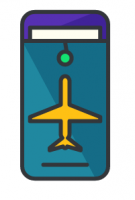
Example dialogue
Marie: Bonjour, est-ce que vous pouvez m´aider?
Paul: Bien sûr!
Marie : J´ai oublié ma carte d'embarquement. Qu'est-ce que je dois faire maintenant?
Paul: Vous pouvez vous enregistrer aussi ici, à l´aéroport.
Marie: Donc, j´ai un vol direct vers Paris et j'ai seulement des bagages à main.
Paul : Le bagage peut avoir 20 kilos maximum. Vous devez vous présenter à la porte 15 minutes avant l’heure du départ.
Marie: Merci beaucoup.
Paul: Merci à vous et bon voyage!
Marie: Good morning, can you help me, please?
Paul: Of course.
Marie: I forgot my boarding pass. What can I do now?
Paul: You can check in also at the airport.
Marie: Ok, so I have a flight for Paris and carry-on luggage.
Paul: The luggage can have 20kg maximum and you need to be at gate 15 minutes before the flight.
Marie: Thank you very much.
Paul: Thank you and have a nice trip.
At the bus station
Travelling with a bus can be another option. To complete this topic, check the lesson before about Asking for directions in French .
Marie: Bonjour, je voudrais acheter un carnet direction Versailles.
Paul: Le prix est de 10€, le trajet dure 2 heures.
Marie : Bien et pouvez-vous me dire l'horaire?
Paul: Donc, le car part à 10 heures et le terminus pour votre direction est le château de Versailles.
Marie: Merci beaucoup pour votre aide. Au revoir!
Marie: Good morning, I would like to buy a book of ten tickets for Versailles.
Paul: The price is 10 euros and the trip lasts 2 hours.
Marie: Good, and can you tell me the time?
Paul: So, the intercity bus leaves at 10 a.m. and the last stop for your direction is the castle Versailles.
Marie: Thank you very much for your help. Goodbye!
French hotel vocabulary
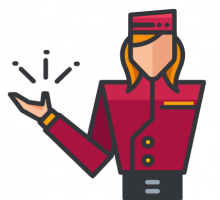
Paul: Bonjour, je voudrais une chambre à deux lits, qui donne sur la mer et pour trois nuits?
Marie: Nous n'avons pas une avec la vue sur la mer, mais il y a une au quinzième étage, aussi vous avez lnternet sans fil et la terasse.
Paul: Bien, et quand je dois régler la facture?
Marie: Vous devez la régler le dernier jour de votre séjour.
Paul: Merci et à bientôt!
Paul: Good morning, I would like a double room, for three nights and with a sea view?
Marie: We don't have one with a sea view, but there is one at fifth floor, with wireless internet and with a terrace.
Paul: Good, and when do I need to pay?
Marie: You can pay at your last day.
Paul: Thank you and see you than!
French shopping vocabulary
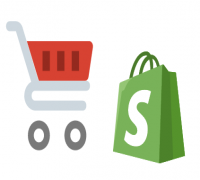
Exampe dialogue
Paul: Bonjour, est-ce que vous avez besoin de l'aide?
Marie: Oui, je cherche un souvenir pour ma soeur. Je voudrais acheter quelque chose d'utile.
Paul: Je vous recommande un chapeau ou un sac avec le signe de la ville.
Marie: C`est très bien, mais quelque chose bon marché s'il vous plaît.
Paul: D`accord, voilà un sac pour 10 euro.
Marie: Parfait, je l'achète.
Paul: Good morning, do you need help?
Marie: Yes, I am searching for a souvenir for my sister. I would like to buy something useful.
Paul: I suggest you to buy a bag with the city sign.
Marie: That's an excellent idea, but do you have something cheap?
Paul: Yes, we do, we have a bag for 10 euros.
Marie: Excellent, I am going to buy it.
Matching words: at the airport, at the bus station
Matching words: at the hotel, going to the shopping mall exercise, what our students say.
Unlike in other platforms, all our teachers are manually verified by our professional team. Trust in the experiences of our students.
Hi! My name is Krisztina! I’m a teacher of German and French with the corresponding qualifications. I've grown up in a bilingual family (Hungarian-German), so I speak both languages as a native language. I’ve been teaching for six years, so I’m able to estimate your needs, and to meet them. In my lessons, I recreat real life situations, so that you will be able to adapt yourselves to different circumstances. I’m a patient, positive and creative person, who is looking forward to see you in her lessons. So don’t hesitate to book a lesson with me.
Teaching methodology
Communication
Punctuality
Internet connection
Learning materials

I am very satisfied with my new teacher. Looks like I'm going to get French soon! Looking forward to each lesson. Krisztina knows many languages, which allows her to understand pronunciation difficulties and to remain patient. Hope to pass C1 one day!

Alessandra is a teacher of Italian, history and geography. She teaches in Milan as a substitute teacher. She participated in the Dante Alighieri teaching course in Milan and has Ditals level 1 certification. Her teaching method is based on the level of the student. Her motto is: teaching in a creative way. She uses the Dieci Alma edition to teach.
This review was written by a coLanguage team member during a manual screening of this teacher profile.

My name is Curtis Davies, I'm a native English speaker and professional language coach from Canada. I'm also the host of "The Real English Conversations Podcast". I’ve helped thousands of students improve their English skills since 2013, specifically with confidence, speaking fluency, and pronunciation to feel 100% comfortable communicating in English in any situation.
You can be sure that our lessons will be focused on the areas that you are most concerned about improving as we discuss interesting topics that you will enjoy talking about. Together, we can create a customized study plan that surely will help you reach your goals and finally feel good about your English communication.
I'm A personal trainer for English communication in Real-World situations. My lessons focus on helping you to improve your speaking fluency, pronunciation, confidence and to be prepared for everyday social interactions, casual conversations, communicating better in English at work, and even preparing you for an important interview or presentation.
What To Expect: Professional Help NOT just Conversation Practice
I'm a specialist that cares about YOU achieving your goals I will evaluate you first, then we work together as a team to create a FUN learning strategy or plan so 100% of your classes are exciting BUT focused on where you need the most practice and attention
Curtis is a Canadian teacher with years of experience in teaching English. He is a real motivator and with him, you will improve lesson by lesson and reach your goals. His teaching techniques and strategies are based on his years of coaching and experience. If you want an English motivator, Curtis is the ideal teacher for you.

I want to help people to improve the level of their chosen language.
I couldn't imagine a better teacher than Nancy! Together with Nancy you find the right method for you to improve your French in a fun and personal way. I would recommend her to everyone!

Hi! My name is Tiphaine, I'm french, I'm 37 years old and I live in Seville. I grew up in the outside of Paris, I travelled all over the world and I live in Spain for 10 years now. I'm a musician, a dancer and I love to cook and hike. I'm a french teacher, and it's my passion! I speak 3 languages, and thanks to my learning I was able to live amazing experiences in many countries. That's why I became a teacher, to be able to share with you my love for french language and culture and to guide you in your progress. For me, each language is a way of seeing and interpreting the world, as glasses of different colors. Understanding the way a language works is understanding how its people see things; it's such a exciting process, I can't wait to share it with you! I have more than 8 years experience, in schools, companies and universities. I work with people from all ages, beginners to advanced. I know most of french manuals. I can prepare you to DELF and DALF exams. I also have a specialization in french for specific goals and french business. I can offer you thematic courses, to improve your pronunciation, increase your vocabulary, prepare you for traveling or for a new job. All my classes are in french, I adapt my vocabulary and speech speed according to your level. I also adapt my method to your needs, personality, to take the best advantage of my classes and your french learning. I use diversified ressources, from quizz to podcasts, videos, songs and games. Whatever are your motivations, if you want to learn french in a pleasurable and rewarding way, book a class with me!
The strategy of Tiphaine is simple but very effective. She assess each students by understanding their needs and goals first. What I enjoy most is I get to speak french with her more than I did in my other french classes. She also give life advices on the side. :)

Hi, I am Christin!
After training as a pastry chef and studying business administration, I traveled a lot and discovered my interest in languages. To find out more about teaching languages, I decided on further training at the Goethe Institute and completed it. During the Goethe Institute "Learn to teach German" course I was able to give individual language lessons and actively support the examination preparation for the Goethe certificate.
My lessons are needs-oriented. That means that learning goals are discussed with you and based on your level of knowledge. Whether grammar, sentence structure, pronunciation, expression or the practice of communication situations: German as a foreign and second language classes are flexible and take place in a group or one-to-one lessons with individual support and are based on your wishes and requirements. The teaching of content and topics takes place according to the respective language level. Building vocabulary, grammar and means of speaking are structured and conveyed logically building on each other. Let's get to know each other in a free trial class. I am looking forward to meeting you!
Christin is a committed and professional German teacher with experience in teaching German face-to-face. Her teaching methods include setting learning goals with her students and giving continuous feedback. Her activities are guided by a communicative approach and she tries to teach her students german vocabulary for everyday life.

I am a professional English tutor with online teaching experience. In my class, you won’t need to memorise long lists of vocabulary. Instead, we will discuss interesting topics and practice language that you want to learn. With my artistic background, I can create creative and fun lessons suited to the student's learning goals. I like using colorful PowerPoint slides, flashcards and videos to demonstrate my learning points. I am a friendly, patient person, because I know that learning a new language can sometimes be very scary. My classroom is a safe, comfortable space that encourages mistakes, because this is the best way to learn. I am creative and use music/dancing where possible to re-energize my students. This makes learning the subjects you don't enjoy, fun, as we may sing songs that target grammar structures or vocabulary.

Savannah is a wonderful and lovely teacher; thanks to her I was able to pass an important exam. She can understand your needs and suggest you how to improve your skills She is an understanding person and is able to make each lesson interesting and pleasant , focusing on useful subjets I think she is perfect for both adult and young students. In addition, having South Africa and Europe the same time zone, it makes convenient and easy to schedule lessons!
Savannah T. Thank you so much Elena. It was such a pleasure to teach you. You always had so much to say so our lessons were always fun. I am so proud of your accomplishments. Well done!
I am Diane a language tutor that has been helping students of any age and race and I am also a TEFL certified instructor. Since I am a native Filipino Speaker, I can teach my students conversational Tagalog which includes 1 grammar rule per lesson and pronunciation as well as vocabulary to enable them to communicate with people when they travel to other places or simply with people not from their country. Aside from conversations, we will talk about our culture, cuisine and tourist spots. When I teach I use role play, dialogue, games, Audio/video files and the like which will engage my students well.

I am a multilingual teacher with experience in teaching French to German, Japanese, English, Bulgarian and Italian-speaking students, etc. (levels A1 to C1).
I have been teaching French for 8 years in Luxemburg and now in Bulgaria for 4 years, to teenagers, housewives, businessmen, employees, doctors, etc. I can also help you with DELF and DALF preparation. I give lessons via Skype, Zoom and Microsoft Teams in several countries.
My teaching method for each class : a grammar point together with listening, a lot of speaking with conversation questions or games. While you speak, I write all the new words you need to express yourself, illustrated by pictures or translated in your language.
I do my best to make you feel comfortable to speak and for you to have a pleasant time. According to me, using humour will help you learn more easily.
Whether you need to learn French for business, integration in a French-speaking country or studying, I will be happy to help you. Do not hesitate to contact me for a free trial lesson.
Looking forward to hearing from you,

I am really excited about Katia as my teacher. I think she is a very good teacher. And a nice person too. She customise the lessons according to my wishes what i would like to learn. She is very experienced with skype. It all runs very smoothly. I am looking forward to the next lessons and i highly recommend her as your teacher. Miriam

Virginie is the best French teacher I ever came across. She has been a great help in preparing for DELF B1. Her clear method of explaining helps me understand and retain the grammar rules. She is very patient and her calm personality removes my anxiety and puts my mind at ease. I highly recommend her and thank her for the wonderful learning experience.

Hello, My name is Tiska. I am a French Teacher with experiences with adults and teenagers in Public Education (USA) and Language Schools. I am holding a Master Degree in FLE (Teaching French as a Foreign Language).
Join a small group of learners of 2 or 3 for conversation lessons with me. An article or video to watch before the lesson and a conversation with personalized corrections during the lesson. This option saves you at least 10 euros per lesson on Colanguage. Group opening: Monday and/or Wednesday from 17:30 to 18:30 (French time). Level: intermediate (B1)
Also, standard French lessons - level A2 (low intermediate) - 2 hours a week - ask for schedule
Don’t know your level? Ask for a free level test.
I give Skype lessons to people who need or want to improve their French language. I like to use material from the internet (videos, article etc.) to introduce a theme which leads to a lesson and a conversation. I like to create engaging learning with my students. I will give as homework a document to watch or to read with comprehension exercises so the time we have on skype is only speaking practice and explanation if needed. I can help you prepare DELF-DALF Exams or work on specific needs (as professional French). Really like to speak about all the subjects with the student especially those the student like so it gives the motivation to speak in the foreign language. The free first lesson is organize to know your tastes, your level and your needs so we can plan the next lessons about the objectives you fixed.
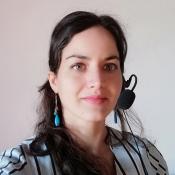
Bonjour! Veux-tu apprendre français? ou l'améliorer? My classes are structured according to my students' needs, I use different teaching methods and I rely on listening each of my students' expectations and goals. Dynamism and constant learning are my purposes in my classes.
I have worked as a French teacher for more than ten years. I have academic studies in English and French from Montréal, Canada, where I lived for several years. I have a Bachelor in Teaching French as a foreign language from the Université de Bourgogne.
I learned French at an early age in immersion in a French-speaking region and I studied French formally for 11 years, obtaining a native level.
Natalia will be really interested in you as a person, what your goals are, and motivation for you to learn the language. I liked how she was answering all my questions, were patient and positive on our lesson.
Natalia L. Toma, your interest for the language and having learned other languages before will be very helpful for you, continue with your motivation for learning French!
I am a graduate of Bachelor of Secondary Education major in Social Science. I am a holder of a Professional License as Teacher. I have also teaching certificates like TESOL and TEYL. I have 2 years teaching experience as ESL Teacher. I can make our class fun and engaging. Come, let's learn English together.

Hi and welcome ! Preparation for exams, desire or need to learn and improve your level. Real lessons or discussion experiences, for all levels and all ages. Total customization according to your needs, your desires, and of course your level. We will talk about this in our first lesson together.
So let's prepare together your exams, your job interview, your next vacation, or maybe to speak the language of the chosen one of your heart...
We will work on short texts, videos, or just sounds to improve your comprehension, then it will be your turn to produce orally and in writing, and of course by both speaking. Together, we will therefore do written and oral exercises, to improve your vocabulary, your grammar and your conjugation, and your accent.
I invite you to watch my subtitled presentation video, in English, then in French. (2 min in total)
Don't wait any longer to book your trial lesson !
Who am I ? I am a former parliamentary assistant to French deputies, and communication teacher. But I wanted to change my life, I am now a scuba diving instructor, currently in Bali, Indonesia.
Pedagogue, patient and organized for a deserved result considering your efforts. I am used to teach and a lover of the French language.
See you soon for your first lesson together, that's your job !

Cédric has been an excellent teacher for our first couple of lessons. He is thoroughly trying to assess my level to make sure that we get the most out of our lessons. I am excited to continue my learning with him!

Beatrice is specialized in teaching Italian for all levels. She has language certificates from DITALS for Italian and CELTA for English. Other than her knowledge of the Italian language, she can also speak English, and Spanish. Her multilingual skills allow her to offer the students a chance for better communication during her classes. Beatrice’s teaching method depends on what fits your level. In her, you will find a well-prepared, expert, and friendly teacher. She relies on several books for teaching the Italian languagen, like: Dieci, Nuovo Contatto, Domani, Progetto Italiano, and Nuovo Magari. With Beatrice, you'll learn faster than you can imagine!

Become a teacher
Teach your favorite language. Anywhere. Anytime.
Take language lessons with a native teacher
Request a free trial lesson with a teacher of your choice!
101 Basic French Words For Travel In France
Are you planning your trip to France but feel nervous about actually speaking french among the natives? Do not worry. We made a special guide for you to help you during your trip!

Samuel Bonne
Although France lies next door to England, a native English-speaking country, you may not always be able to get by with speaking English, especially if you wish to immerse yourself in the culture or walk around the French suburbs. So, before you plan a trip to Metropolis, it's a smart option to brush up on some fundamental French terms and phrases.
Learning a few introductory greetings and courteous phrases in the mother tongue will make the most of your trip and facilitate your interactions with the locals. Even if speaking the language isn't your forte or you're not too confident, this guide below will help you speak french like a native .
Below are a few that will allow you to communicate and will surely make your vacation worthwhile.

Why Visit France
France has been on each one of us's bucket list. Why not? It is known as one of the most beautiful spots on the planet.
Every tourist will find that the country has a lot to offer. Whether you've come to learn about the city's rich culture and history through its museums and architectural marvels, or you've come on a romantic trip with your loved one in, you guessed it! The City of Lights, Paris, la France has something for everyone.
Paris, as well as Bordeaux, Lyon, Cannes, and Nice, France is known for its magnificent cities and luxurious lifestyle that will certainly capture your heart. It is home to world-famous art and movies; museums such as the Louvre and the Cannes Film Festival , as well as films such as La Vie en Rose and Amelie. Moreover, learning french through art and artists is a fun and engaging way to understand the language.
It should come as no surprise that France and fashion are sides of the same coin, hence prepare to see many shopping centres and boutiques around the region. It had to be, given that it is the birthplace of some of the world's most well-known fashionistas, like Yves Saint-Laurent, Christian Dior, and LVMH.
It's also famed for its delectable cuisine, scenic towns, outdoor sports, and, most importantly, its love language, le français. So, even if you can't fly to this lovely nation just yet, you may begin to feel a connection by growing your French vocab and develop your accent right now!
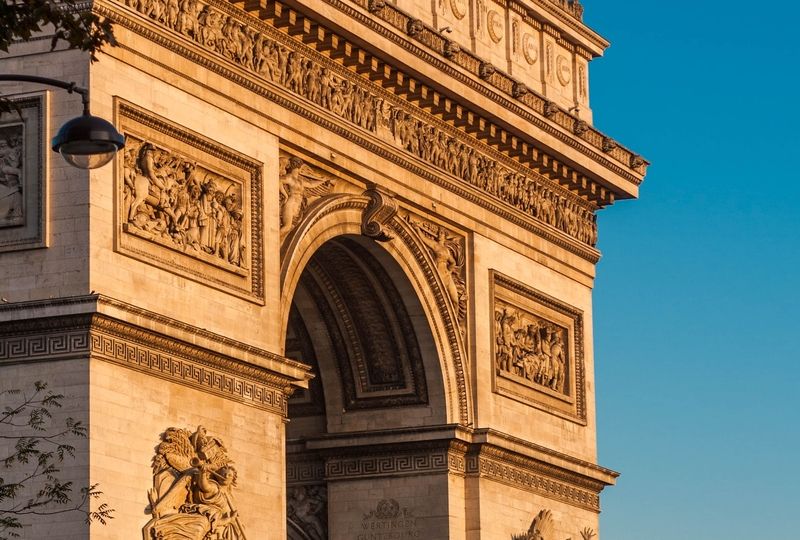
Basic French Phrases To Visit France
Learning to approach people respectfully in French is the very first step toward feeling at ease in France. It will also enhance the level of service you receive and your interactions with the French overall.
Male and female expressions are generally different, just as there are various definitions of greeting in French depending on how well you know someone.
There are often articles associated with every word, be it an object, a material or a person; they are categorised into masculine and feminine . You can use le (the)/ un (a) for a masculine noun like un garçon means a boy. Likewise, you use la (the)/ une (a) for a feminine noun like une fille means a girl.
Similarly, when speaking to someone you know or addressing a child or an animal, you can say 'tu' , which means you. However, you must use ‘vous’ while speaking to strangers, authorities or your seniors. It is a far more polite and formal way of addressing someone. Remember, it's usually safer to use ‘vous’ as a general rule.
To start a discussion, here are some simple French words and phrases to use:
The Basics Phrases You Need To Know
Common courtesy is fairly serious among the French, so whether you're meeting someone for the first time or conversing with a stranger, it's key that you address them correctly and with the appropriate expression.
Bonjour : Good morning/ Hello Do not forget to say bonjour as you enter a shop or start a conversation with someone!
Salut : Hello (casual way of saying hello)
Bonsoir : Good evening
Monsieur/ Madame/ mademoiselle : Mister/ Madam/ Miss
S'il vous plaît : Please
Merci/ Merci beaucoup : Thank you/ Thank you very much
Excusez-moi/ Pardon : Excuse me Pardon is an informal way. You can use either if you bump into someone or make your way through a crowd.
Au revoir : Goodbye
Bonne journée! : Have a good day!
Je suis désolé(e) : I'm sorry (an e is added if you identify as female)
Making Yourself Understood In French
It is important to make yourself understood if you are a tourist and you are not familiar with the language. Je is used as a subject and it stands for I.
- Je ne comprends pas : I don't understand
- Je ne sais pas : I don't know
- Parlez-vous anglais? : Do you speak English
- Je ne parle pas français : I do not speak French
- Je parle un peu français : I speak a little French
- Répétez, s'il vous plaît : Repeat please You can say this when you have not understood what has been said or if the person might have spoken too quickly, you can say:
- S'il vous plaît, parlez lentement : Please speak slowly
Introducing Yourself In French
- Je m'appelle ... : My name is ...
- Quel est votre nom? : What is your name?
- Comment allez-vous? : How are you?
- Je vais bien, et vous? : I am well, and you?
- Je viens de ... : I come from ...
- Enchanté(e) : Pleased to meet you (an e is added if you identify as female).

Transportation Words In French
The transit system is usually the main mode of transport in the country, connecting the big cities so you will have no problem travelling from one end to the other.
Prices vary over distances and it is a fast and comfortable option. You can even travel within as well as to neighbouring countries. You might need to know certain terms to be able to get your way through!
Le bus : the bus
Arrêt de bus : Bus stop
Un taxi : a taxi
Je voudrais partir à la gare : I would like to go to the bus/train station
Train : Train The high-speed train of France is called Train à grande vitesse (TGV) , you can simply say TGV.
Le Métro : Subway
Un Avion : Airplane
Une Voiture : Car
Un Billet : Ticket
Le Guichet : Ticket window
Quelle est l’horaire? : What is the schedule?
L'aéroport : Airport
La gare : Bus/ train station
Directions Phrases In French
- À gauche : To the left.
- À droite : To the right.
- Tout droit : Straight ahead.
- Où sommes-nous? : Where are we?
- C’est loin/près d’ici? : Is it far/close by?
- La Sortie : The exit
- Nord : North
- Sud : South
- L'Est : East
- L'Ouest : West
- Là-bas : There
Places Or Accomodation Terms In French
As you explore the country, you should have an idea of what certain places are called so that it's easy for you to maneuver around.
L'hôtel : Hotel
L'auberge : Hostel A hostel is usually cheaper than a hotel but you have to make sure that they are accessible and clean.
J'aimerais faire une réservation : I'd like to make a reservation
Je voudrais une chambre pour deux : I would like a double room.
À quelle heure est-ce qu’il faut régler la note? : At what time should we check out?
La plage : The beach
Les Magasins : Shops
Centre commercial : Shopping mall
L'église : Church
L'ambassade : Embassy
La poste : Post office
Le supermarché : Supermarket
La pâtisserie : Pastry shop
Asking For Help In French
As a foreigner, it is essential to learn how to ask for help if ever you find yourself in trouble, face an emergency situation or simply having issues in finding something. Keep reading to know how to deal with such circumstances!
- Je cherche : I'm looking for
- Où est : Where is... You can say either followed by the thing or place you might be looking for.
- Où sont les toilettes? : Where is the restroom?
- Où est l'hôpital/ la pharmacie? : Where is the hospital/ the pharmacy?
- Aidez-moi : Help me
- Je suis perdu : I'm lost
- J'ai perdu ... : I've lost..
- J'ai perdu mon porte-monnaie : I've lost my wallet
- J'ai mal au cœur : I feel sick
- Appelez une ambulance : Call an ambulance
- Appelez la police : Call the police You might be able to properly explain yourself to authority figures as they usually understand English.
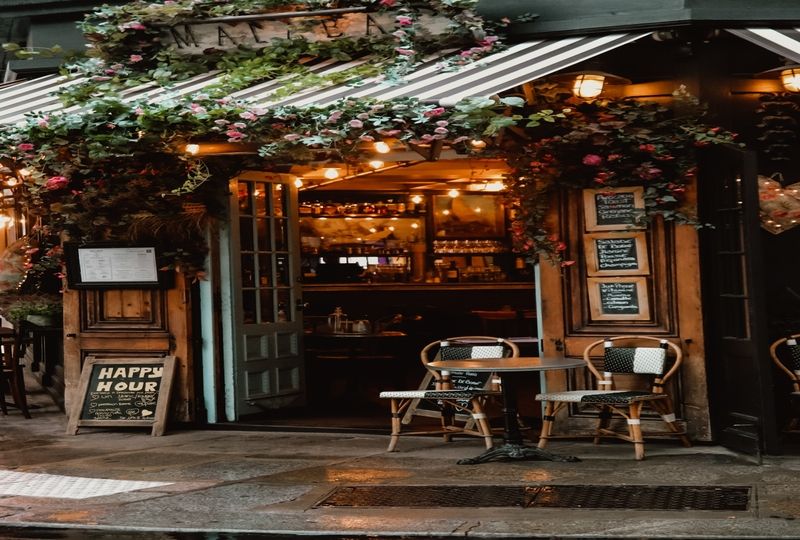
Food And Ordering In Restaurant In France
Home to one of the most popular cuisines, France will surely make your mouth water with its myriad choice of cheese and pastries, not to forget its unique dishes! However, most menus are not offered in the English language, so a few basic culinary vocabulary will make your dining experience more fun. Moreover, you can also learn french by following french recipes yourself!
Le menu, s’il vous plaît : The menu, please.
Quels sont les plats du jour : What are today's specials?
Je suis allergique à ... : I'm allergic to ...
Options végétariennes : Vegetarian options
Je prendrai : I'd like
L’addition : The bill
Est-ce que le service est compris? : Is the tip included? You should remember that tipping is not a common practice in many restaurants.
C’est trop bon! : This is so good!
Le Pain : Bread
Un Fromage : Cheese
La viande : Meat
Drinks Words In French
La carte des vins, s’il vous plaît : The wine menu, please.
Un verre de vin : A glass of wine You cannot visit France and not try a wine collection!
Du thé : Tea
Un café : a coffee
Une bière : a beer
Du jus de fruit : Some fruit juice
De l’eau : Some water
Boisson pétillante : Fizzy drink

Money Terms In French
If you are travelling to France, you are bound to use some euros to enjoy your stay. What better way to start understanding money terms in french than now!
Billet d'argent : Notes
La monnaie : Coins
Combien ça coûte? : How much does this cost?
Je voudrais payer en liquide : I would like to pay in cash.
Acceptez-vous les cartes? : Do you accept cards? It is important that you inquire before paying as many small restaurants do not accept cards. It is also a wiser option to carry cash with you.
Je vous dois combien? : How much do I owe you?
C'est trop cher : It is too expensive
La banque : The bank
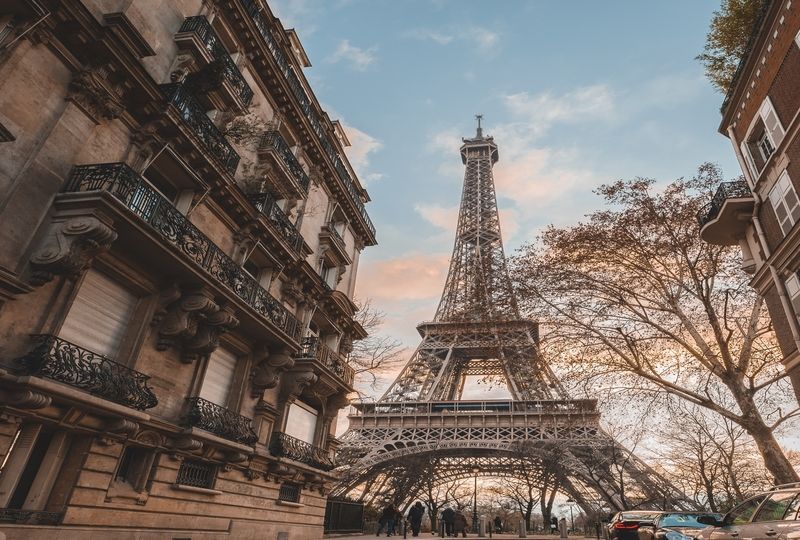
Best Places You Need To Visit In France
A vacation to France will keep you busy with all the wonderful activities available.
Since you made it this far, we added 5 more beautiful places to visit in France along with their gorgeous names.
La tour Eiffel : The Eiffel tower One of the must-see locations in France is surely the Eiffel Tower , a real and amazing structural masterpiece. You can mount the Tower and look down on beautiful Paris.
Bordeaux : Bordeaux If you are a wine enthusiast, you may tour the winery in Bordeaux , which is also a city full of history and art.
Le Musée du Louvre : Louvre museum The Louvre, which houses the Mona Lisa, has some of the most renowned works of art in contemporary history.
La Cathédrale Notre-Dame de Paris : Notre-Dame de Paris cathedral Notre Dame Cathedral is a Gothic architectural marvel and one of the most amazing tourist sites you should see.
La plage de Saint-Tropez : Saint-Tropez beach You may also choose between the captivating beaches of Saint-Tropez and the ski resorts of Chamonix , or you can simply do both.
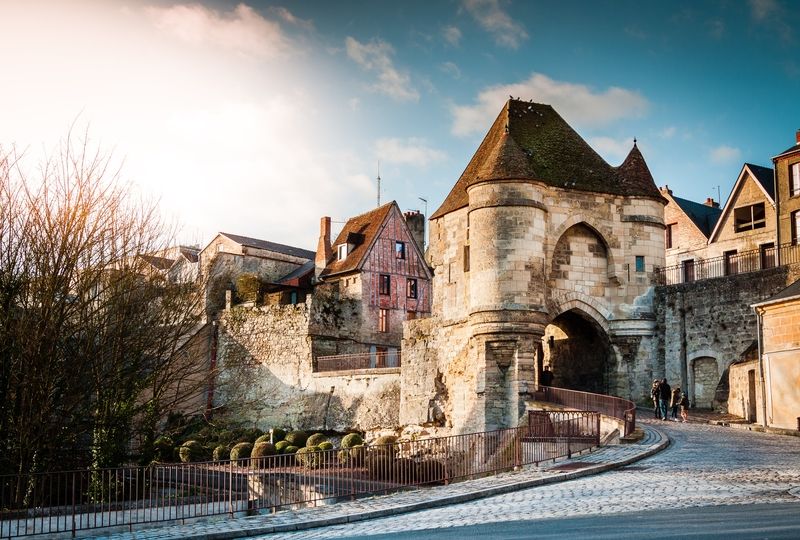
Now, Up To You To Practice You French!
Now that you have an idea of what le français consists of, it is time for you to practice saying these words. You can also improve your french with the tools that Speechling provides.
Remember as many as you can to make the most of your next trip to France!
Speechling is a nonprofit app and website that combines human coaching with technology to improve your foreign language speaking.
Real French for Travelers
On your own schedule. at your own pace..
Real French for Travelers Complete Online Course gives you that freedom. Learn from someone who’s been in your shoes, not from a corporation. It’s easier than you think, especially with short, clear videos that’ll show you exactly how to say things and what it all means.
Choose among three options: the complete course, just the Foundations (Part 1) , or Situational French for Travelers (Part 2) to go deeper.
Why learn French?
(it’s easier than you think.).
You won’t have to ask, “Do you speak English?” anymore, and won’t that feel good? (You’ll love it. And feel proud of yourself.)
You’ll do things differently than your fellow tourists because you’re making the effort to learn like an insider. You don’t need to be fluent to do this. You can learn a basic French framework then build as you go. Step-by-step.
What’s even better than a phrasebook?
Real French, that’s what.
Get the complete course or just the first (or second ) half.
Scroll down to access two free sessions!
It’s the closest you can come to learning French in Paris.
(Café au lait not included …)
With real French, you KNOW what you’re saying, and others do, too. You can BUILD on what you learn because it’s real French. Real grammar. Real vocabulary.
Real. Isn’t that better? Especially when it comes to communicating with other people.
Read road signs and menus, ask for directions, ask for help if you’re lost or have a problem, or even strike up a simple conversation with a French person. (By the way, they love it if you make the effort to learn their language. You’d feel the same way.)
Real French for Travelers: The complete online course. Or the basics. Or Part 2, if you’ve had some French. Whichever you choose, it’s yours to keep. Review, practice, and master (all for the price of about 4 lessons with a private tutor) in as little as 8 weeks.
Unlike other French programs, it’s designed specifically for travelers.
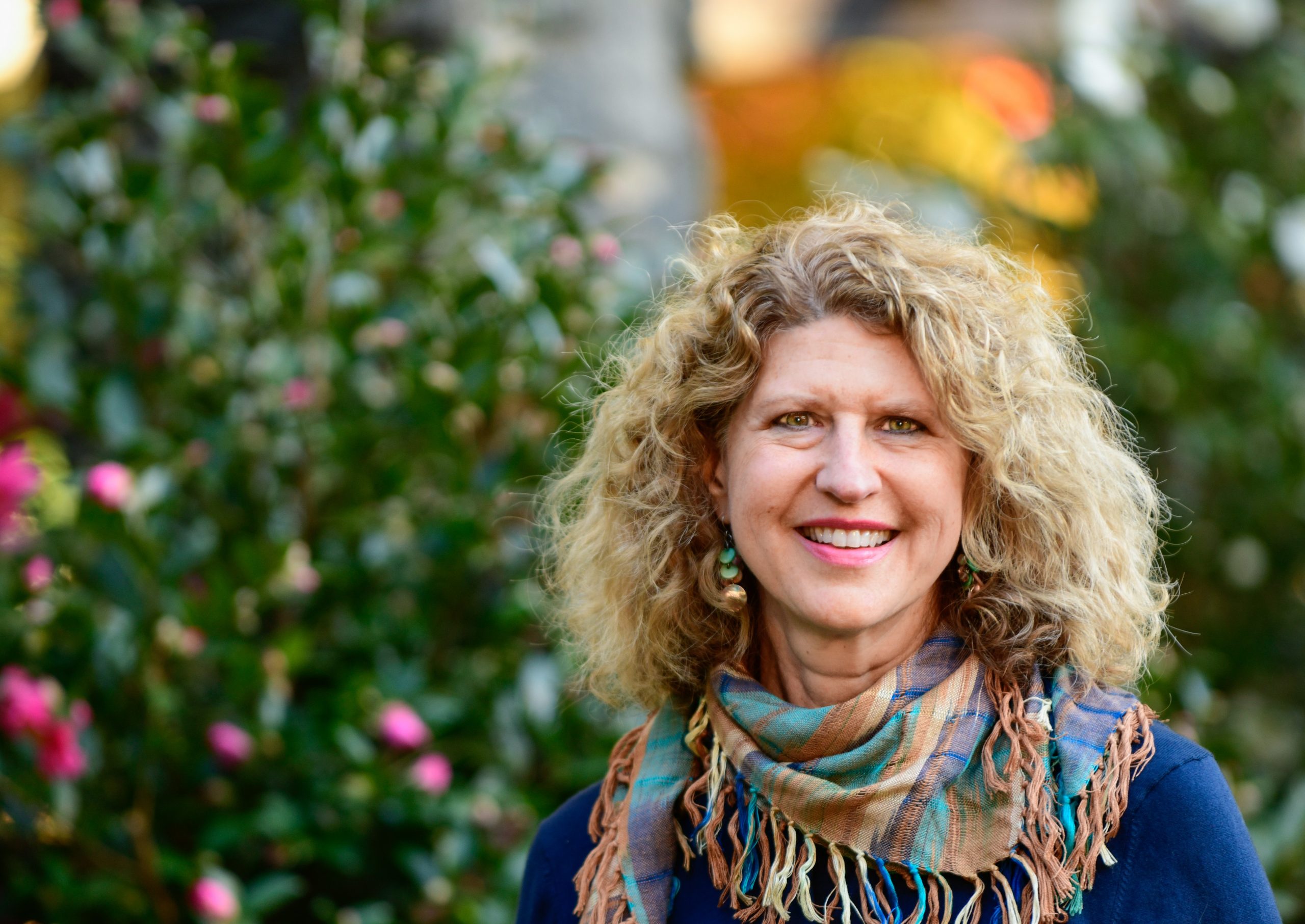
I’m Kyle and I’ll be your teacher for this course.
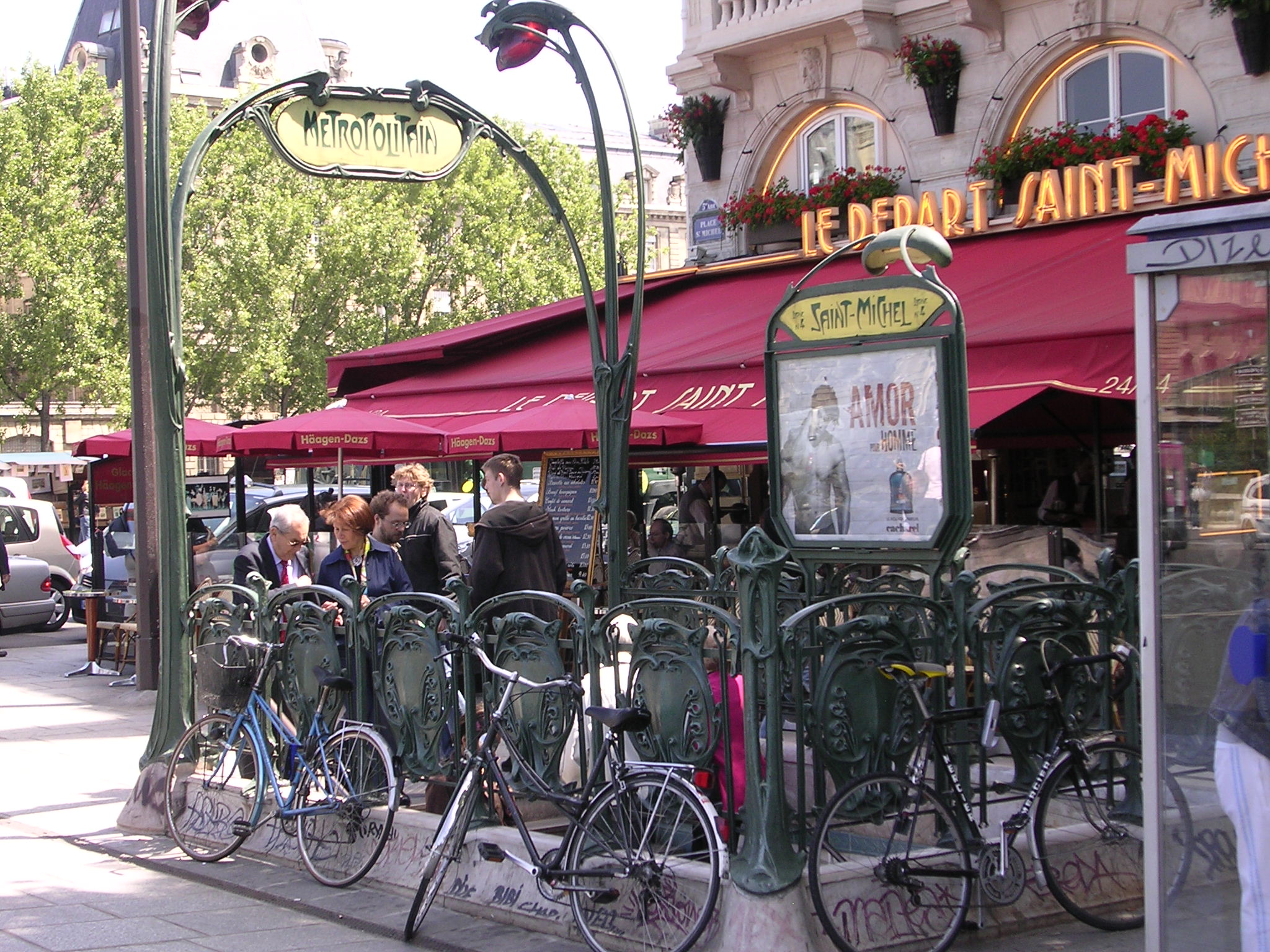
Real French in short, clear lessons. No intimidation here.
A course for travelers..
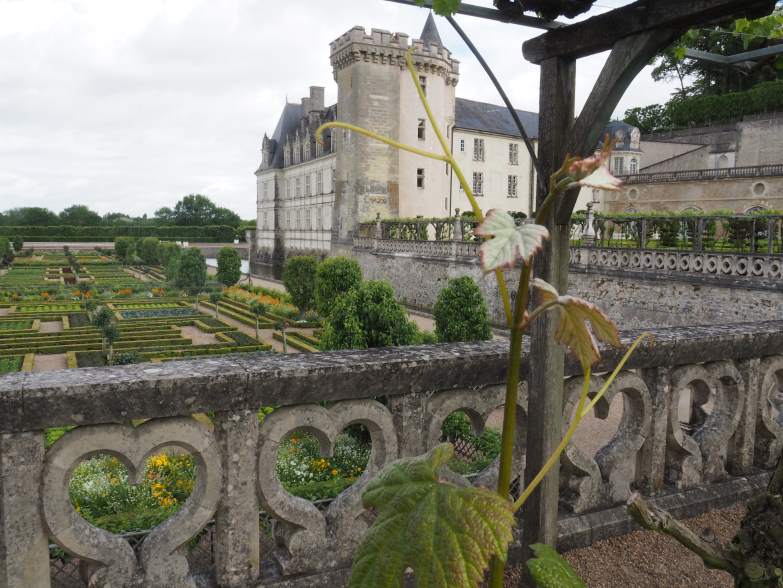
Real French for Travelers Complete Online Course
Includes: , clear, concise videos from zero to past tense. (42 in all), travel-oriented vocabulary covering a variety of situations, dialogues of realistic travel situations, downloadable reference (cheat) sheets, exercises for mastery with answer key, helpful travel tips throughout the course, quick-start phrases after each section give you a head-start in communicating, exercises to help you in listening comprehension, comprehensive pdf workbook that accompanies the videos, full 30-day money-back guarantee if you’re not happy with the course.
What students say
“ Real French for Travelers” online training is excellent! This training provided the right topics at the right pace for me to learn French.” -Cris L.
“i’ve tried a few other resources, but this one was the most comprehensive and easy to follow for a beginner. it’s well laid out, the workbook and exercises are helpful, the pronunciation is clear and easy to repeat, love the vocabulary cheat sheets and travel tips.” -shanna b., “ i highly recommend this teaching platform for beginner as well as advanced students. it can also be an excellent refresher for those who have not studied french for some time. this course will make your visit to paris much more enjoyable without the angst of not having years of french study. bon voyage” -julia w ..
For questions about the course, write to: [email protected]
www.Oliversfrance.com
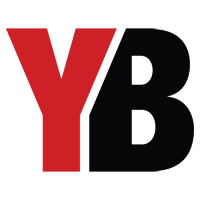
25 places other than France where speaking French is helpful
Posted: August 5, 2023 | Last updated: August 5, 2023

Speaking another language is always helpful, especially if you love to travel. And French, commonly thought of as one of the most beautiful in the world, is also more useful than you might realize. Here are 25 destinations outside of France where you can put your French language skills to good use!
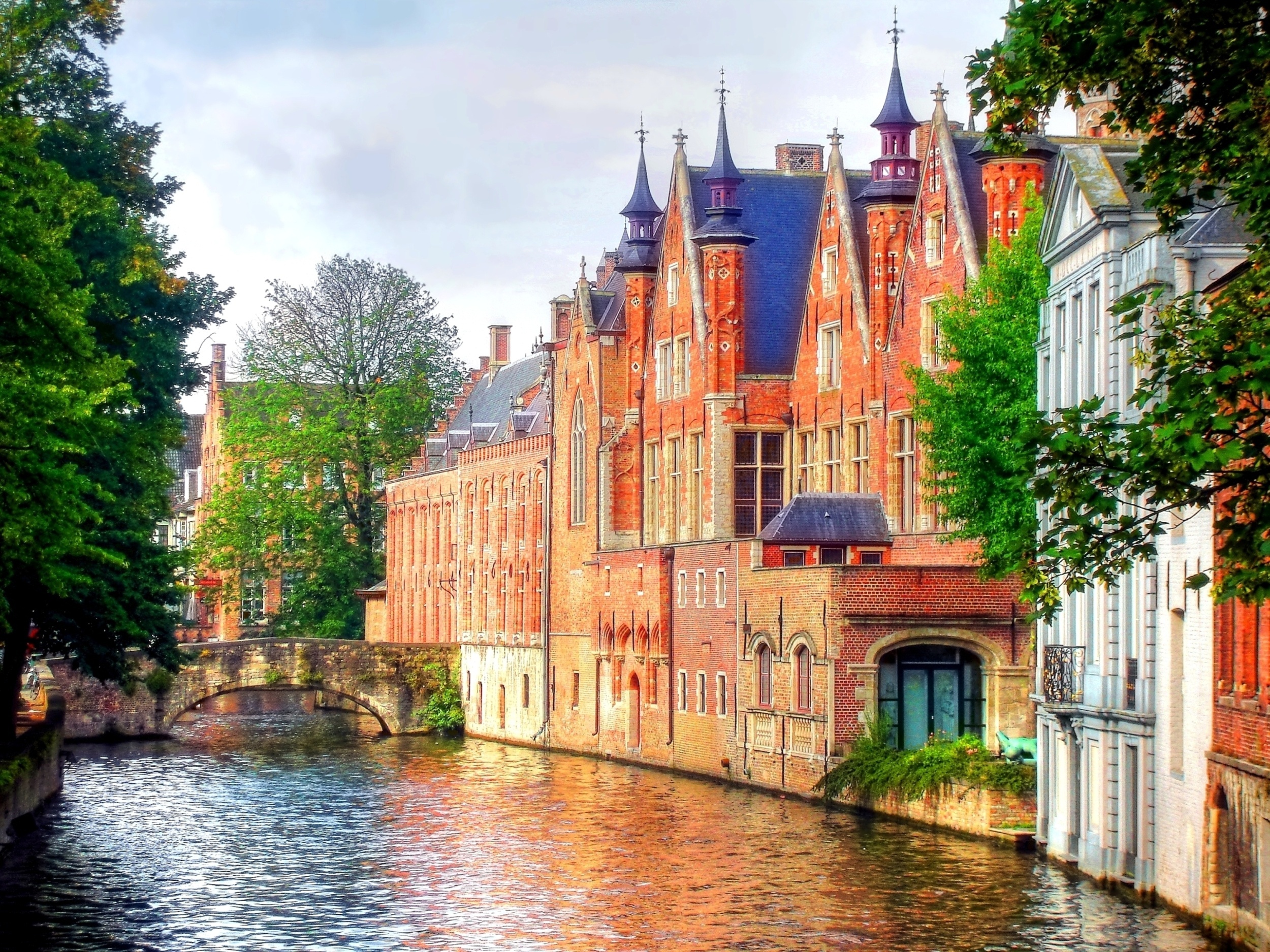
Home to delicious beer, chocolate, waffles, and fries (no, they actually didn’t originate in France), Belgium is also a French-speaking country. The language is one of three officially spoken in the country; the other two are Dutch and German. French is mostly spoken in the capital, Brussels, and in the south of the country.
You may also like: 15 weird & wonderful roadside attractions in the United States
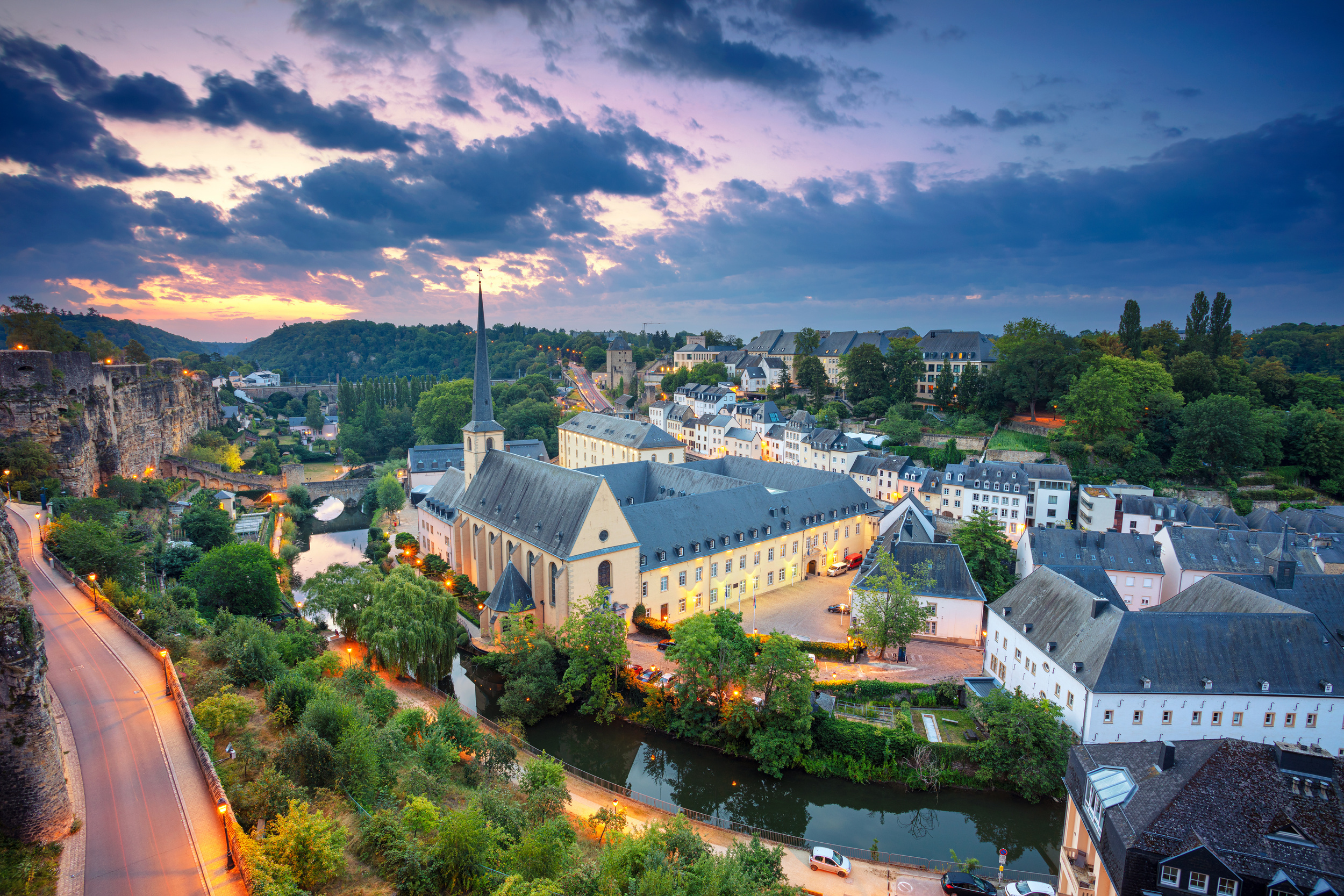
Another multilingual state that borders France, the Grand Duchy has French, German, and Luxembourgish as official languages. However, French is one most commonly used on signs and in written communication in the country. You’ll also find it most helpful for small talk and chatting with residents.
Follow us on MSN to see more of our exclusive lifestyle content.
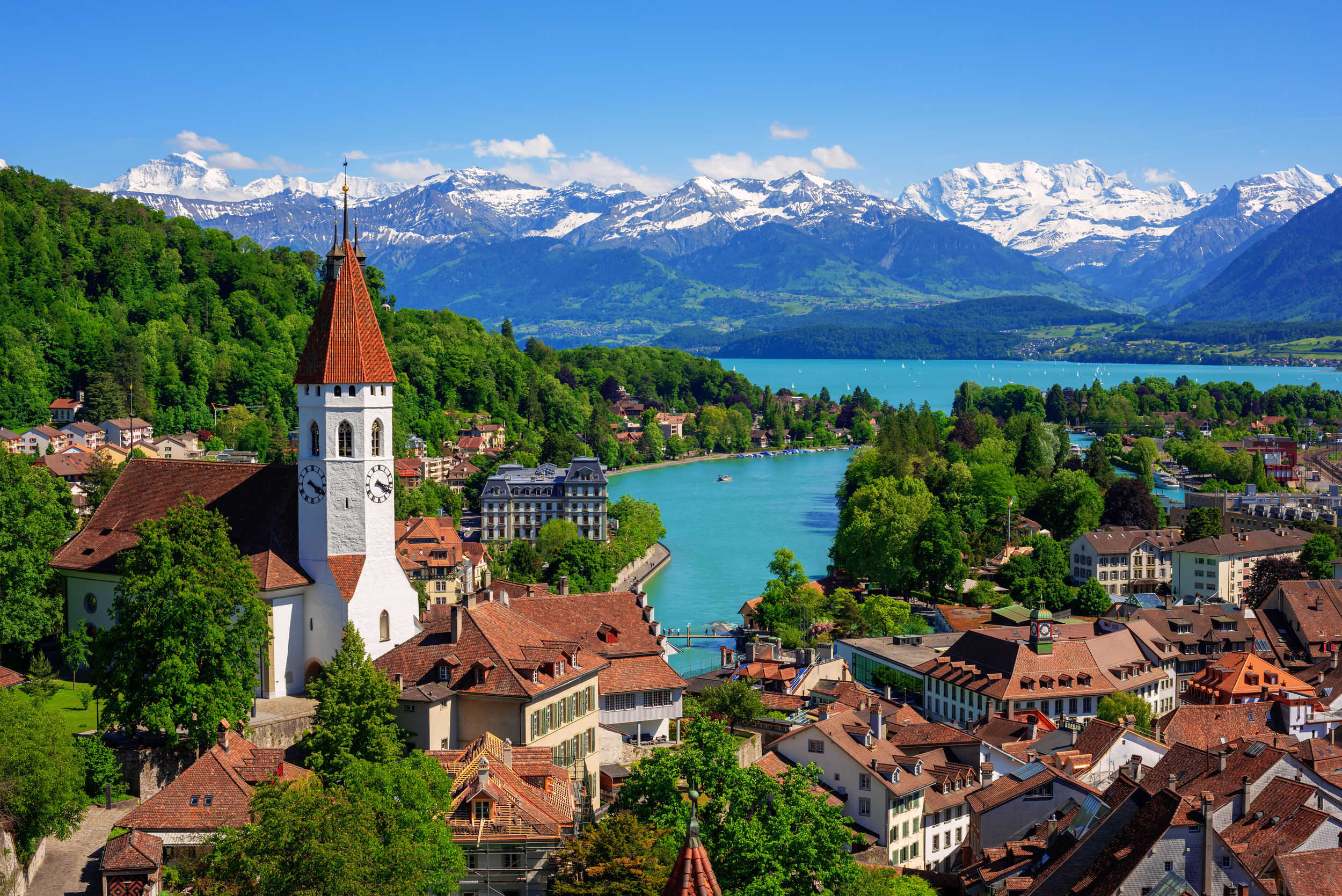
Switzerland
Yet another European country with French as one of the official languages (the others are German, Italian, and Rhaeto-Romance). You’ll find French most useful in Geneva and the surrounding area, although it’s used throughout Switzerland.
You may also like: 20 English words you might not know came from other languages
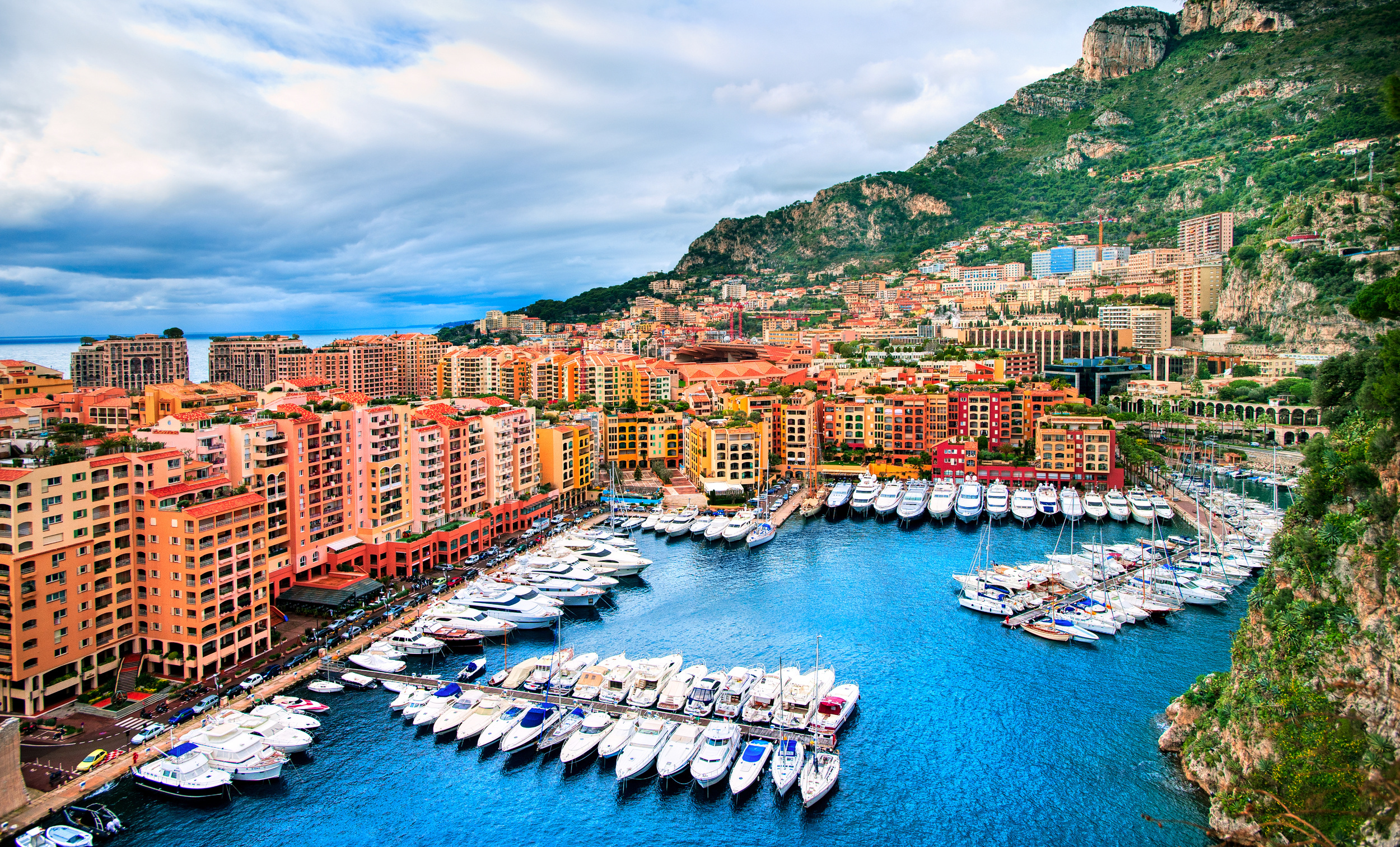
Many people make the mistake of assuming that this tiny state is a part of France. And while Monaco is surrounded by its’ much larger neighbor and uses the French language, it is a sovereign city-state with a monarchy. There is also a Monégasque language that has official status.
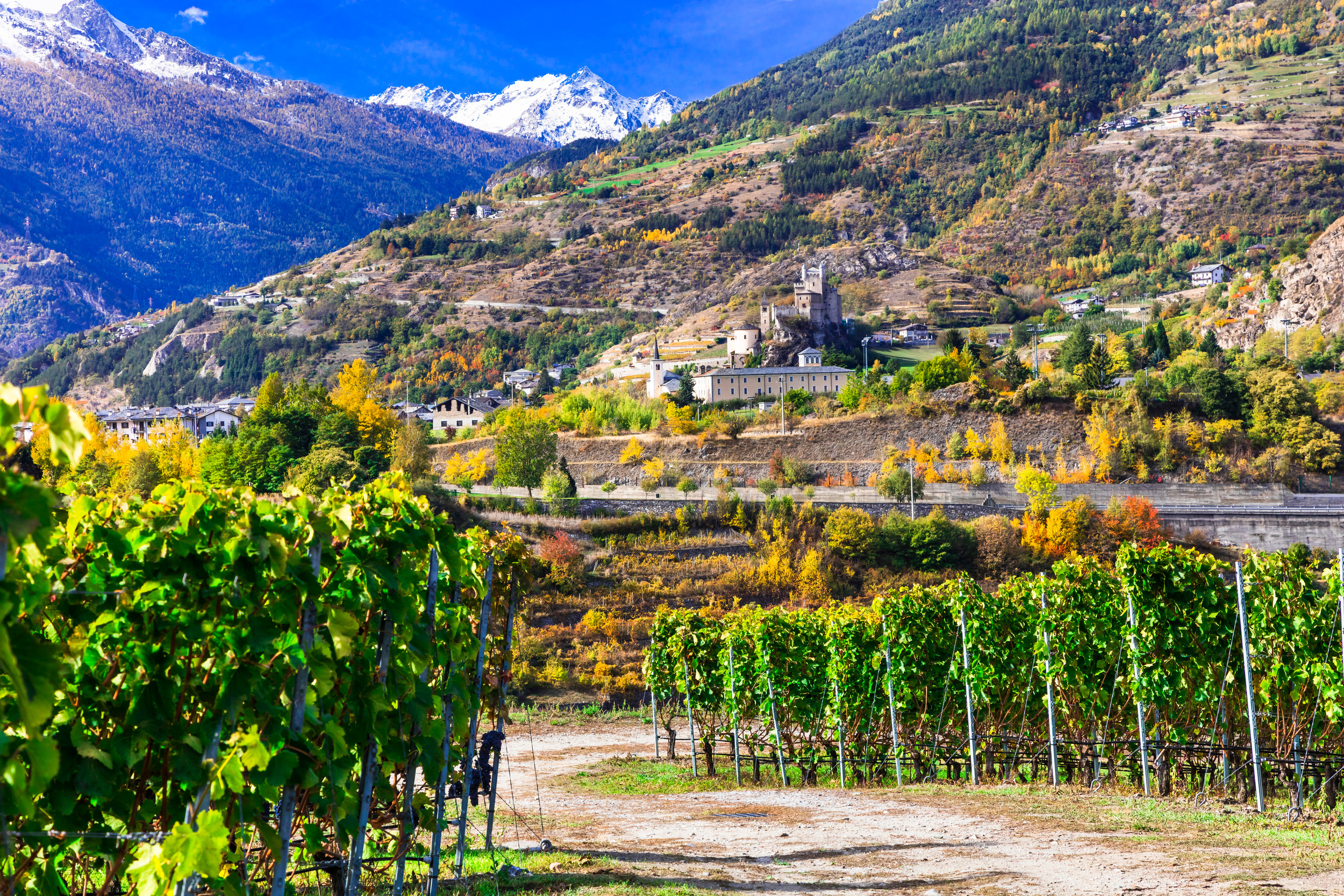
Aosta Valley
This region of Italy is located in the northwest of the country, near France. Latin was replaced by French as the official language after the fall of the Roman Empire and then, in the 19th century, was replaced with Italian. Today, the region is bilingual, and you’ll see French and Italian written on road signs and hear the two spoken by locals.
You may also like: 15 scenic train rides across Europe
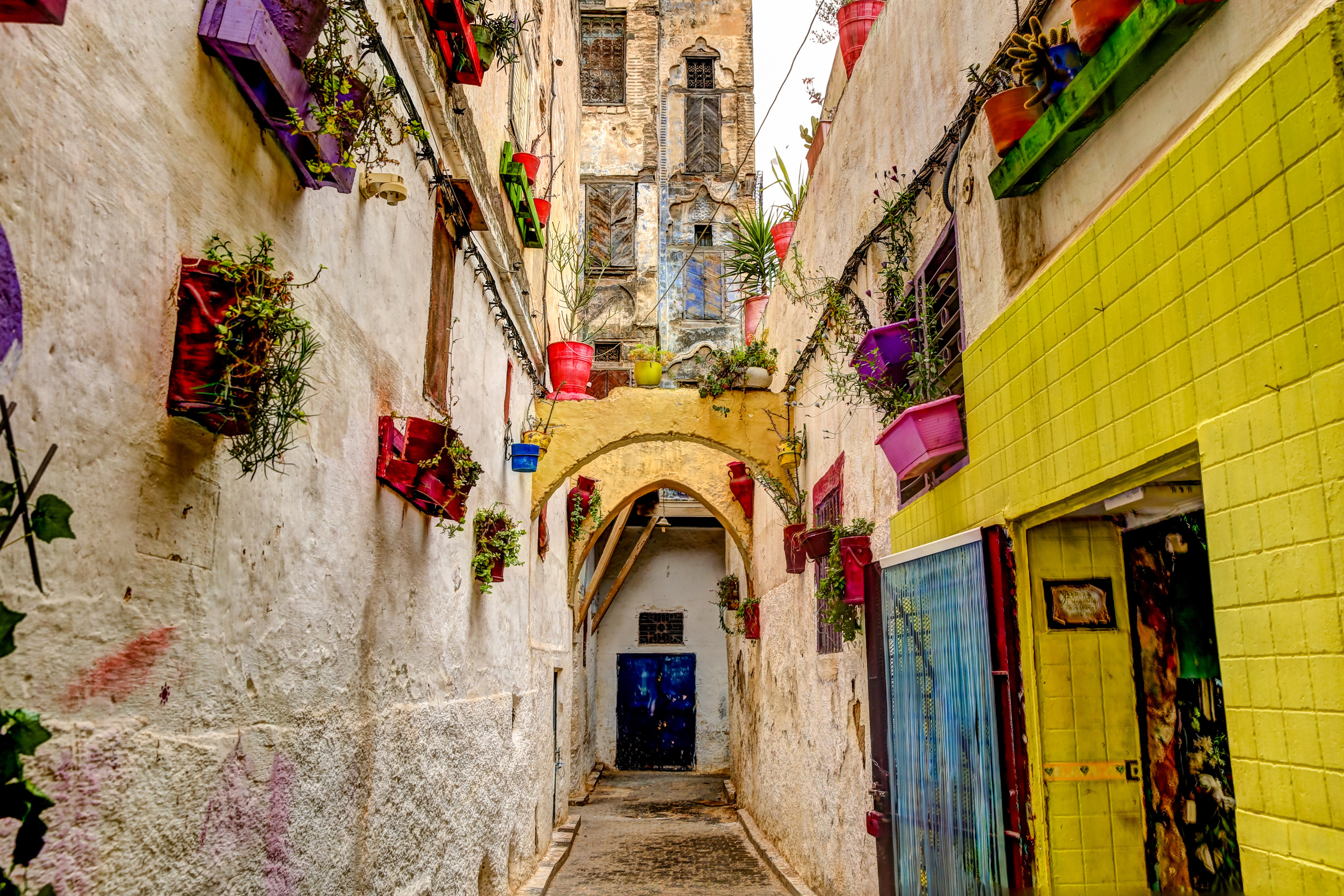
The French Empire had a strong presence in North Africa, and thus many nations in the region still use French as an official language. Morocco is one of these, and French is widespread along with Arabic and various Berber dialects. As a visitor, you’ll find it extremely useful when speaking to locals or reading signs and menus.
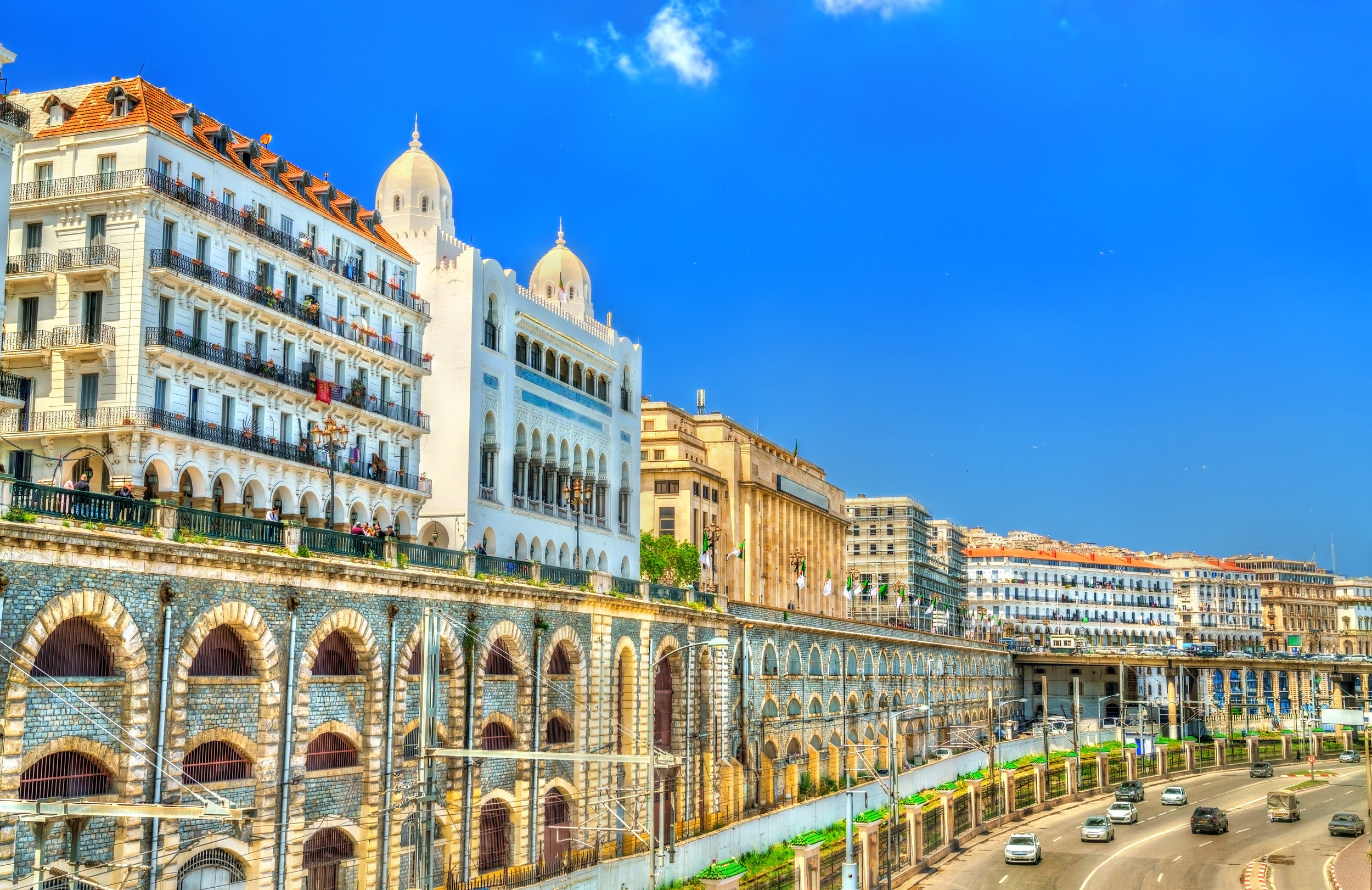
Algeria’s official languages are Arabic and Berber, but French is also commonly understood. While not as widely used as in neighboring Morocco, it will be your best bet if you don’t speak one of the official languages.
You may also like: 15 amazing train rides across the US
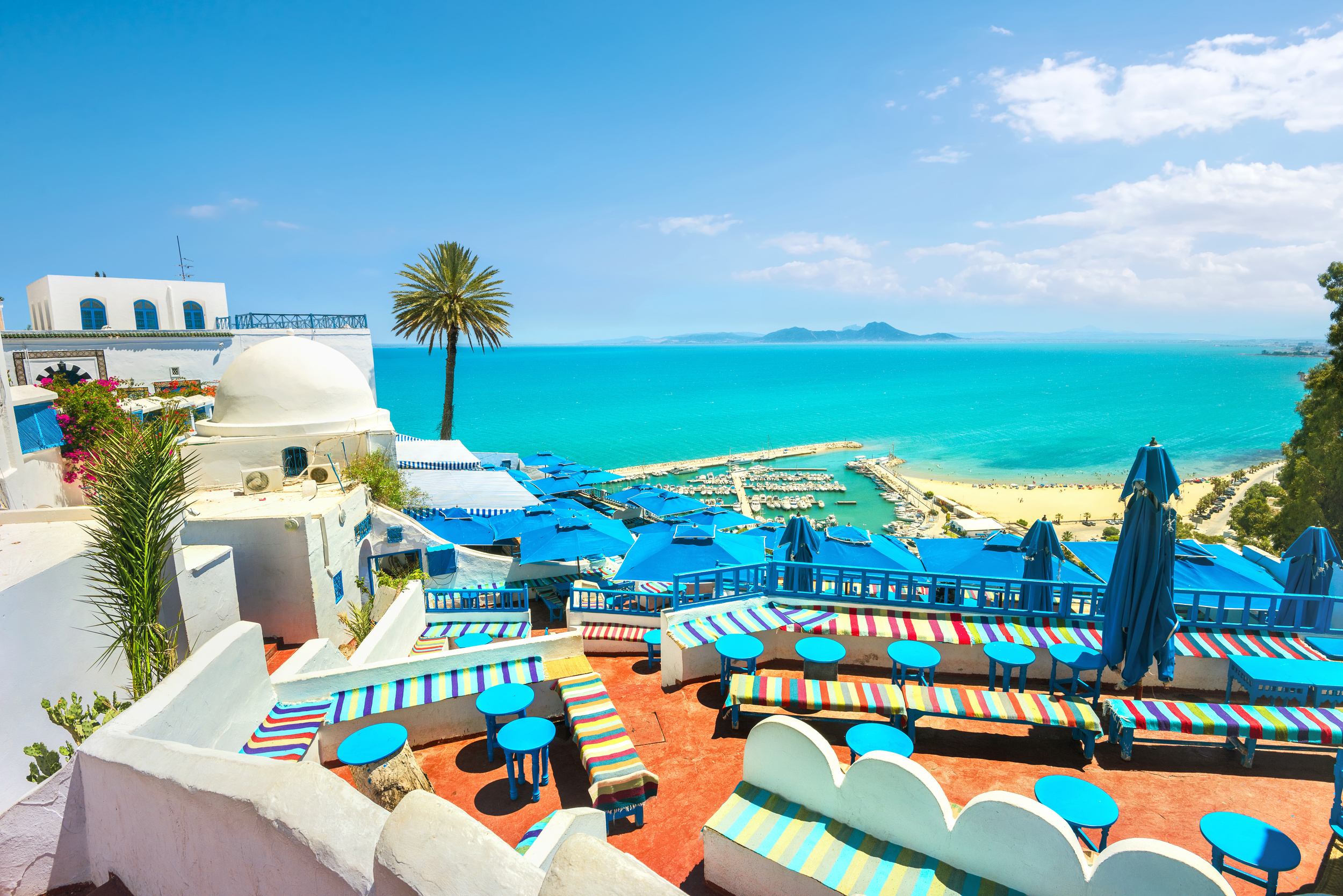
Another former French colonial outpost, the language is used and understood throughout the country in addition to Arabic and Tunisian. It’s estimated over half the population speaks French, and it’s the teaching language of high schools in the country.

Cameroon was a colony of both the UK and France in the early 20th century. So, English and French are spoken in the country. However, French is the most prevalent, with eight of 10 regions considered Francophone. Locals also speak numerous other indigenous languages.
You may also like: 20 drinks mentioned in book titles
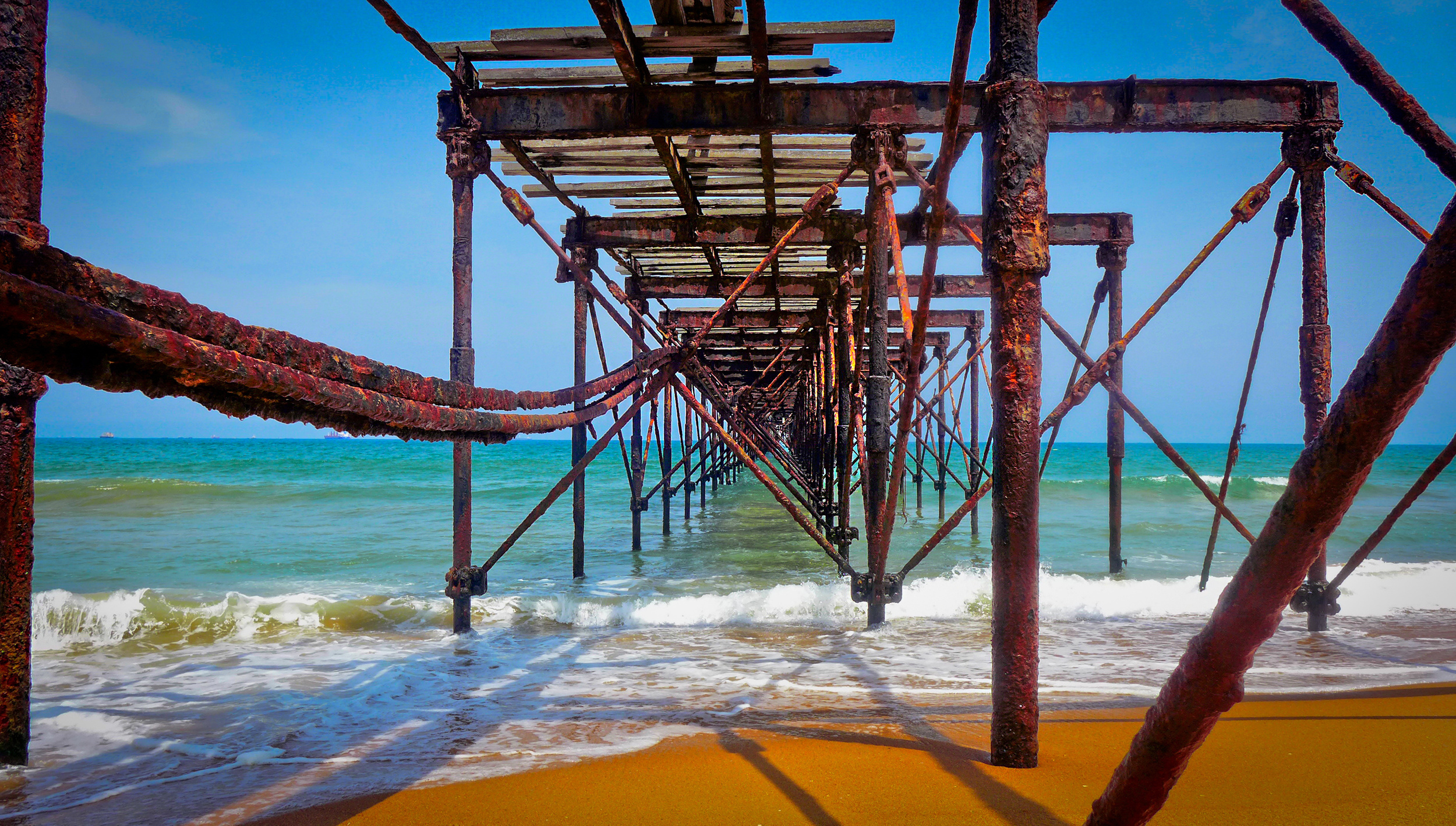
Ivory Coast
Known as “Côte d’Ivoire” in French, this coastal nation uses the old colonial language as the official one. Additionally, numerous indigenous languages also have recognized status in the Ivory Coast.
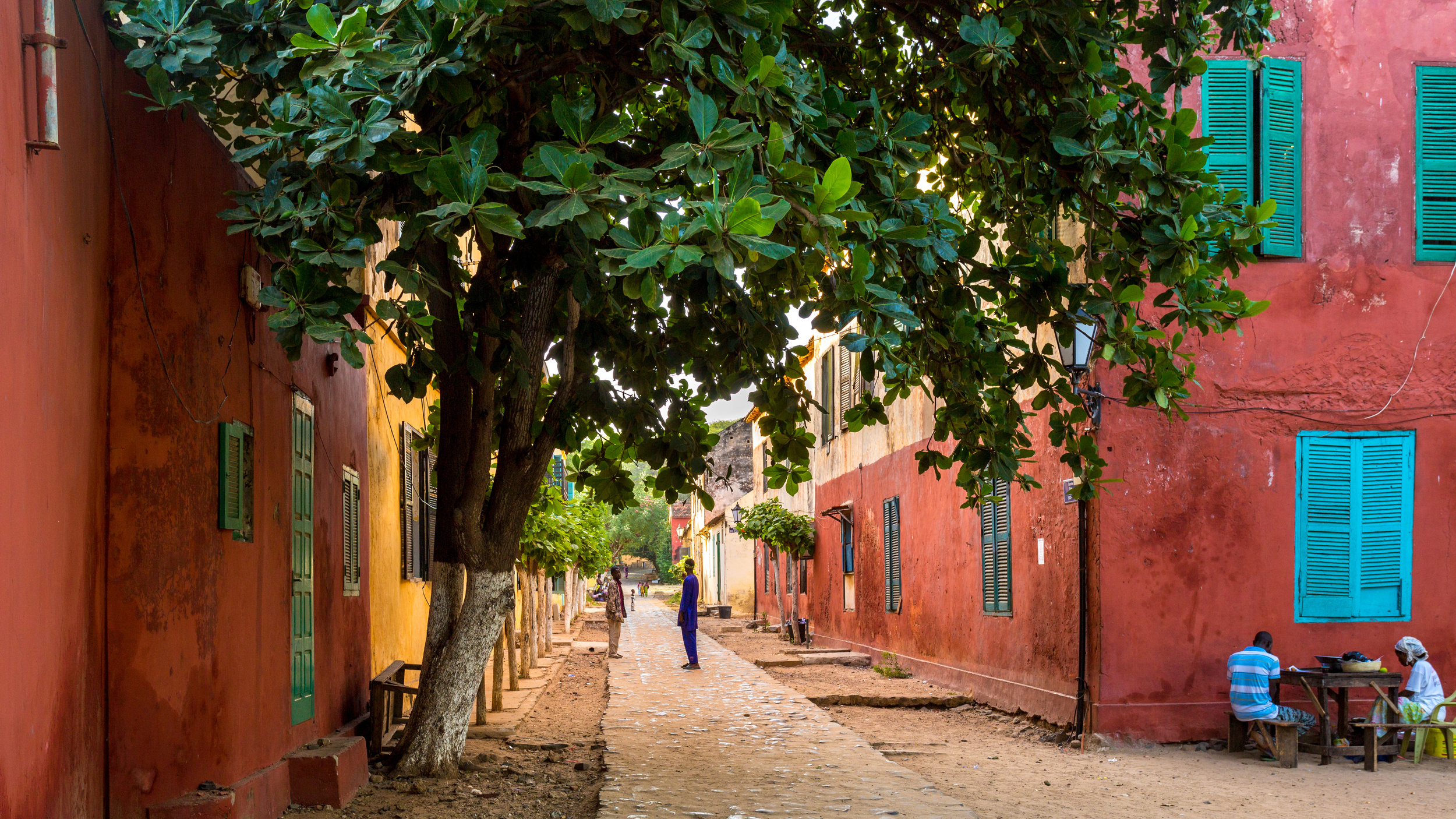
Senegal has six recognized indigenous languages, the most well-known and commonly spoken is Wolof. However, French is still the official language of the country despite Wolof being more widely used and understood.
You may also like: Soup season: 22 slow cooker recipes
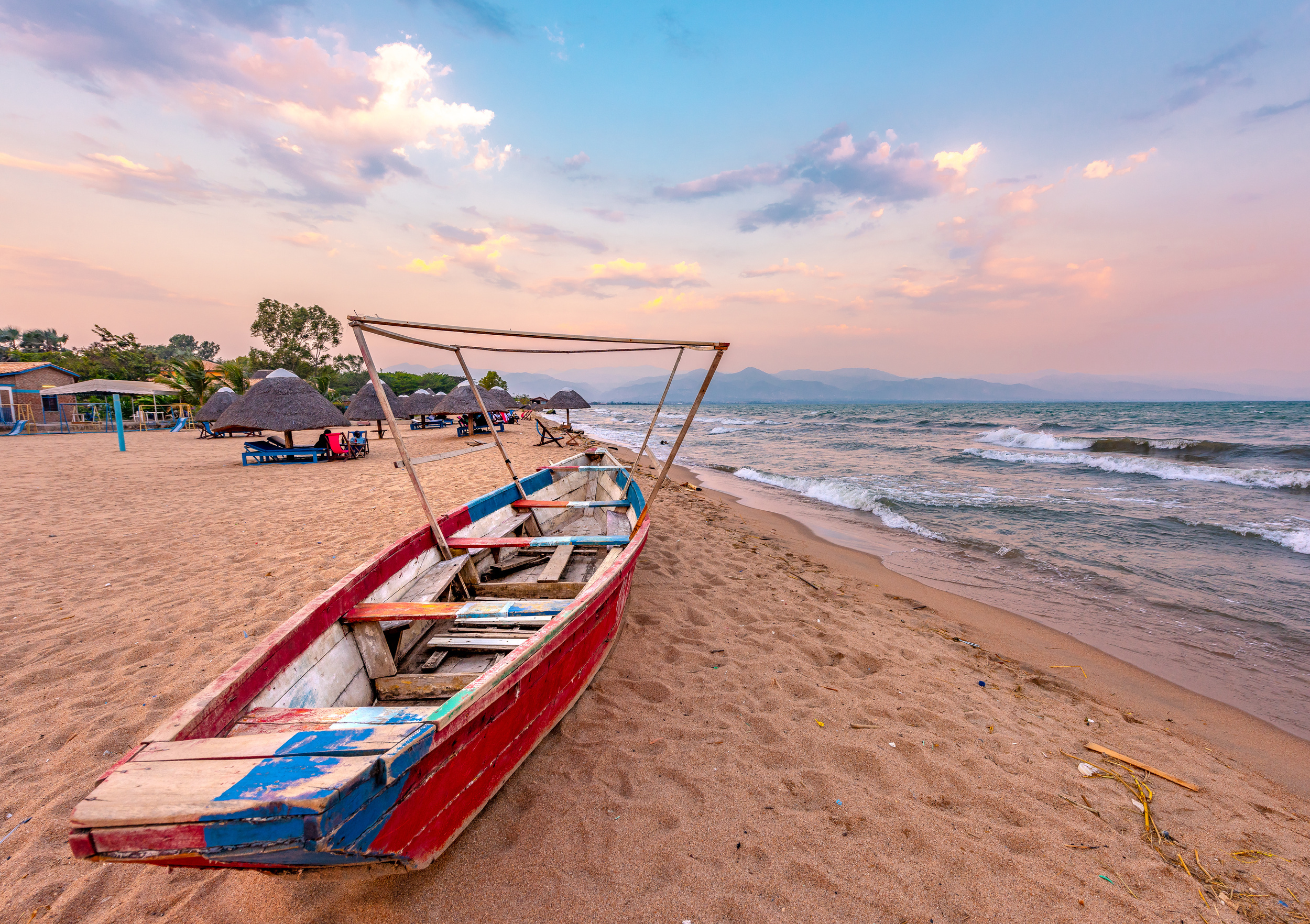
Yet another multilingual former French colony, Burundi has three official languages. In addition to French, Kirundi, and Swahili are recognized by the government. In 2014, English also gained status in the country.
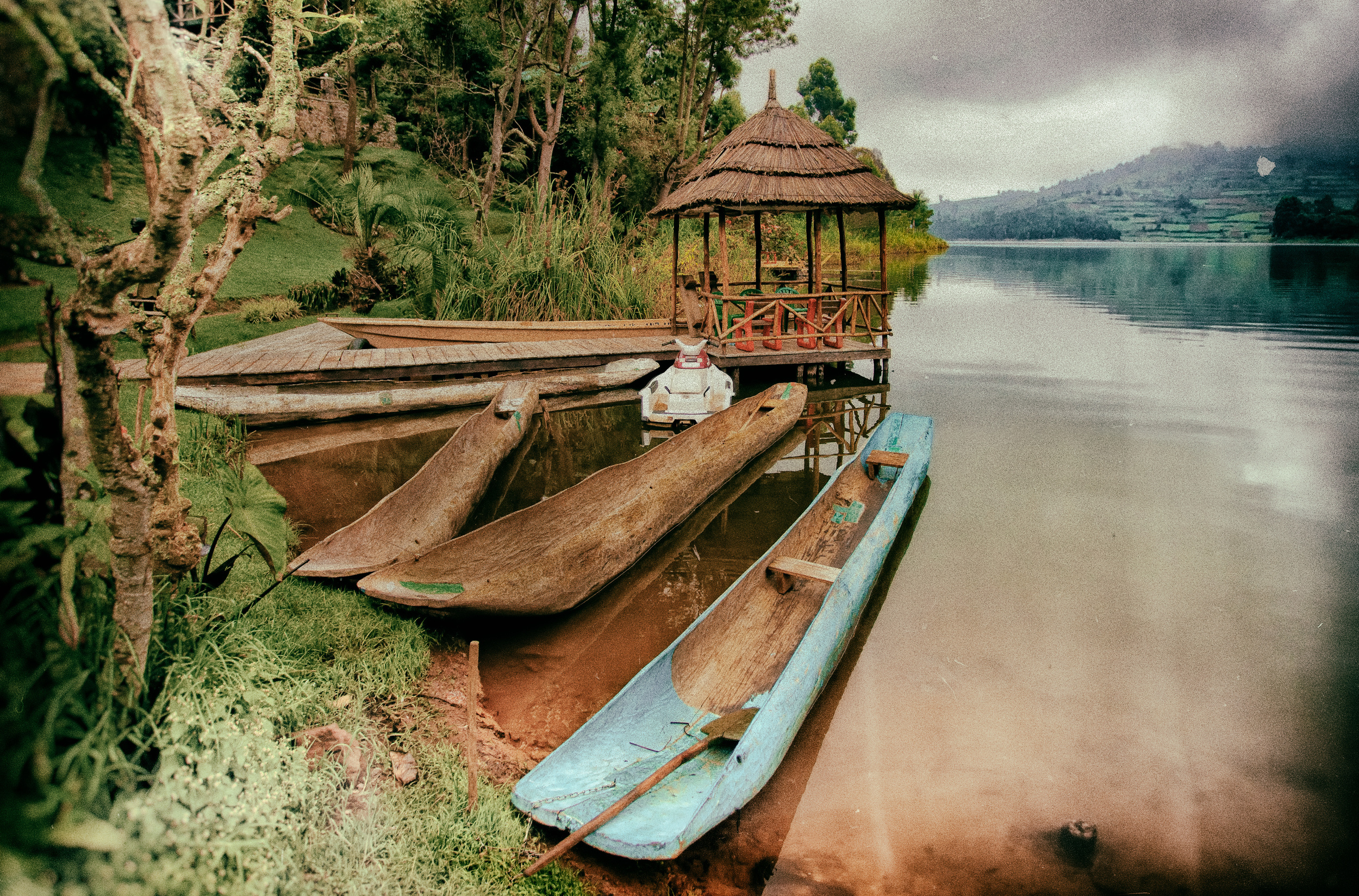
Republic of the Congo
Also known as the Congo or Congo-Brazzaville, it is not to be confused with its neighbor, the Democratic Republic of the Congo. Formerly known as the French Congo, due to colonization, the language is still the official one of use to this day. The local Bantu language, Kituba, Lingala, and numerous other indigenous languages are also widely spoken.
You may also like: 20 DIY projects that will make your life much easier
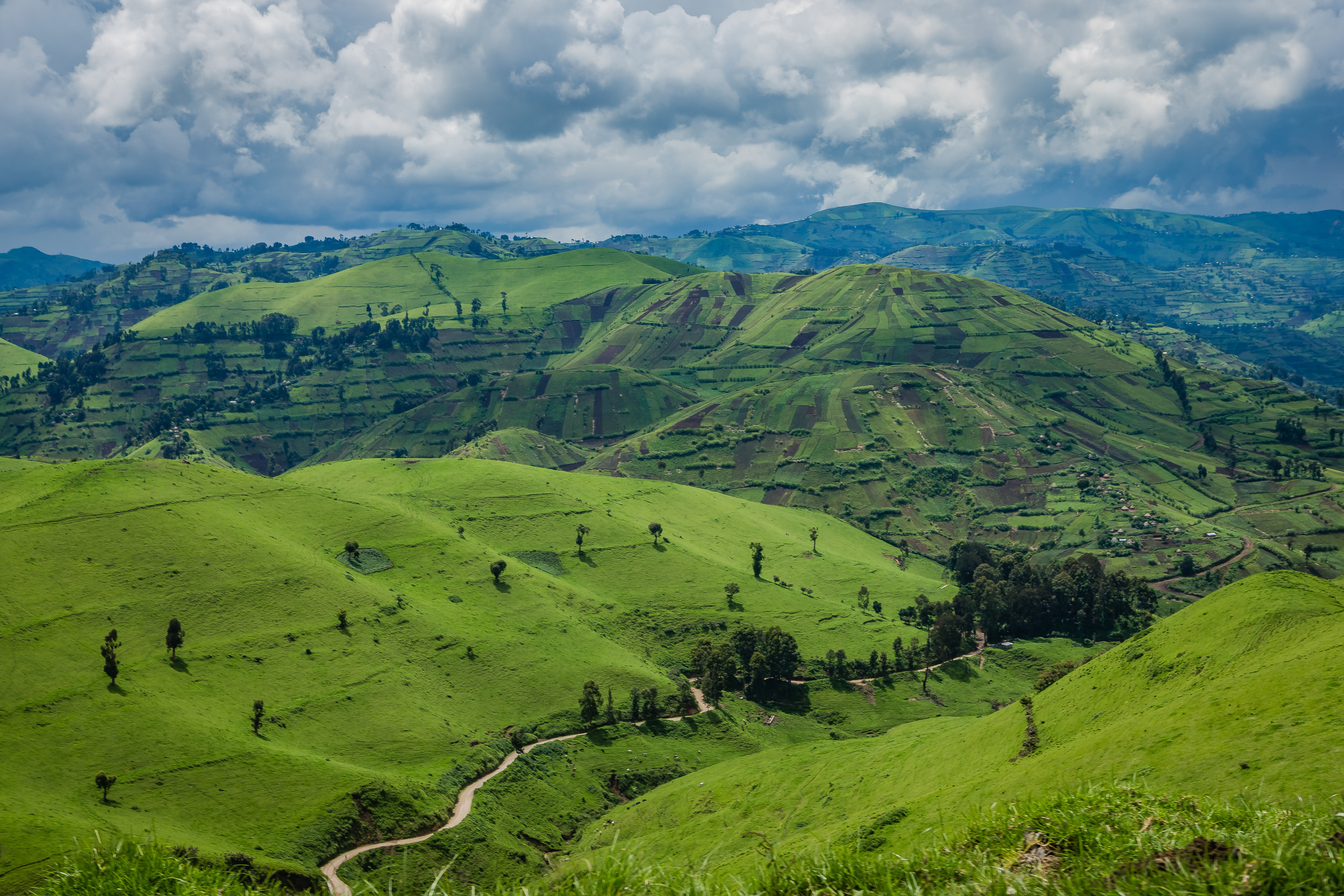
Democratic Republic of the Congo (DRC)
The DRC has four main languages: Kikongo (Kituba), Lingala, Swahili, and Tshiluba. However, as a former Belgian colony, French is still widely used and understood.
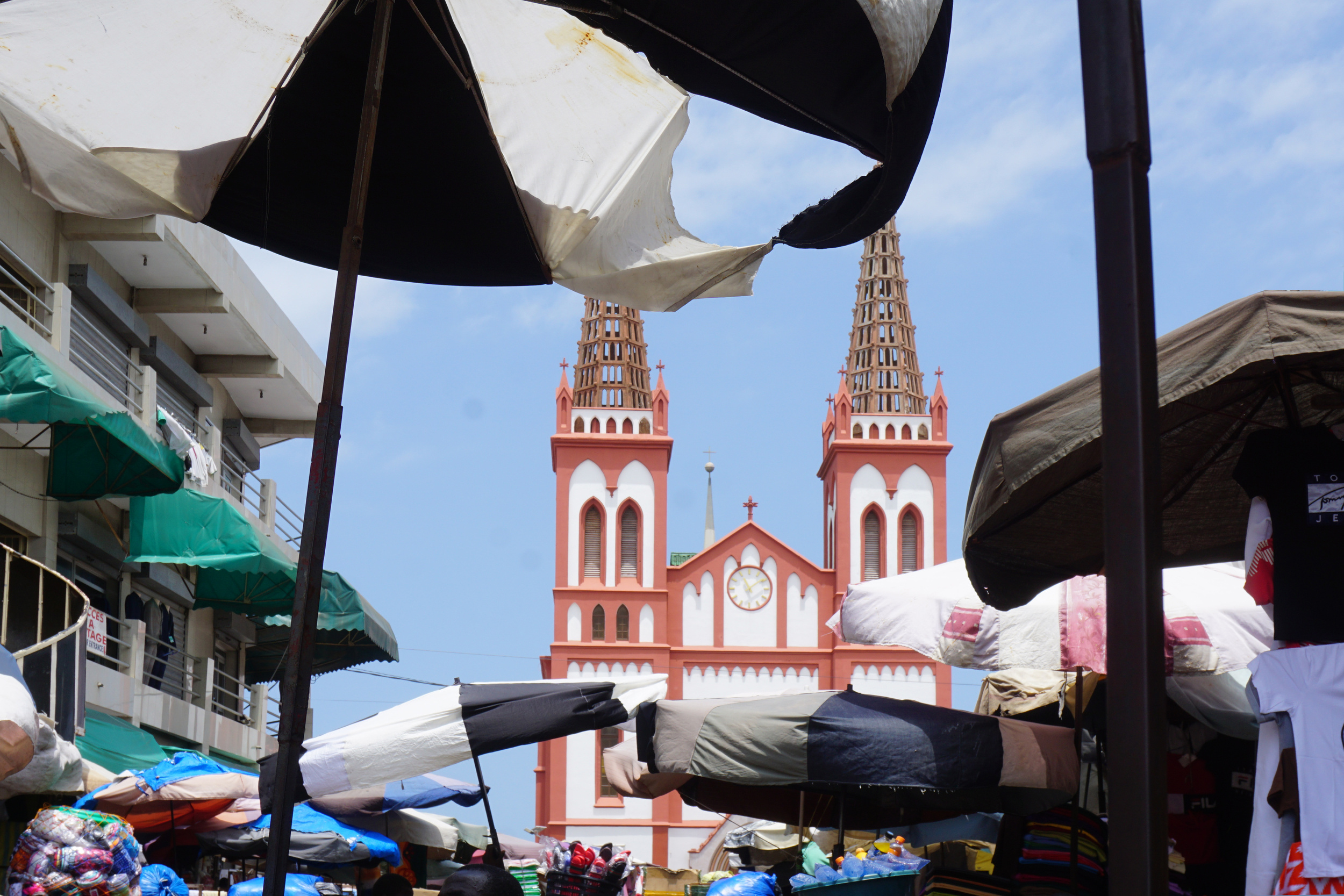
Togo is a very multilingual country, and in addition to the official language, French has over 40 in use throughout the country. Many signs will be in French, and most locals speak some.
You may also like: The 20 best houseplants for beginners

Yet another former French colony, visitors to Mali will find the language very useful in most interactions. Additionally, the country is home to more than 80 other local languages.

The British and French fought over Canada, with the former finally winning out, but the Francophone portion of the population remained influential. So much so that the country has two official languages: English and French, with over 70 indigenous languages in existence. And the province of Québec only has French as the official language (and frequently threatens to secede from Canada). Its neighbor, New Brunswick, is the only officially bilingual province.
You may also like: The 20 weirdest foods ever available in a can
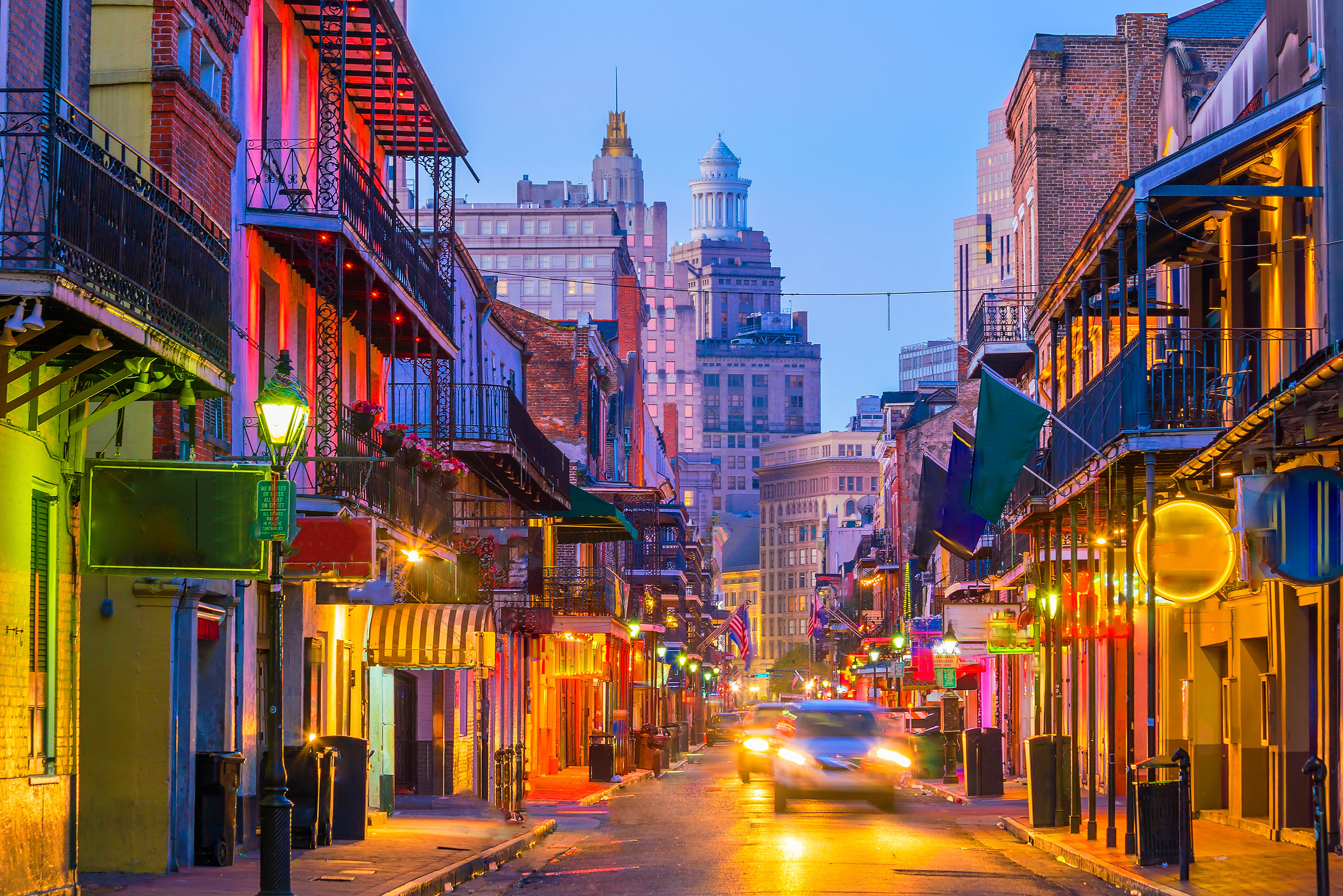
When the U.S. purchased Louisiana territory from the French in 1803, it probably wasn’t considered how long the language would stick around. In the 1960s, efforts were made to revive the language in the state after decades of suppression and Americanization. Now, French is spoken by an estimated 100,000 to 200,000 residents, ranging from traditional and Cajun (Louisiana) French.
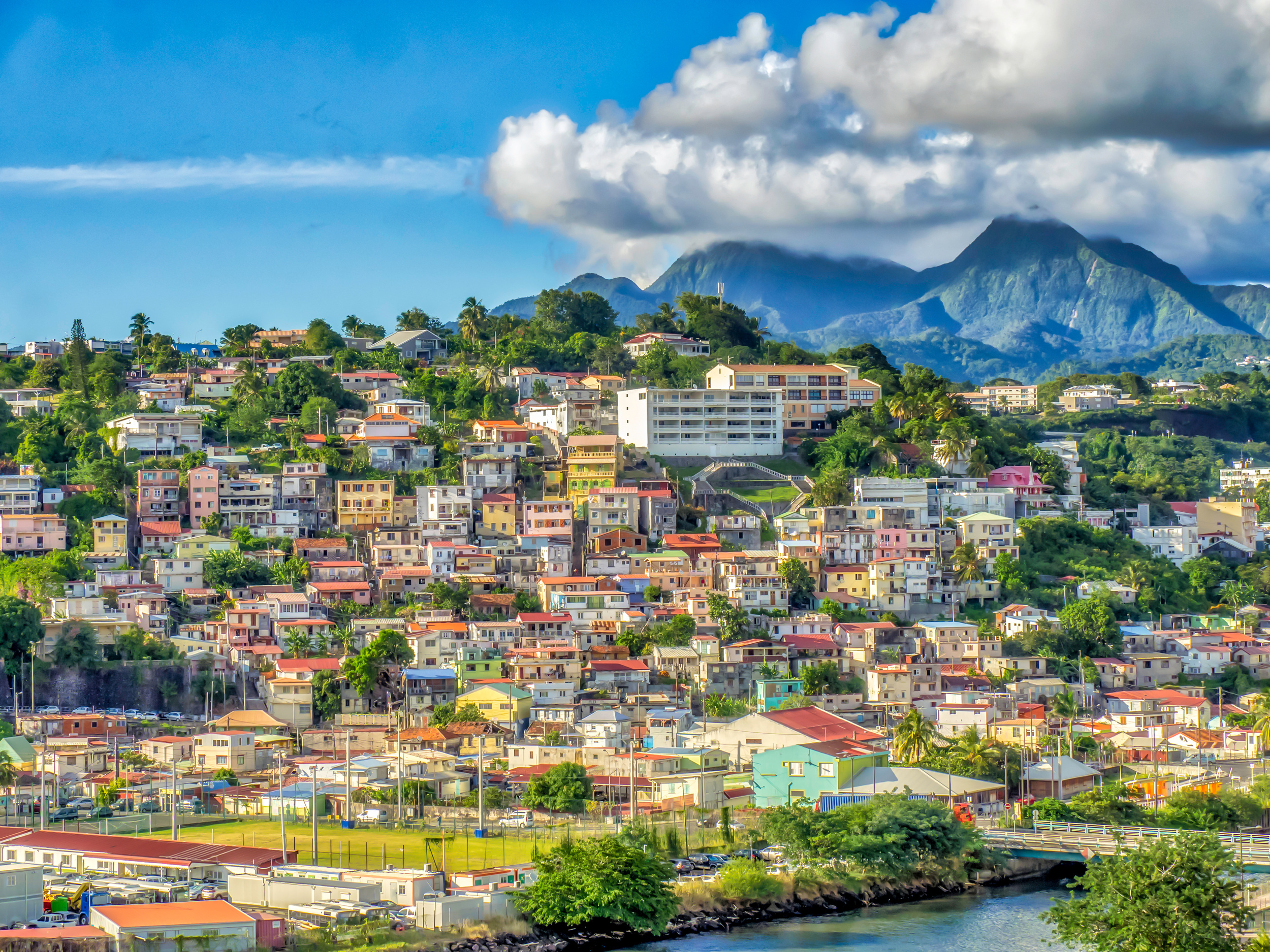
The Spanish colonized this Caribbean island before the Brits and French arrived. Then in 1763, France took over, and in 1943, it became semi-autonomous before gaining its current status as an Overseas Department in 1946. French is the official language, and visitors will find it helpful to know basic phrases, but Martinique Creole is unofficially the local language of communication.
You may also like: 22 meals perfect for following Mediterranean diet
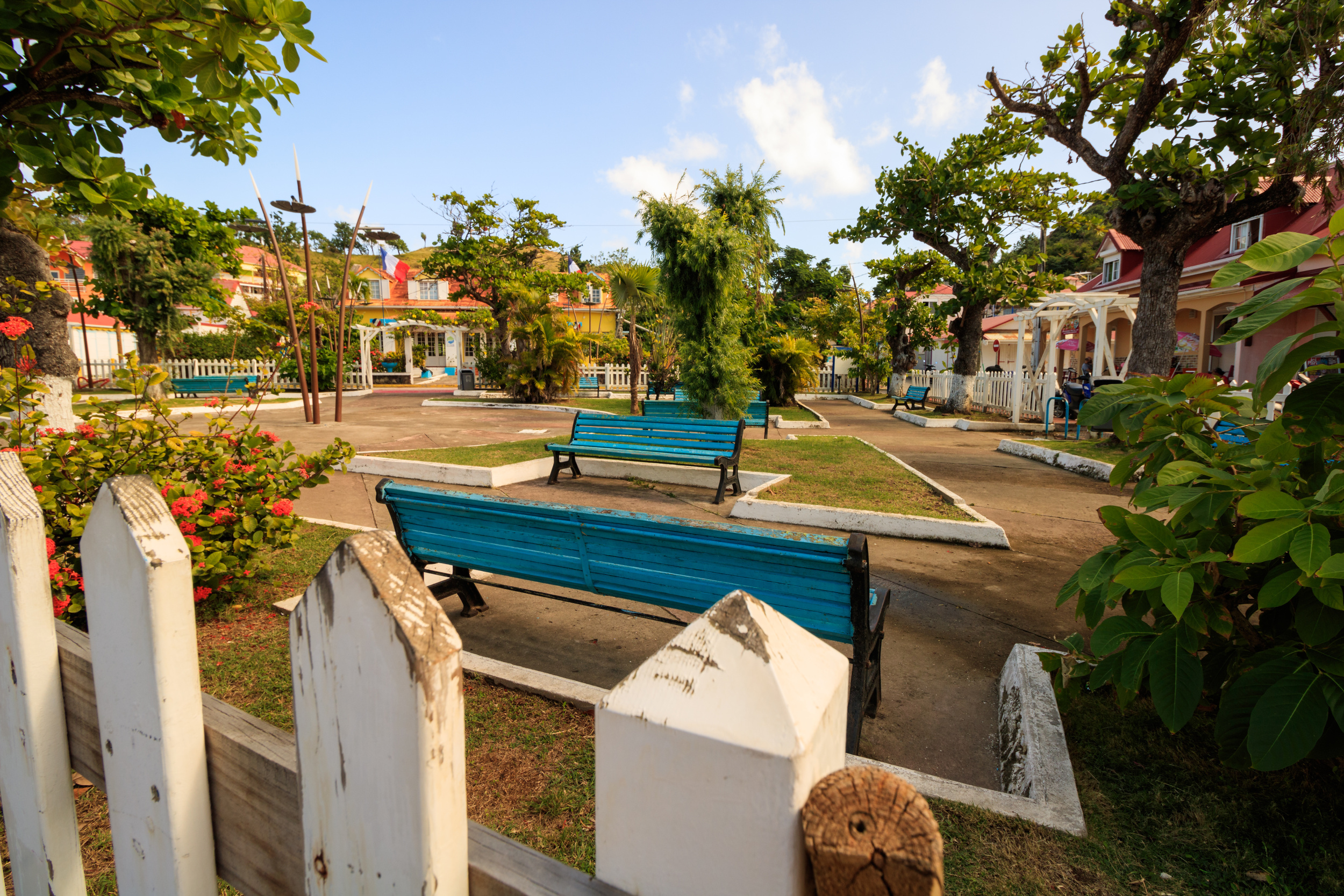
Another current French Overseas Department first colonized by the Spanish, Guadalupe has French as its official language, but like Martinique, Creole is widely used by locals.
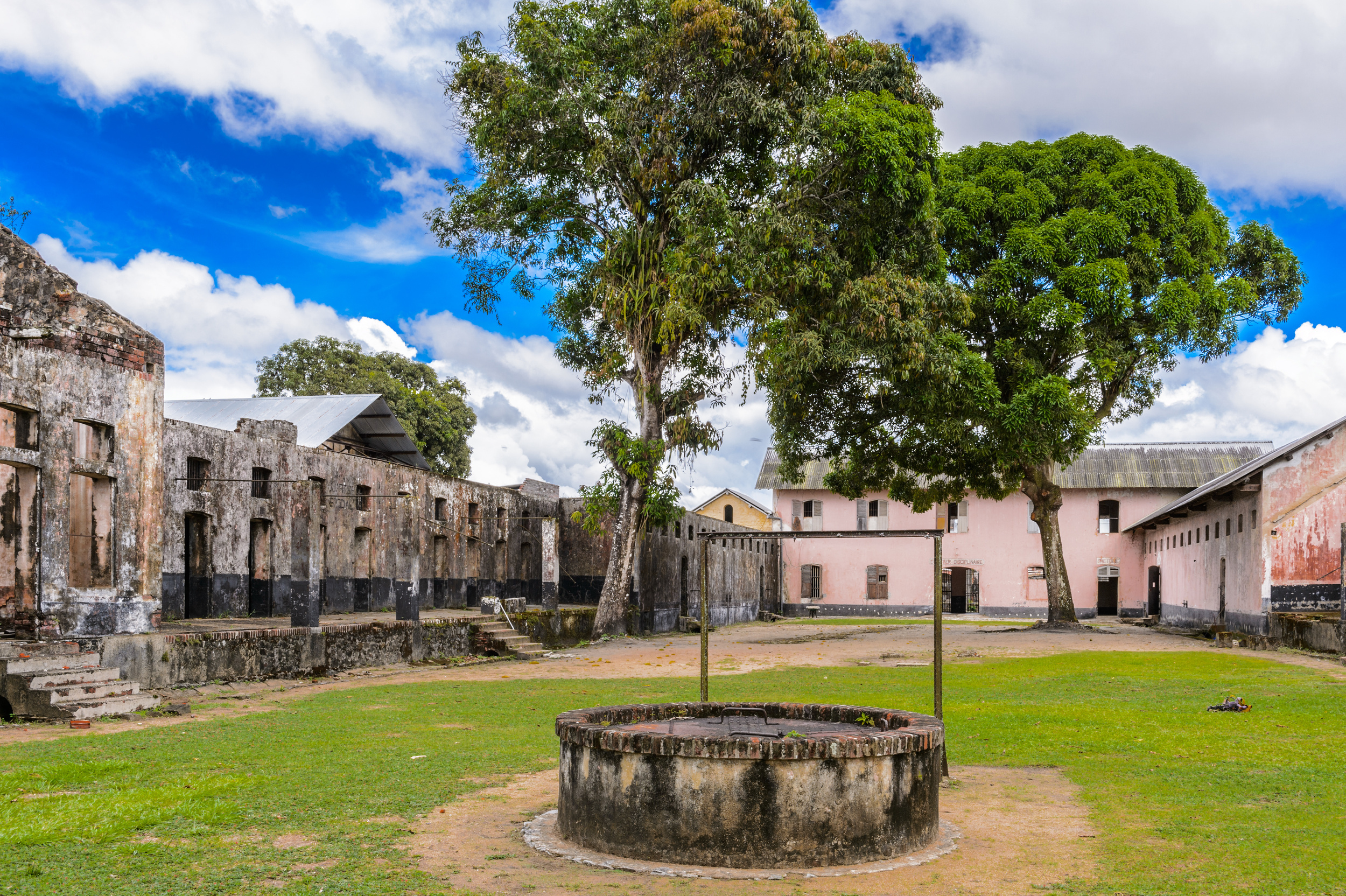
French Guiana
This small section of the South American continent, located between far northeastern Brazil and Suriname and Guyana, is a former colony that housed a penal colony of France. Today, it is a French Overseas Department. Thus, French is the official language, but Creole is the language of use by many residents.
You may also like: 25 summer slow-cooker recipes for every occasion
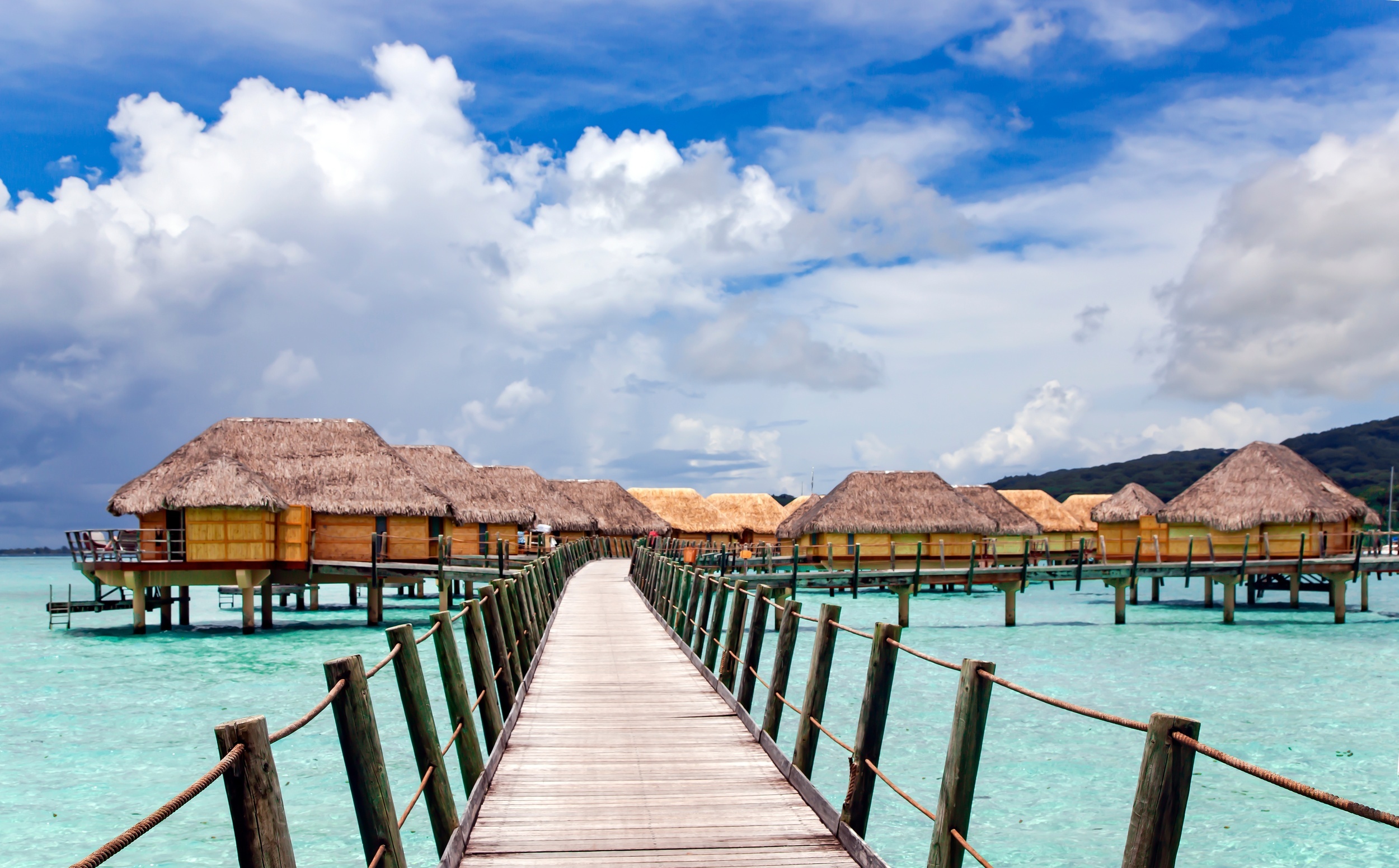
French Polynesia
Colonized by the French, the islands received the name “French Polynesia” after being designated a French Overseas Territory in the '50s. Then, in 1977, the country received autonomy and is now considered an overseas country of the French Republic, with French as the official language.
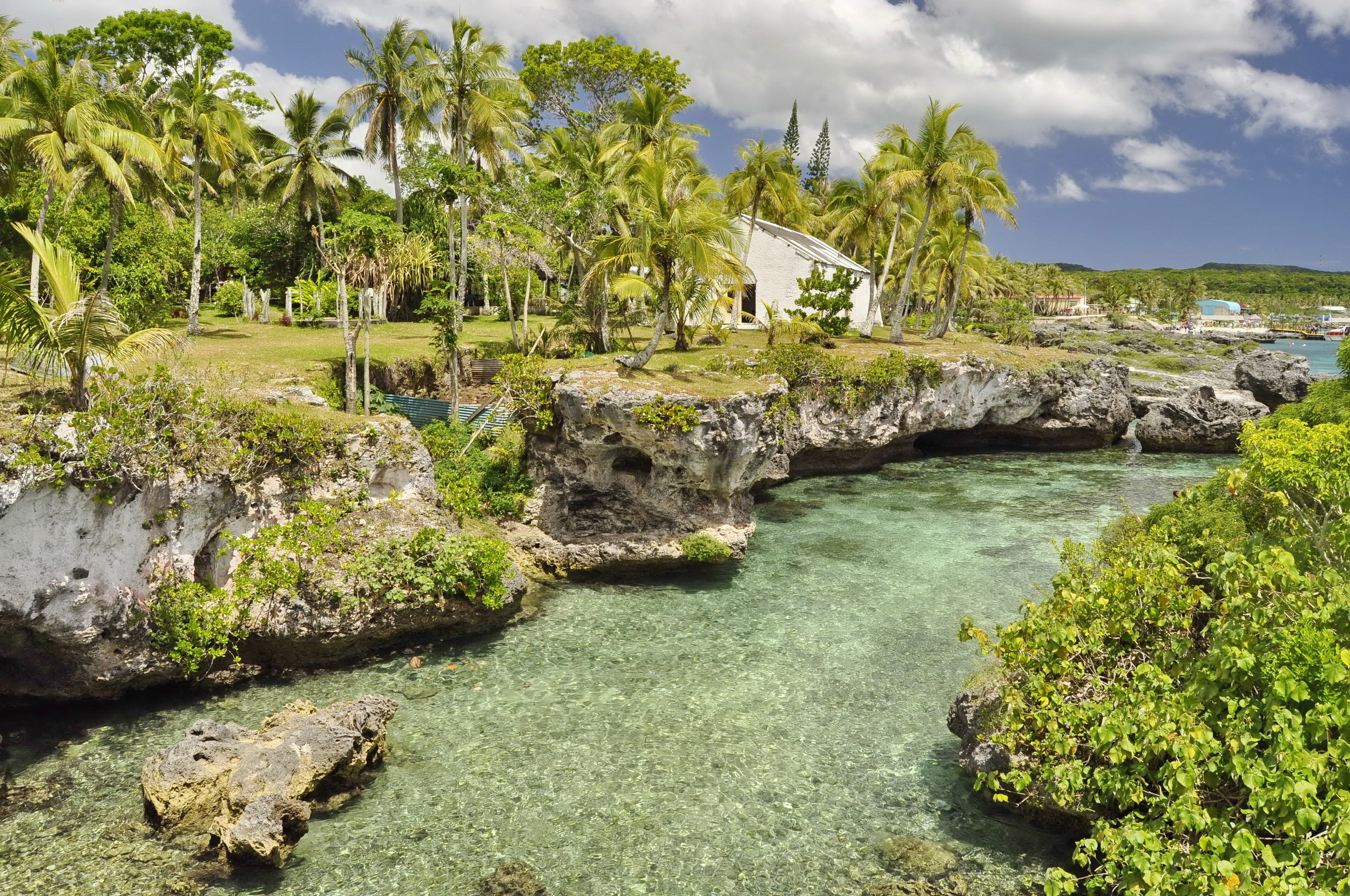
New Caledonia
The British initially colonized these islands in the South Pacific before the French took over in 1853. Recent years have brought referendums for independence, but a slim majority of the population has voted in favor of remaining part of France. French remains the official language of the territory.
You may also like: 21 low-carb slow cooker recipes
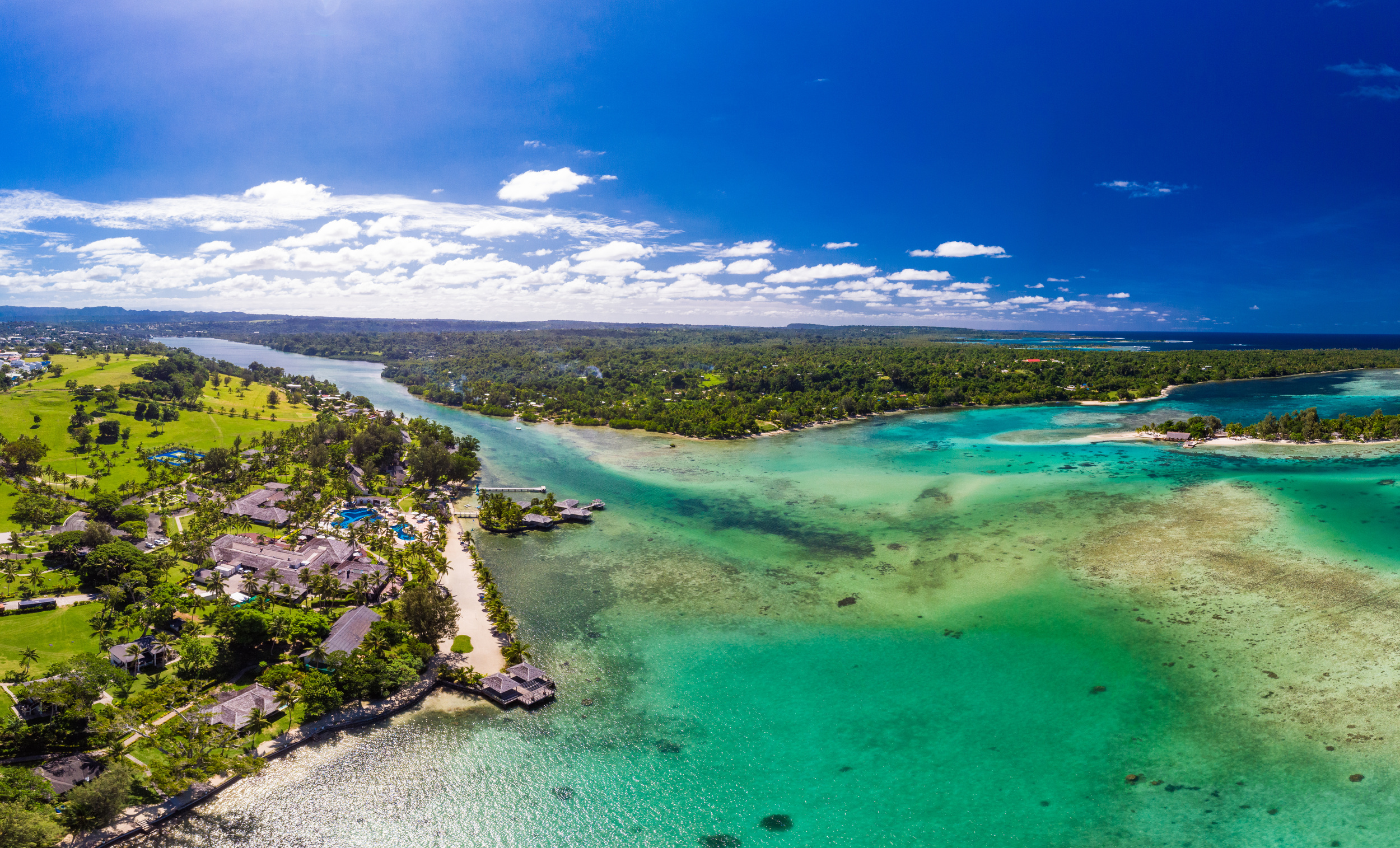
This Pacific country is very multilingual, with French, English, and Bislama all considered official languages. However, it doesn’t stop there, as over 100 languages are spoken on the island. After centuries of colonization, independence was finally declared in 1980.
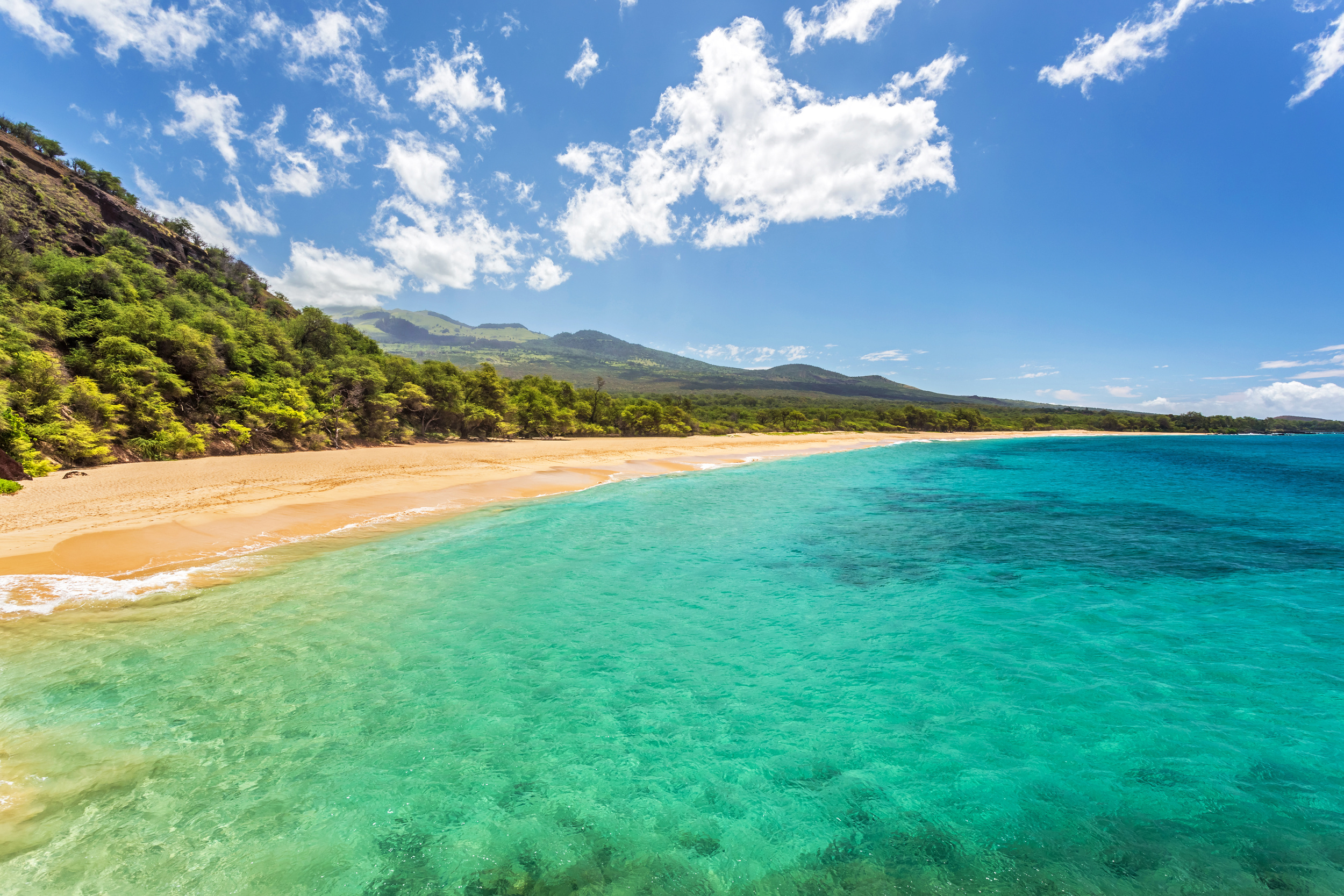
Wallis & Futuna
Made up of the Wallis, Futuna, and Alofi islands, all three were French protectorates and colonies until 1961. Then, the islands became a French Overseas Territory until 2003, when they received status as an Overseas Collectivity. French has been the official language throughout all the status changes.
Did you enjoy this slideshow? Follow us on MSN to see more of our exclusive lifestyle content.
More for You
Former Houston Astros prospect Ronny Garcia dead at 24
Israel hit Iran with a half-ton supersonic 'Rampage' missile, report says
The films everyone should see at least once before they die, according to critics
21 Strange Facts And Questions About 'Star Wars'
Lindsey Graham Crediting Trump for Ukraine Aid Passing Raises Eyebrows
I did 50 frog squats every day for a week — here’s what happened
Mark Jackson talks about the top three trash talkers he played against in the NBA
Most extreme ‘rogue wave’ ever recorded in the Pacific
Best Movies Now on Netflix
Taylor Swift draws backlash for 'all the racists' lyrics on new 'Tortured Poets' album
How To Remove Weeds From The Cracks In Your Driveway To Prevent Their Return
This one single exercise has strengthened my entire body and I’m obsessed
Fallout Proves That Halo Never Learned its Most Important Lesson
Off the Mark by Mark Parisi
Potential Trump VP Pick Dodges Question on Certifying Joe Biden Win
Movie Miscasts: 15 Times the Wrong Actor Was Chosen for a Role
Universal Studios tram accident leaves at least 15 injured
Kyrie Irving Makes NBA History Following Game 1 vs. Clippers
Letters from climber who vanished on Mount Everest in 1924 published online
The Relaxing Scent That Can Help Keep Rats Out Of Your Yard

IMAGES
VIDEO
COMMENTS
ap-leh lah po-lees. Fire! Au Feu! au fur. **There are a few places that use unique words for the numbers 70 ( septante) and 90 ( nonante ), such as Belgium and Switzerland. With the numbers 80 to 89, combine the number 4, the number 20, and the ones. For example, in French 80 is four 20s, 81 is four 20s plus 1, and so forth.
These useful French travel phrases will give any tourist the trip of a lifetime! From asking, "Où est l'hôtel ? (Where is the hotel?)" and much more, this post is full of French for travelers. Bookmark or print this handy list of 108 French phrases, conveniently organized by theme, like directions, dining and beyond.
Discover the key to unlocking a more immersive travel experience in France with our complete guide, featuring over 30 basic French phrases for travel. Whether it's greeting locals, navigating your way through picturesque streets, ordering culinary delights, or shopping for unique souvenirs. Perfect for first-time visitors or seasoned travelers ...
Common French Sayings and French Slang. Hello: Salut (informal) I love Paris: J'adore Paris. Have a nice trip: Bon voyage. Forget it or drop it: Laisse tomber. Come on or let's go: Allez. That's ...
Learn these basic French phrases before you travel, and you'll be all set. Unconventional language hacking tips from Benny the Irish polyglot; travelling the world to learn languages to fluency and beyond! ... Language: French. Reading time: 17 minutes Published: Jan 11, 2021 Updated: Sep 17, 2021 SHARE ...
Greetings and general phrases. There is quite a lot of different French greetings but the most basic is the Bonjour. If there is only one word to remember on your trip, this is the one. French phrases. English translation. Bonjour. Good day, Hello. Salut. Hi, hello, goodbye.
In France, politeness is not just a gesture—it's a way of life. By understanding and using basic French phrases for travel, such as "S'il vous plaît" and "Merci," you can navigate social interactions with grace. Embrace the cultural nuances of courtesy that enrich every conversation. French Phrase. English Translation. Merci.
Learn French for travel. It is an excellent idea to learn the French language before traveling because it is widely spoken, especially in France and other French-speaking nations in Europe, Africa, and Canada. A few basic French phrases will enable you to interact with locals, find your way around foreign locales, and make the most of your trip.. Here are the best French phrases to know for ...
Essential French travel phrases are Bonjour (hello), au revoir (goodbye), C'est combien (How much is it?) and l'addition s'il vous plaît (the check, please). ... David Issokson is a lifelong language enthusiast. His head is swimming with words and sounds as he speaks over six languages. Of all the languages he speaks, he's the most passionate ...
Bonjour - Hello. The phrase bonjour is the most common and widely used greeting in French. It sets a positive tone for your conversation. You can use this greeting all day. Bonsoir - Good evening. Bonne soirée - Have a good evening. Bonsoir is used in the evenings, from around 6 pm onward as a greeting.
The process of learning French is made easier when you have the right learning tools in your tool kit. The more learning resources you use, the faster you will progress. Remember to focus on all four language skills: reading, writing, listening and speaking. If you want to master the French language, all of these skills are essential.
French language· travel. 4 Jan. Share 744. Tweet. Pin 12K. 13K Shares. When traveling to a country where your native tongue isn't spoken, the language barrier can be a major hurdle. Two of the most frustrating things are expressing yourself as well as not understanding what is being said to you. A relaxing, stress-free trip can get very ...
Once it is safe to travel again, are you planning on visiting France? France is the most-visited country in the world, with nearly 90 million people visiting annually (in a normal year that is!). French is estimated to be spoken fluently by approximately 235 million people.That means that the French you learn for your trip will likely be useful again in the future as well!
These basic words and phrases are the first level of interactions while traveling, and probably the words you will use the most in everyday conversations. So pay special attention to them! English. French. Pronunciation. Hello / good morning. Bonjour. Play.
Travelers to France and other countries where French is spoken will want to learn a few basic words in the local language. It will help you on your trip (le voyage) as you make your way around and speak to people. In this French vocabulary lesson, you will learn how to ask for directions, navigate your transportation options and rent a car ...
Days 4-6: Practice Ordering A Meal! Ratatouille, bœuf bourguignon, crêpes, quiche … the list goes on! France is a veritable wonderland of food and flavor, and you'll most likely be spending a fair amount of time in restaurants and cafés. That being said, you should plan to brush up on some useful words and phrases for ordering a meal.
Learn 150+ Basic French Travel Phrases To Master For Your Next Trip To France. Elijah Logan. April 11, 2023. French Vocabulary / Popular Reviews. If you want to explore France thoroughly, especially the city of love, you must know the basic French travel phrases. Although English is a universal language, it is not well-known in most French ...
Paul: You can check in also at the airport. Marie: Ok, so I have a flight for Paris and carry-on luggage. Paul: The luggage can have 20kg maximum and you need to be at gate 15 minutes before the flight. Marie: Thank you very much. Paul: Thank you and have a nice trip.
Traveling to France or a French-speaking country? Learn these Top 10 French phrases for travellers so you can greet people, order food and travel with confid...
Bonjour: Good morning/ Hello. Do not forget to say bonjour as you enter a shop or start a conversation with someone! Salut: Hello (casual way of saying hello) Bonsoir: Good evening. Monsieur/ Madame/ mademoiselle: Mister/ Madam/ Miss. S'il vous plaît: Please. Merci/ Merci beaucoup: Thank you/ Thank you very much.
This is your ultimate compilation to learn how to travel in France! And if you want to study more, click here https://goo.gl/MexUPk and get the best resour...
Read road signs and menus, ask for directions, ask for help if you're lost or have a problem, or even strike up a simple conversation with a French person. (By the way, they love it if you make the effort to learn their language. You'd feel the same way.) Real French for Travelers: The complete online course. Or the basics.
Subscribe to the free Lawless French Travel ecourse for 6 weeks of essential travel phrases and other info to help you make the most of your trip. Email *. If you'd rather work independently in order to cover the basics more quickly, take a look at my travel French index.
Speaking another language is always helpful, especially if you love to travel. And French, commonly thought of as one of the most beautiful in the world, is also more useful than you might realize.